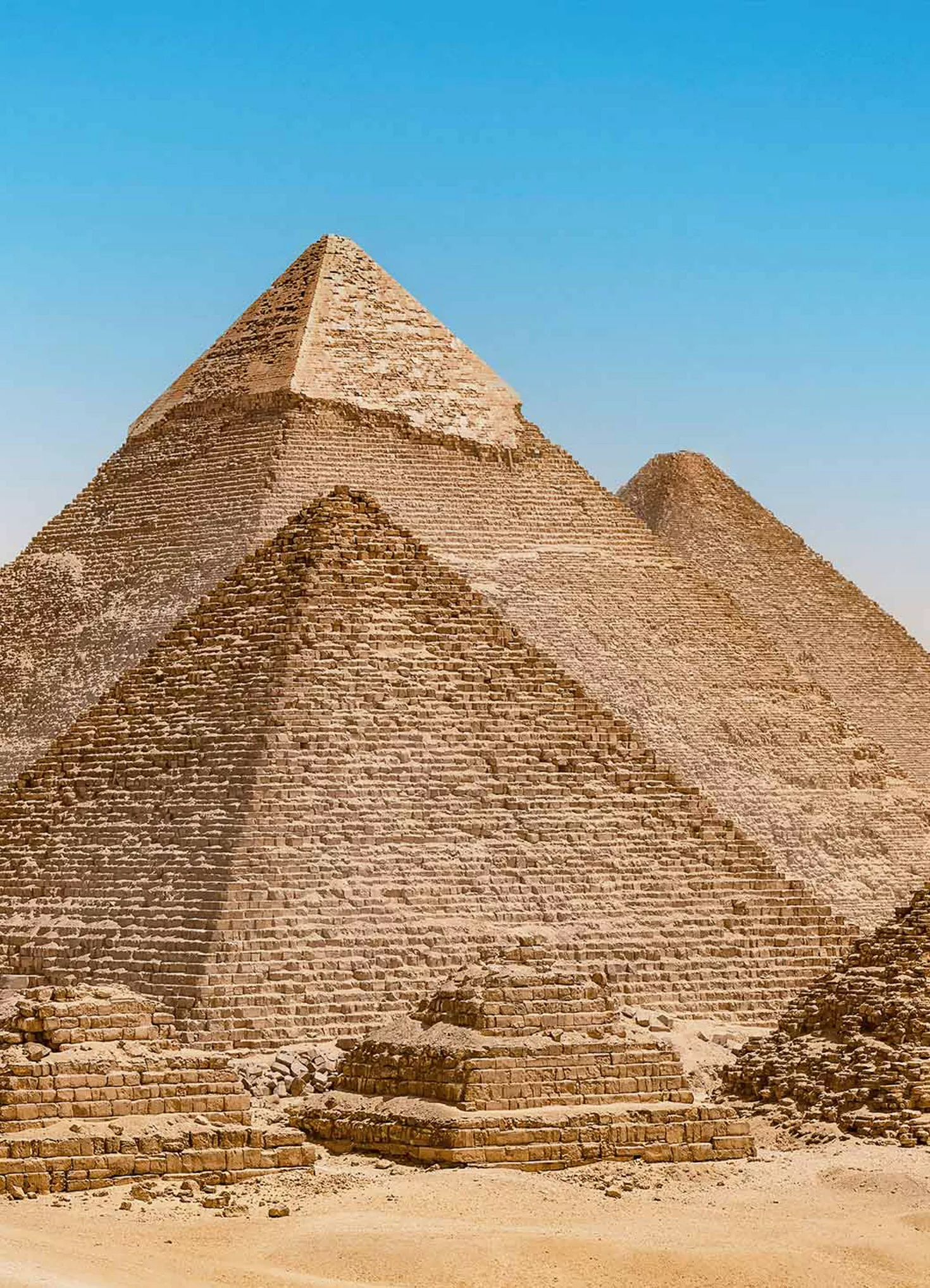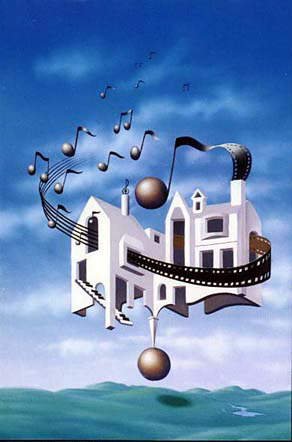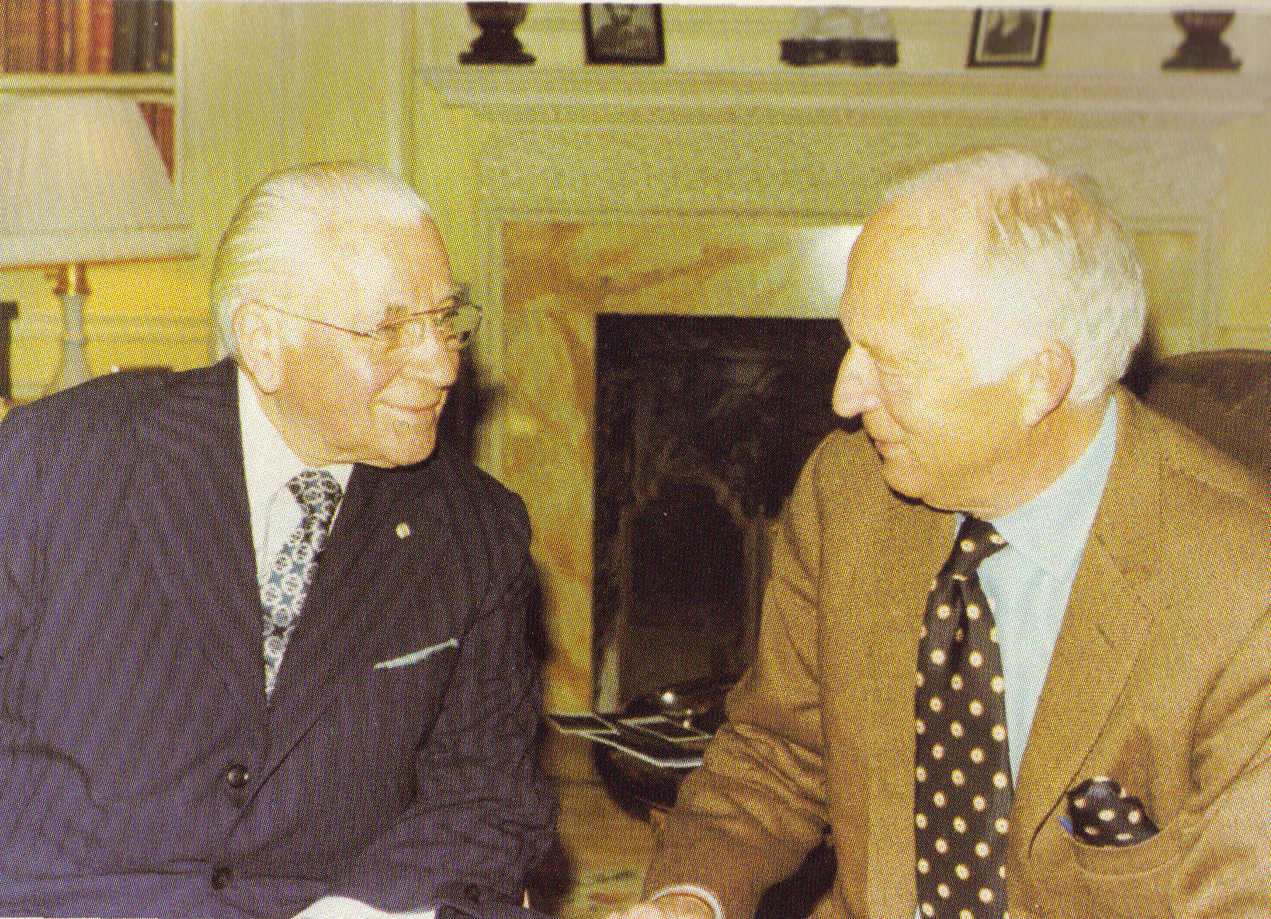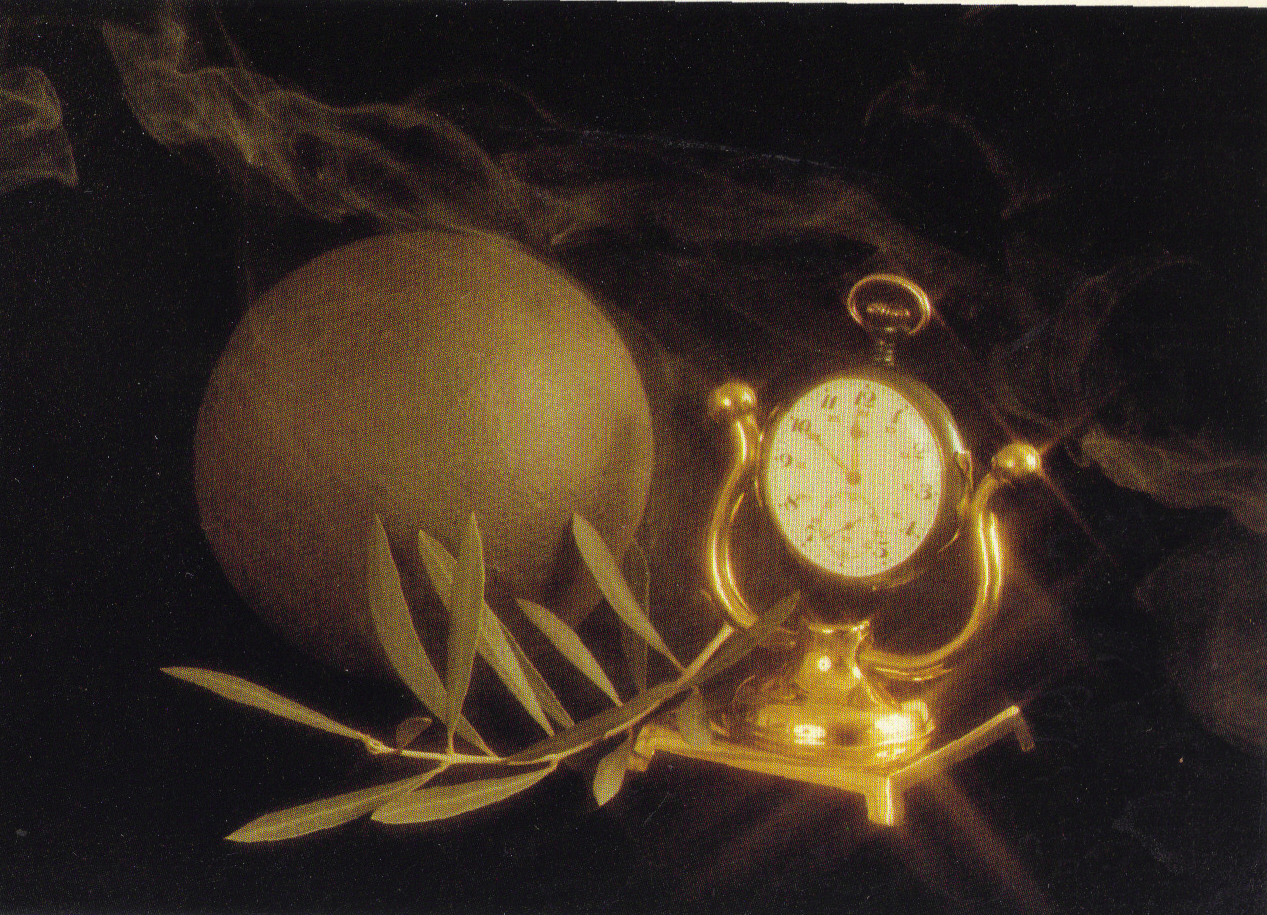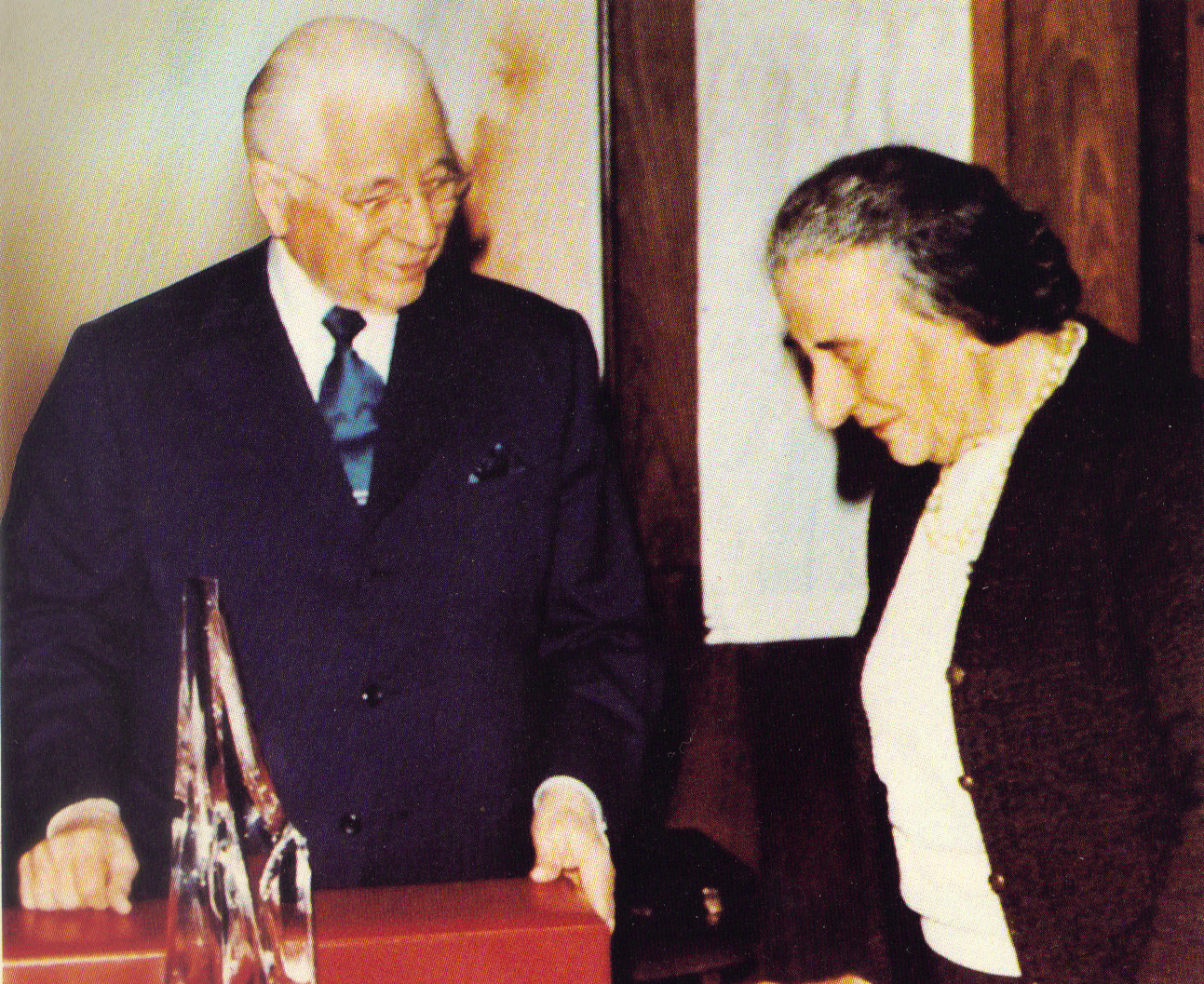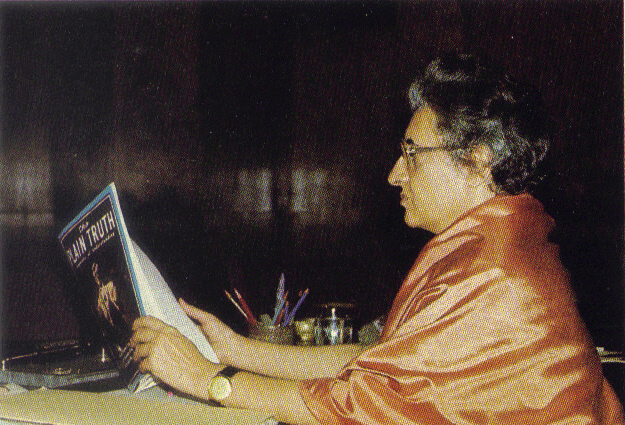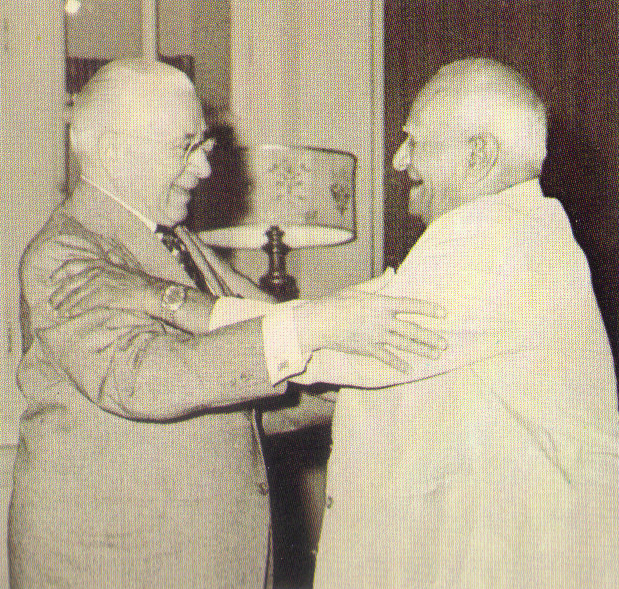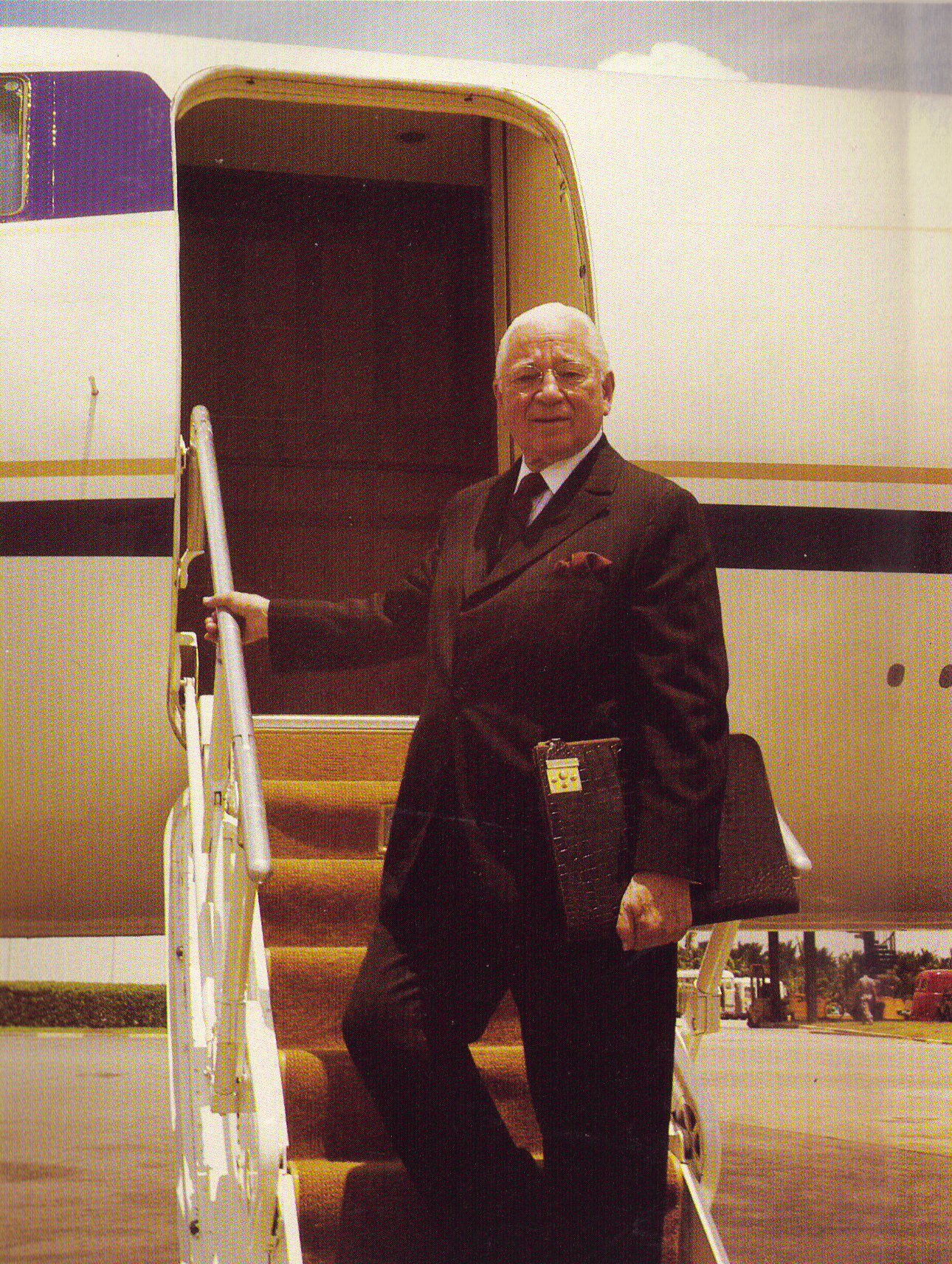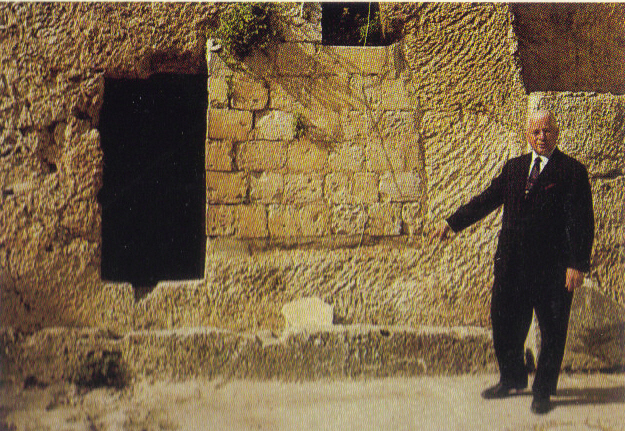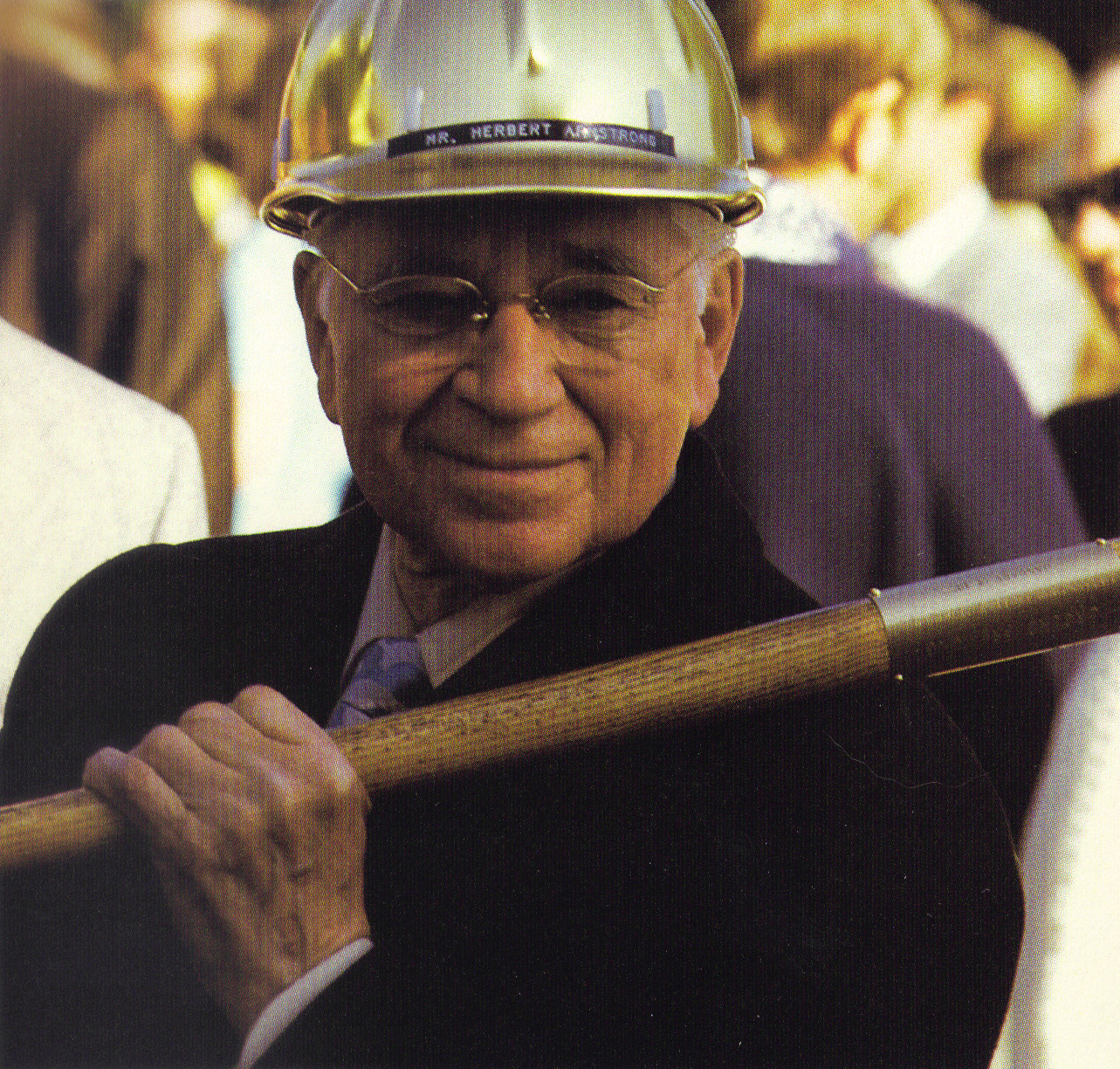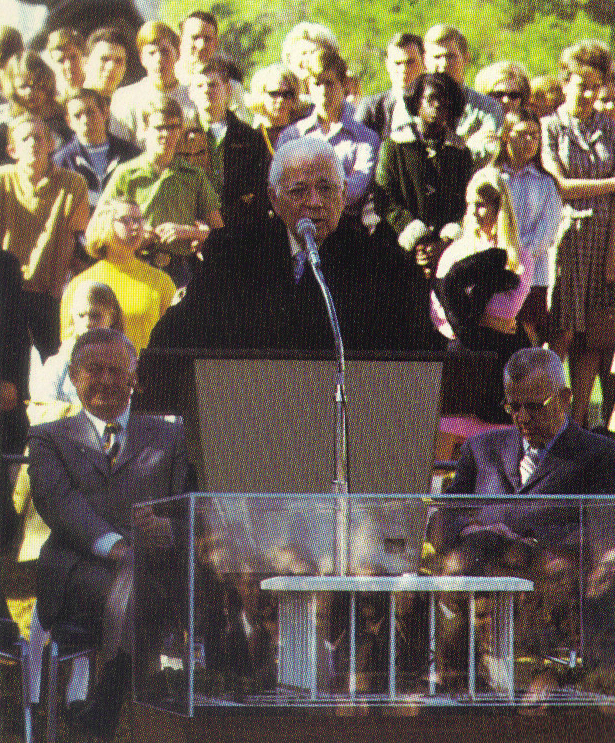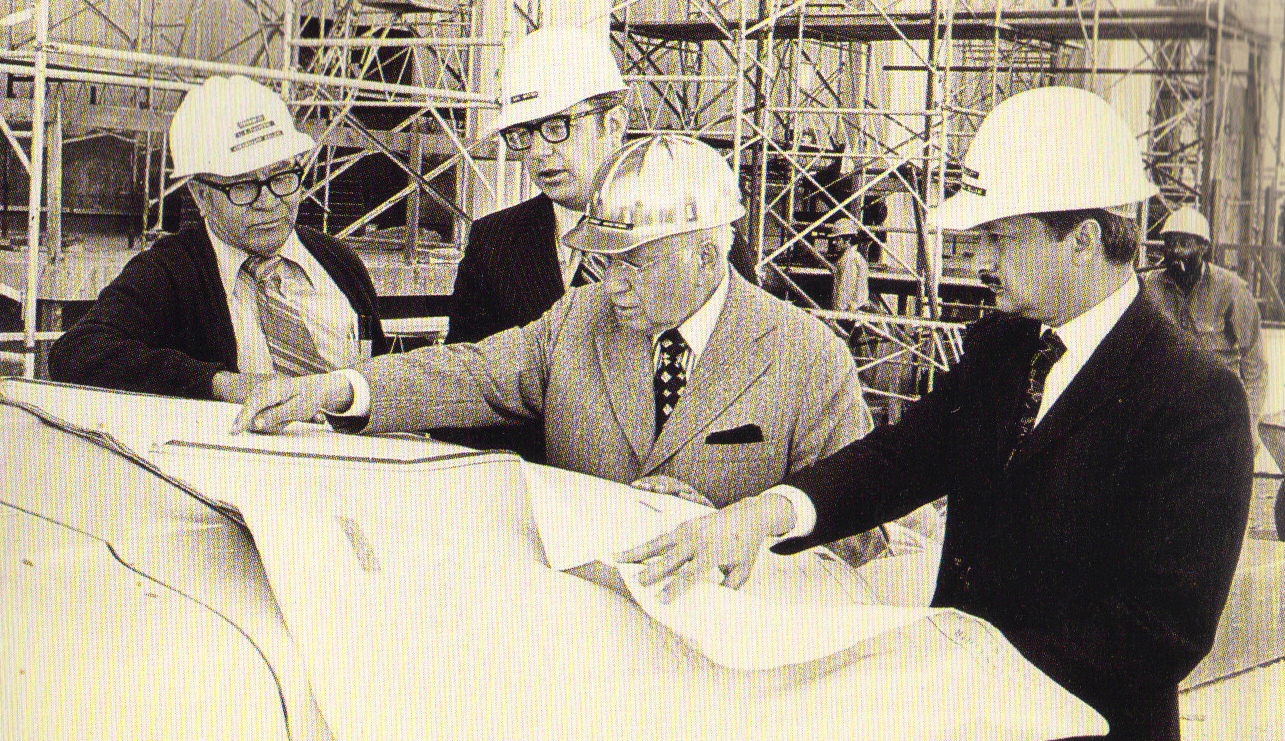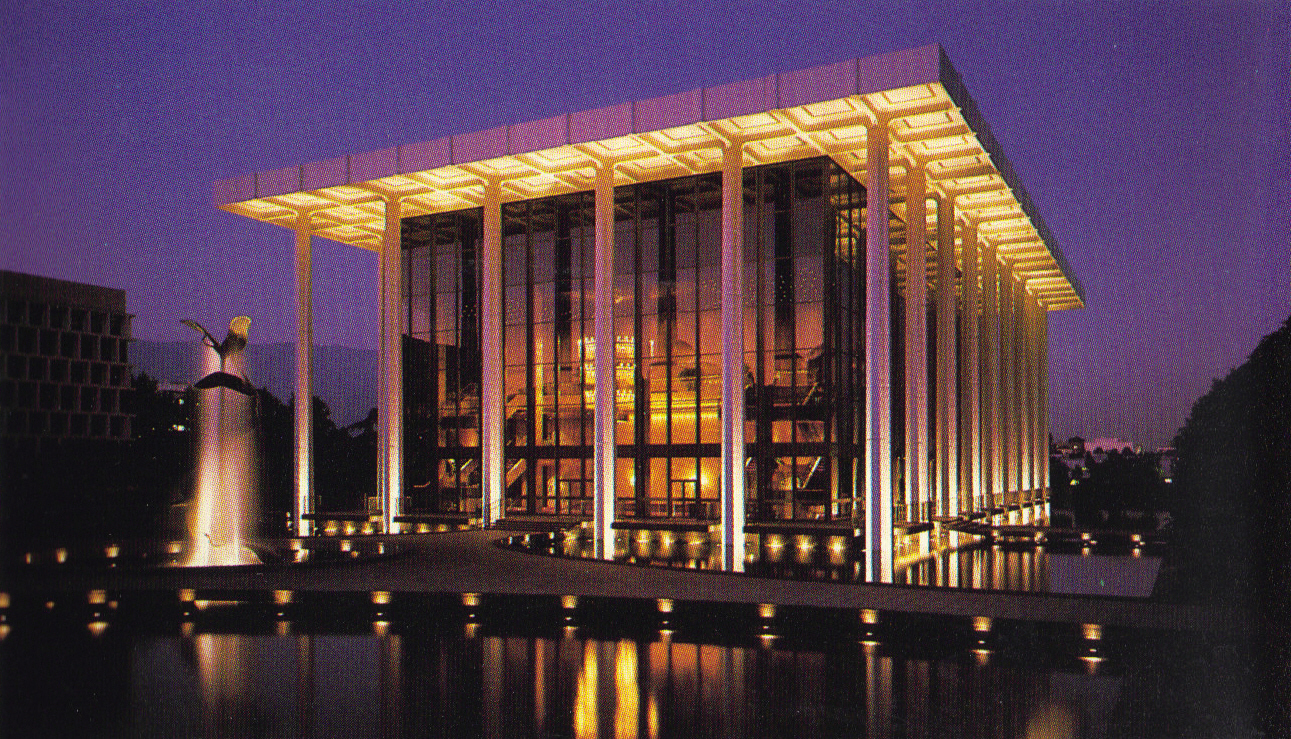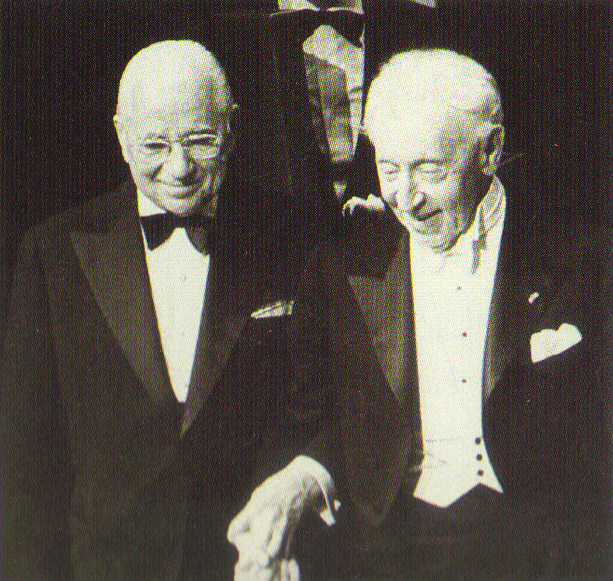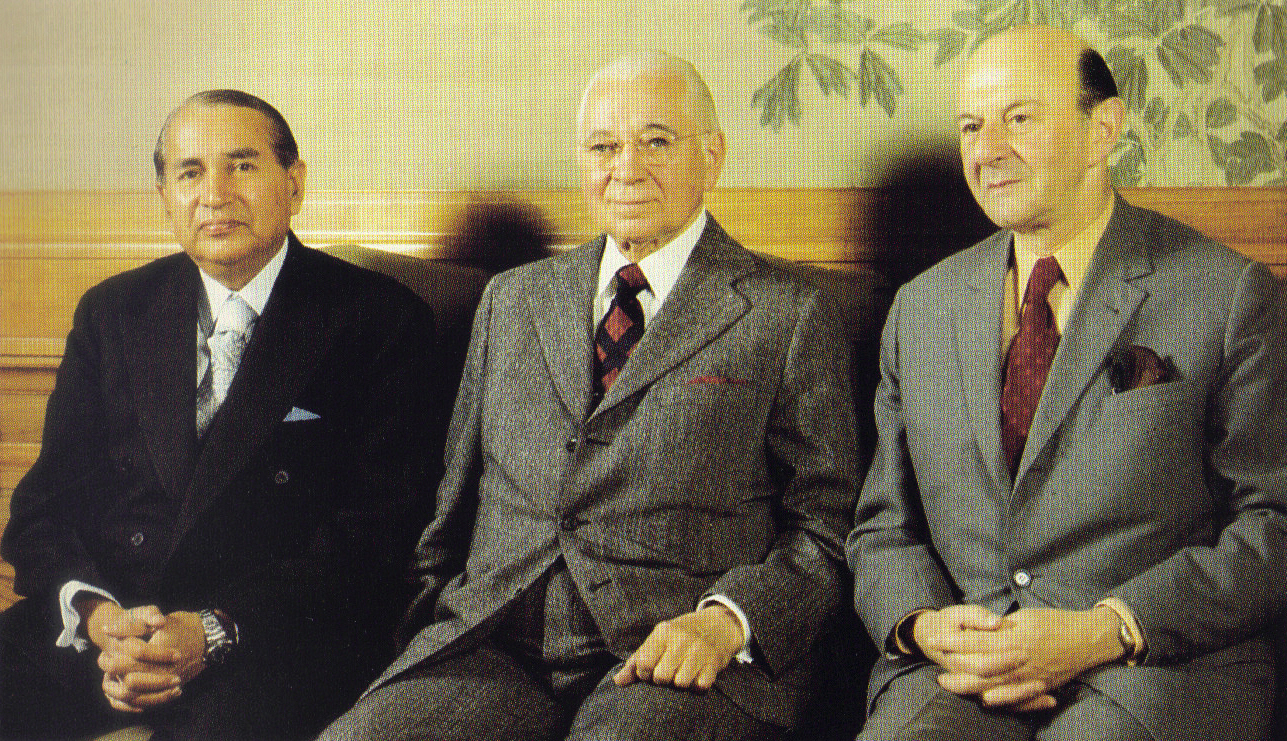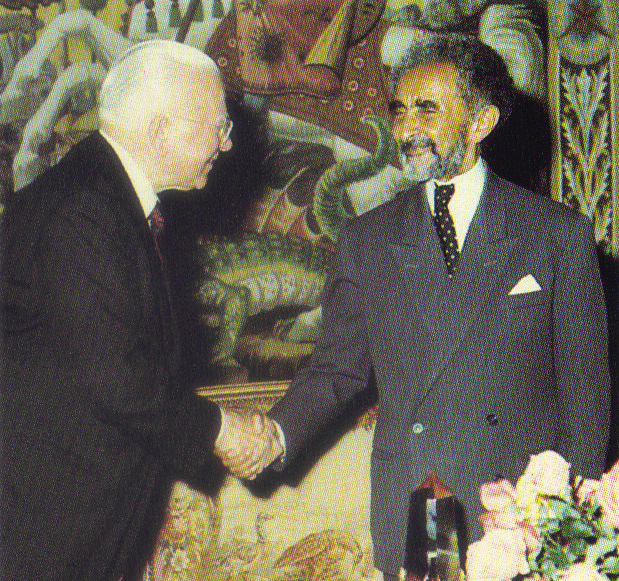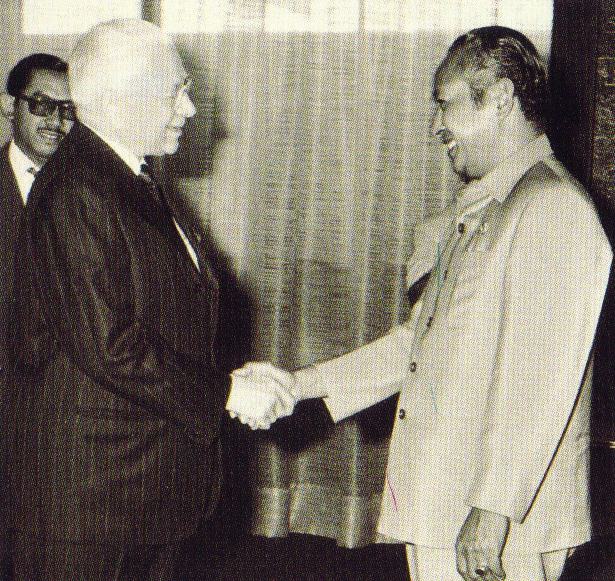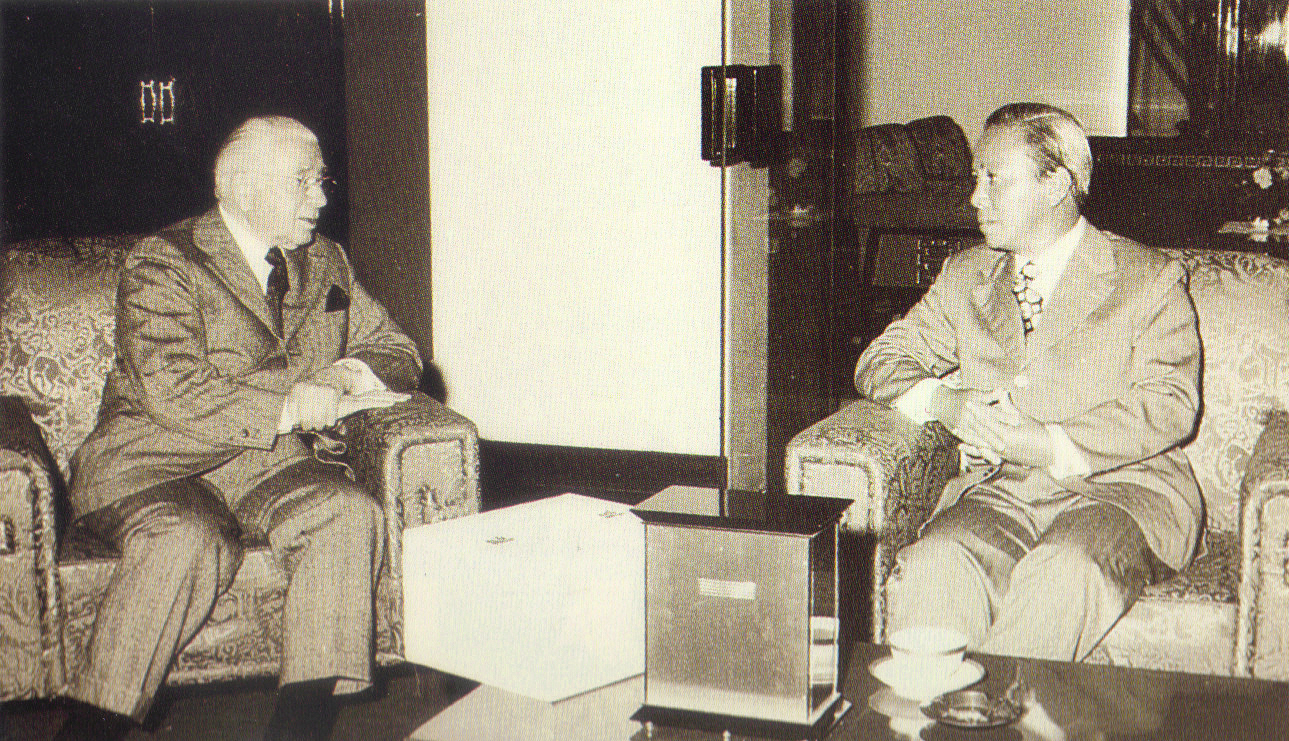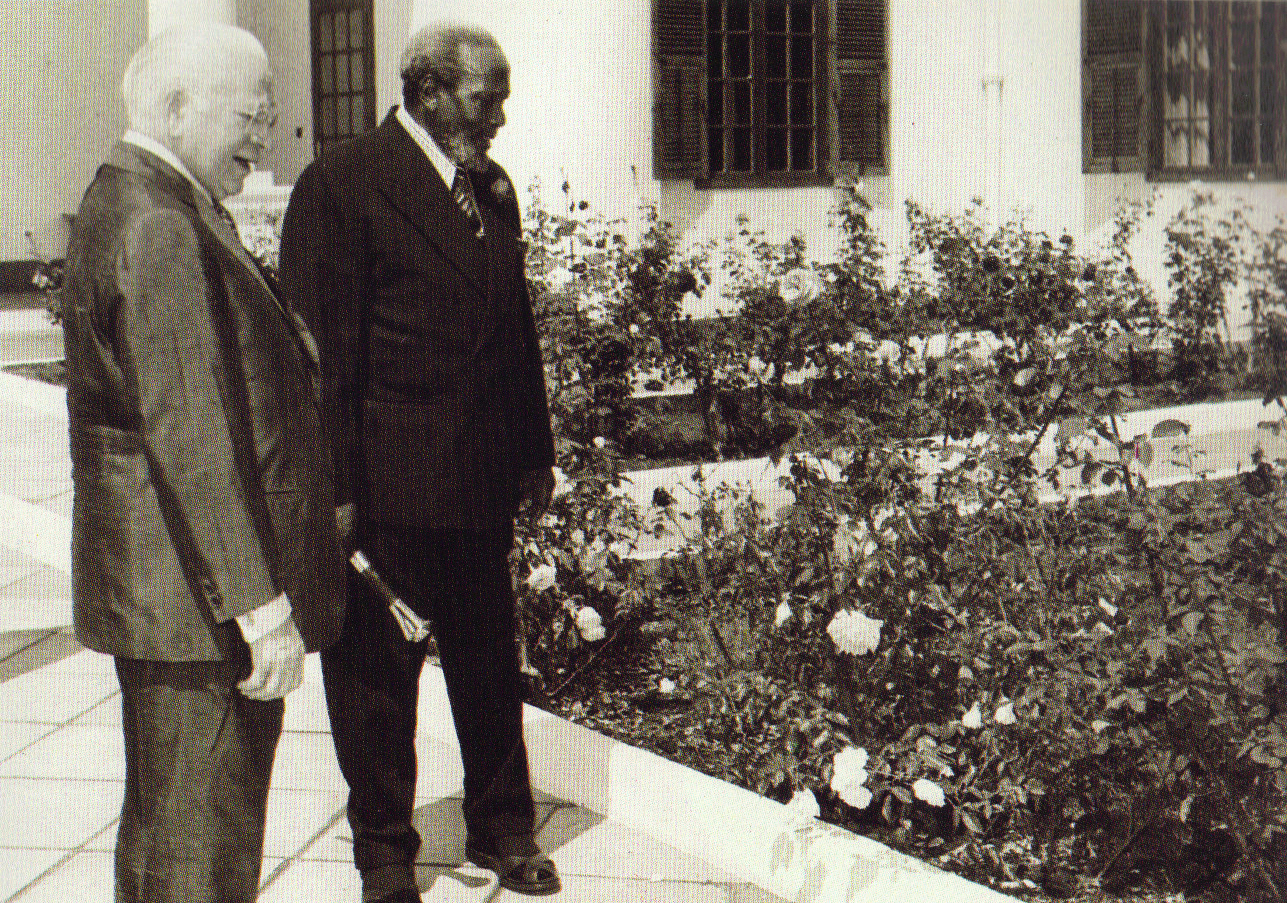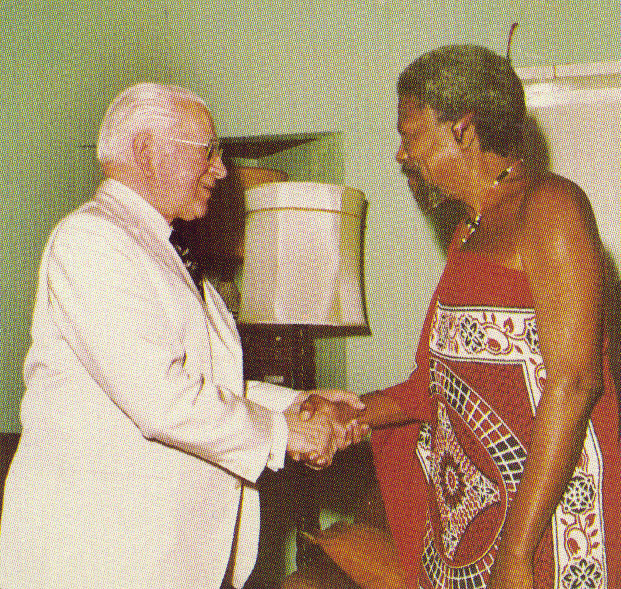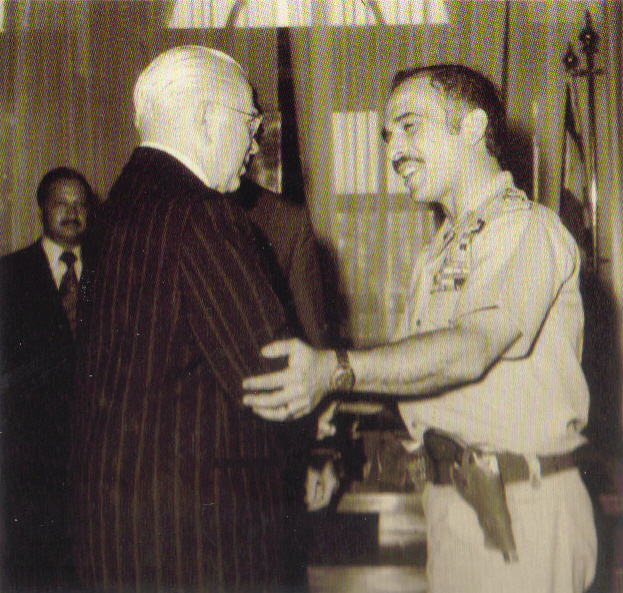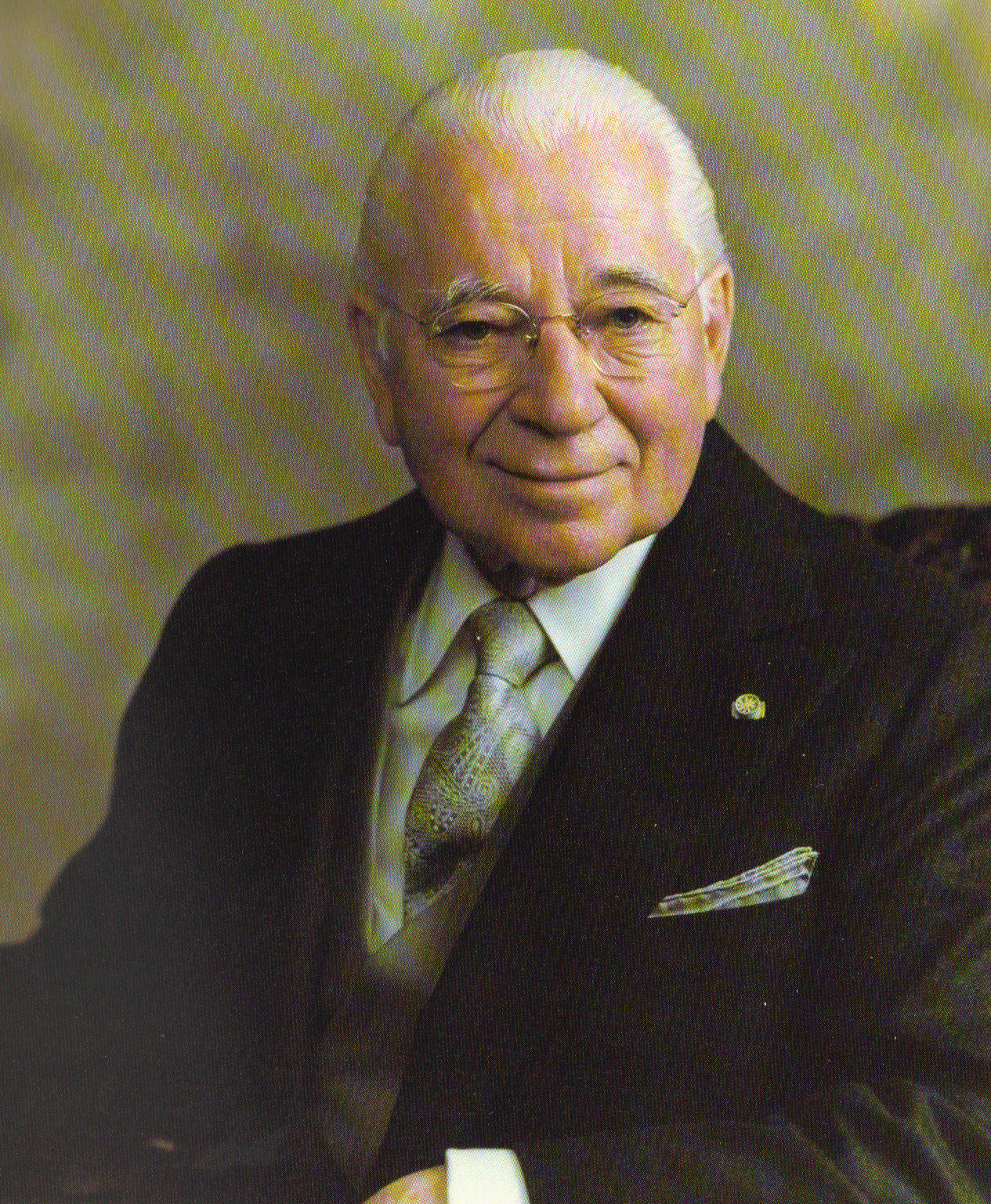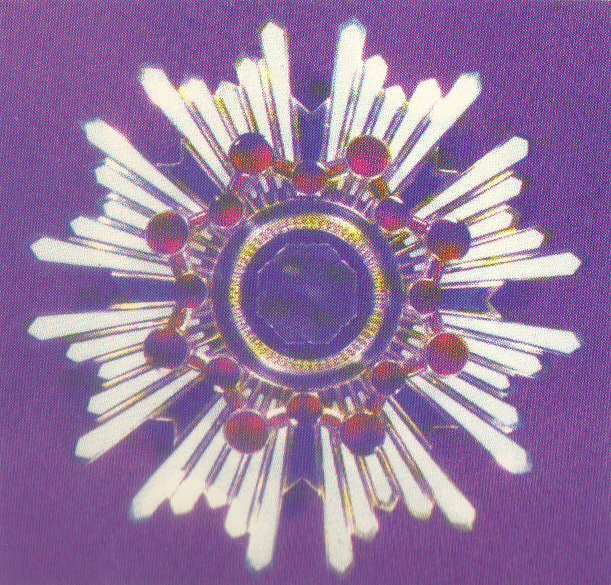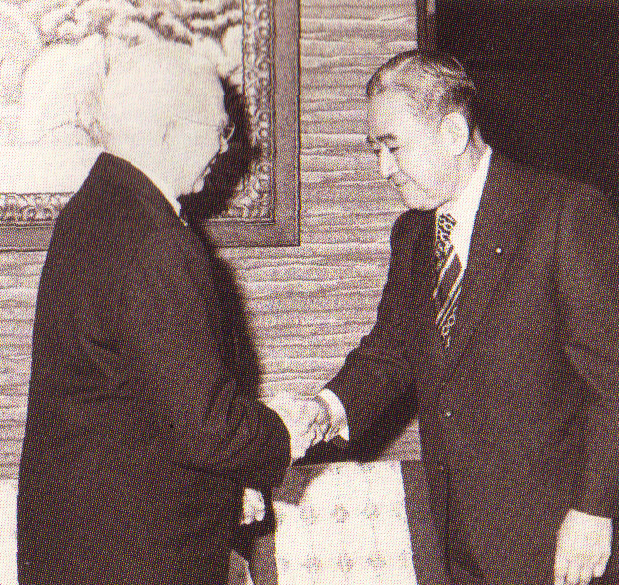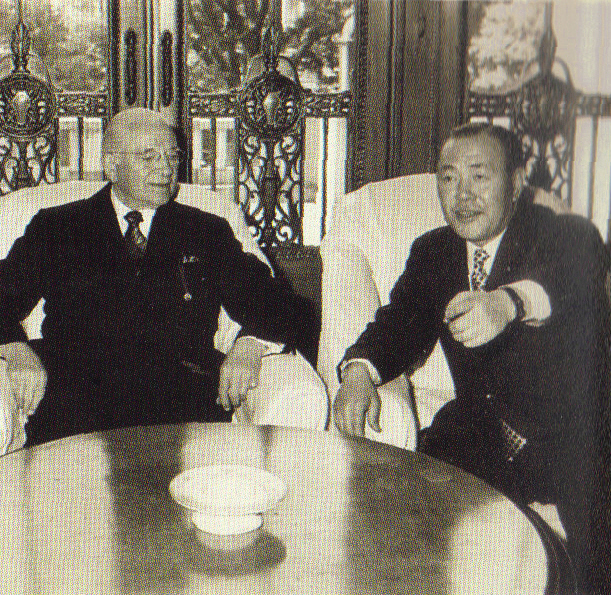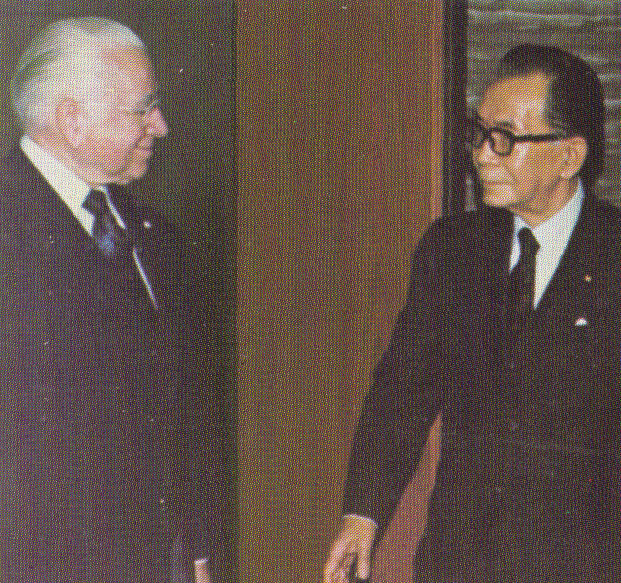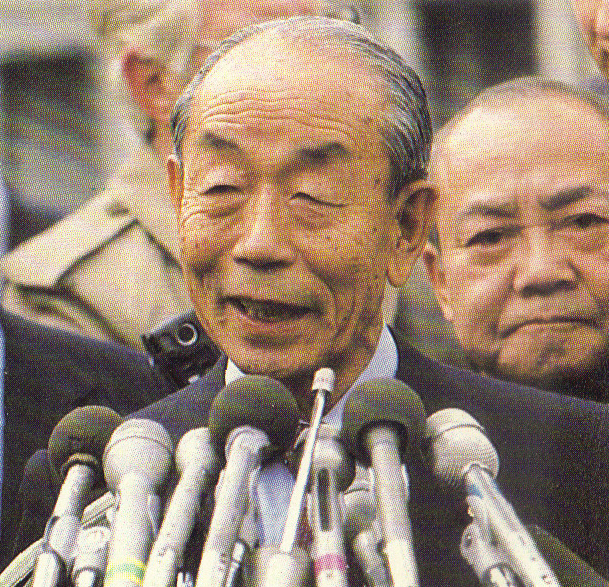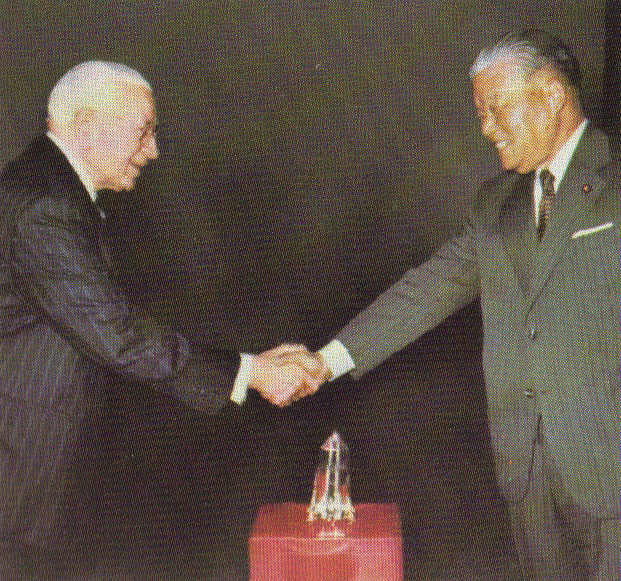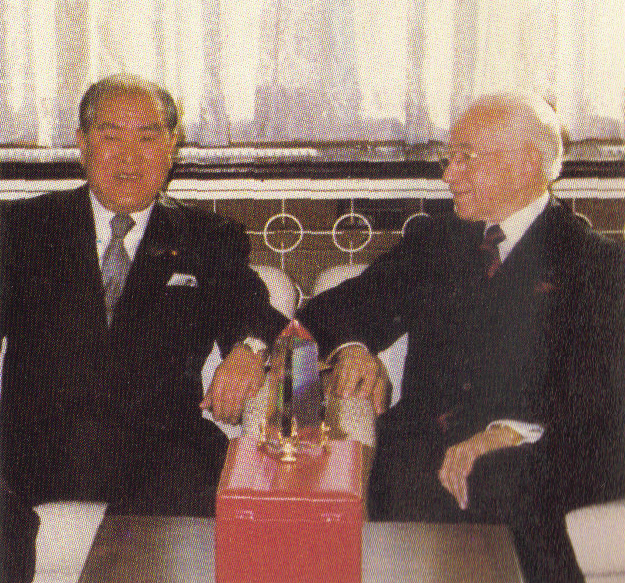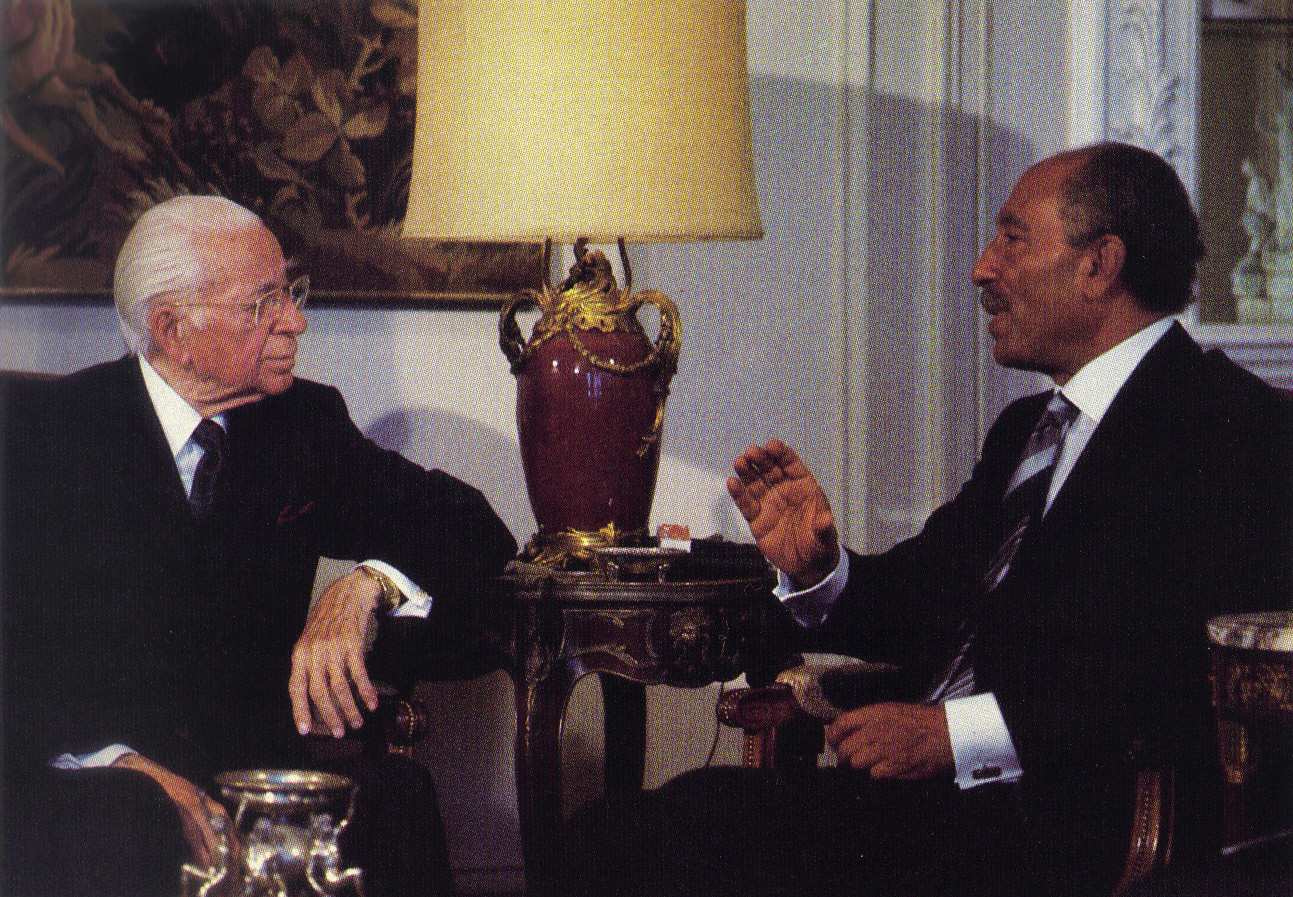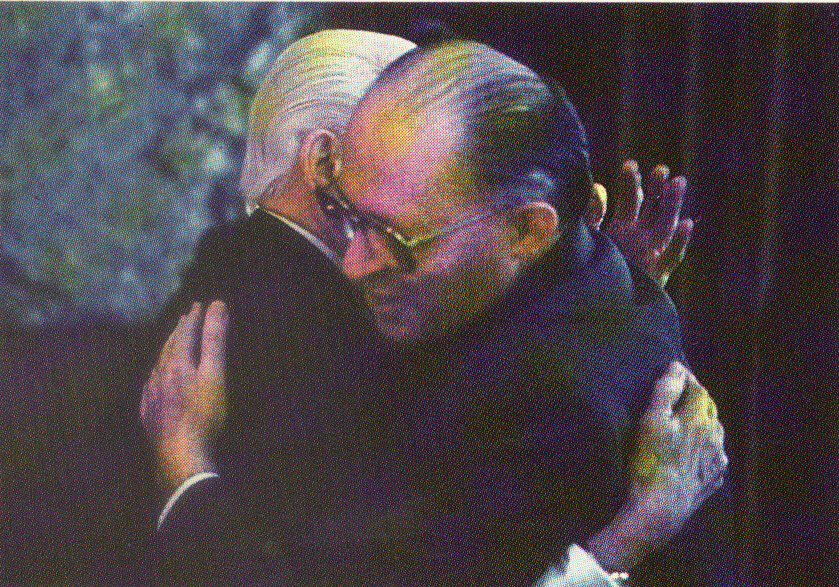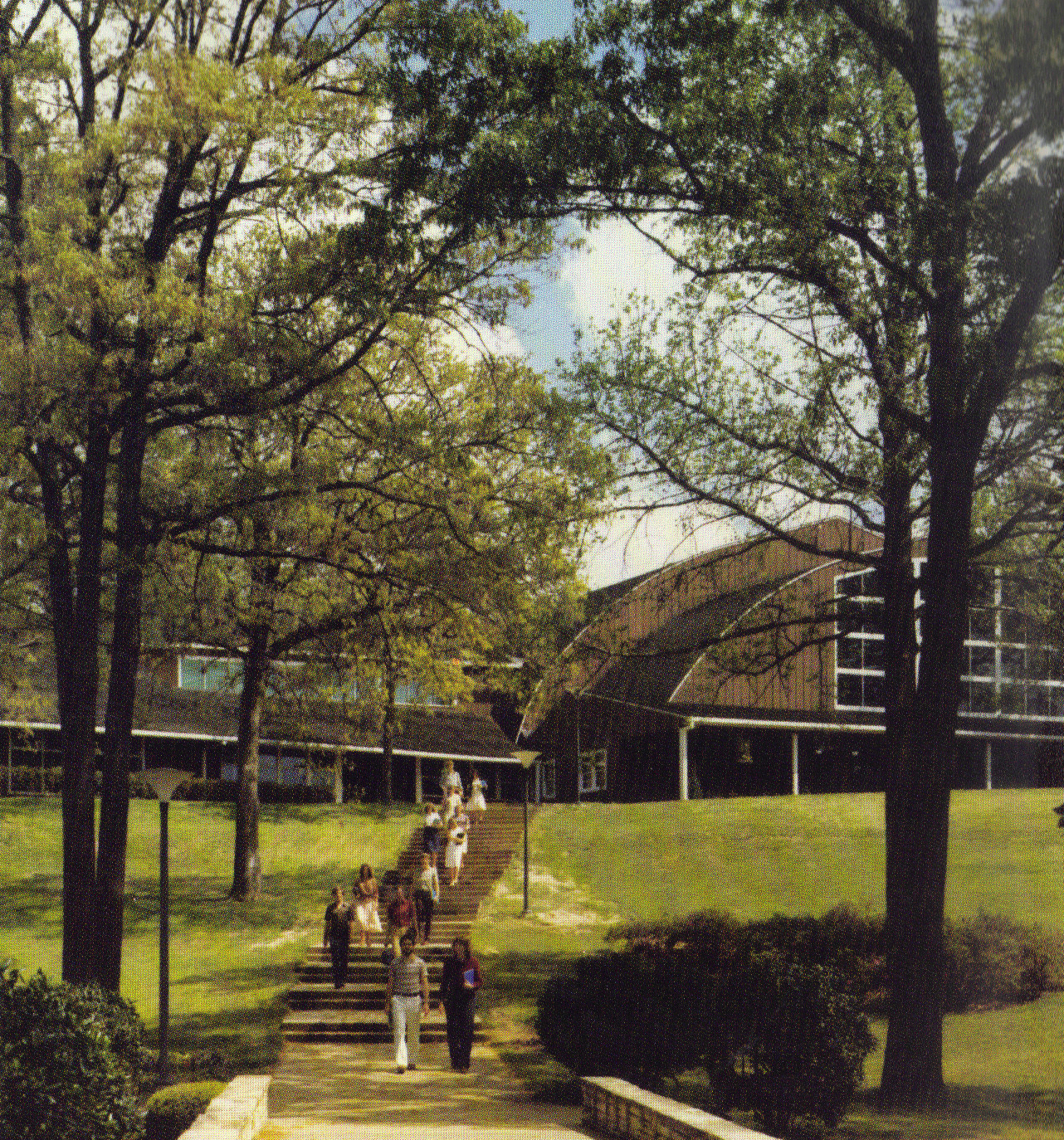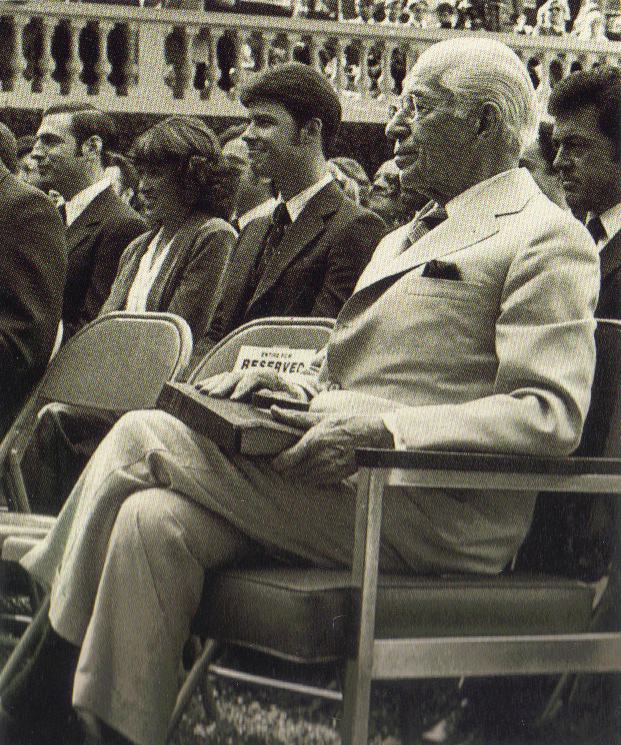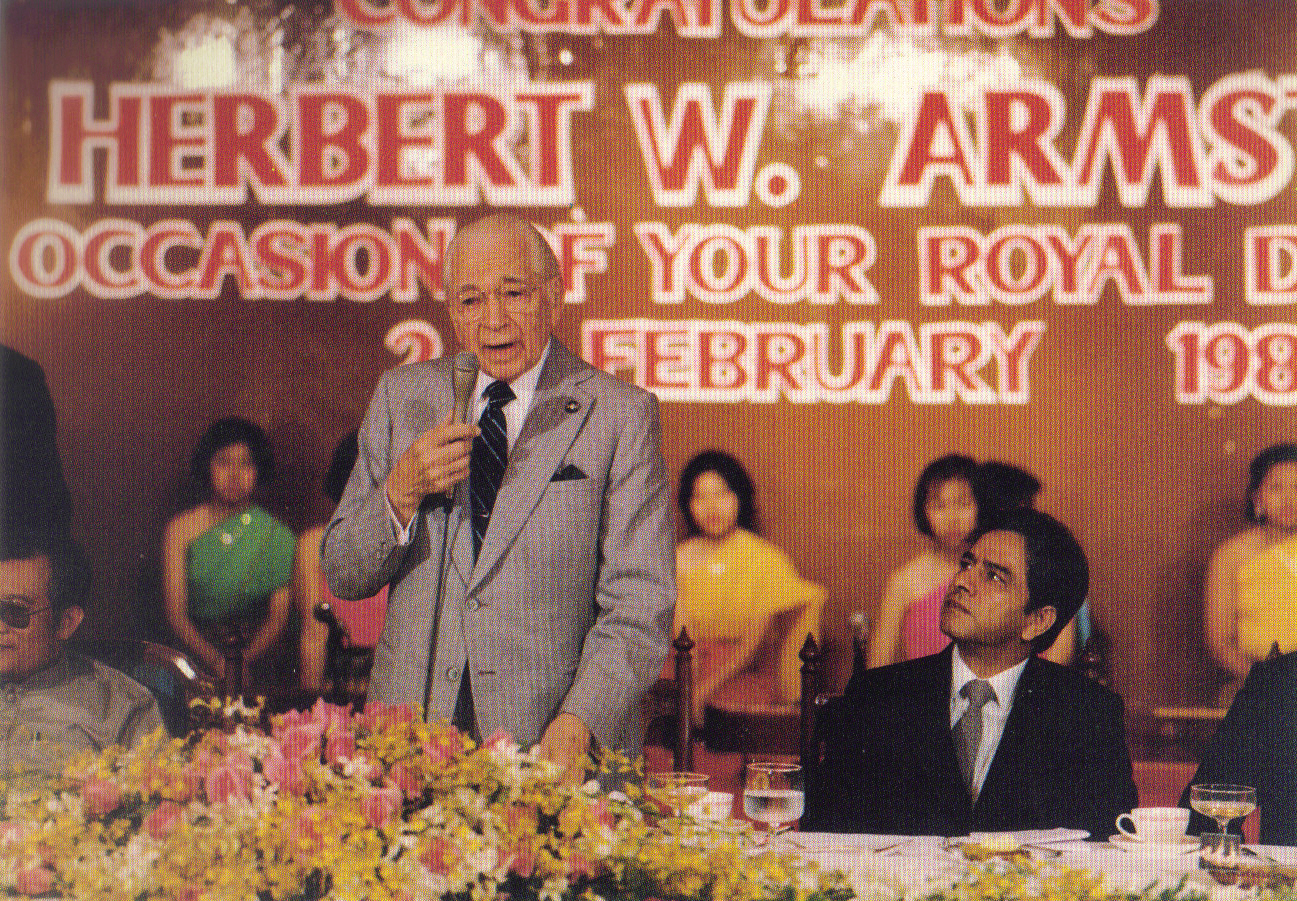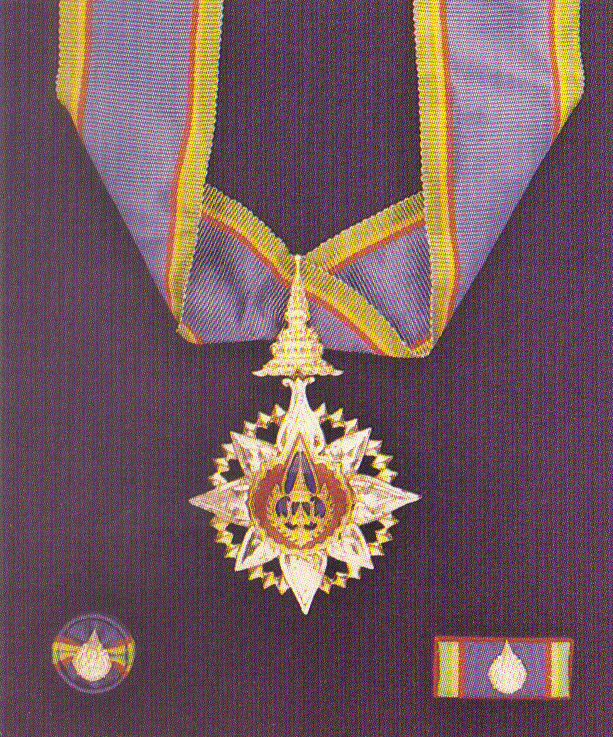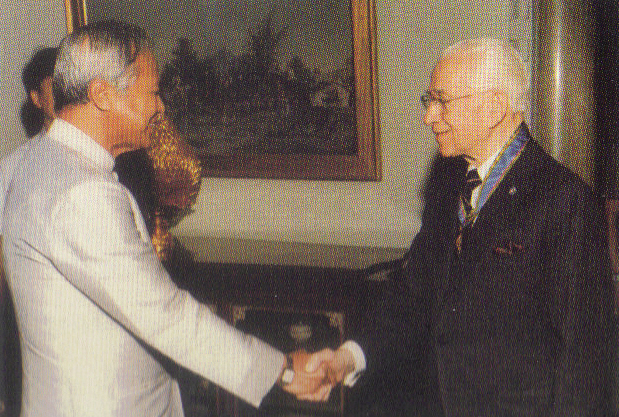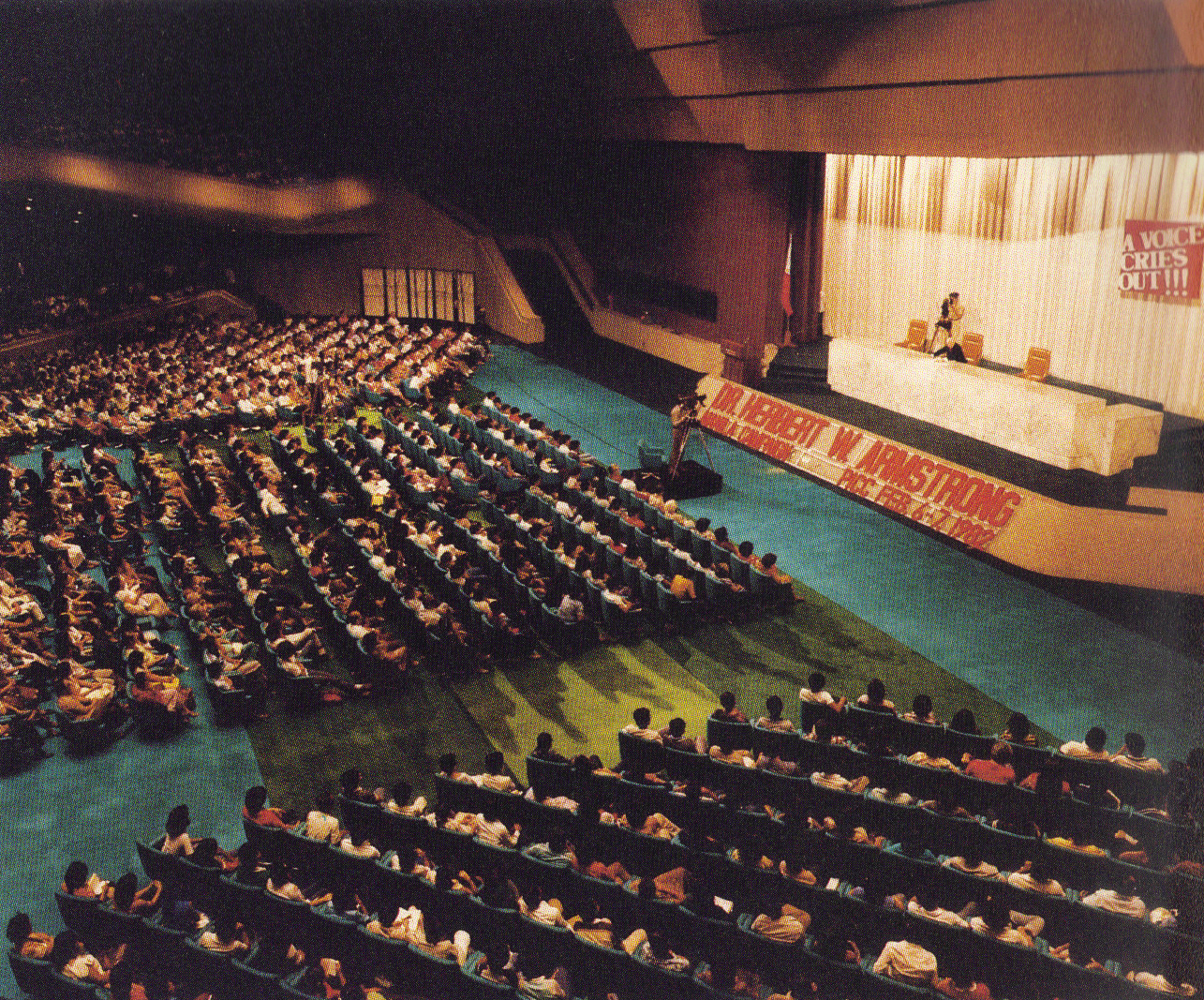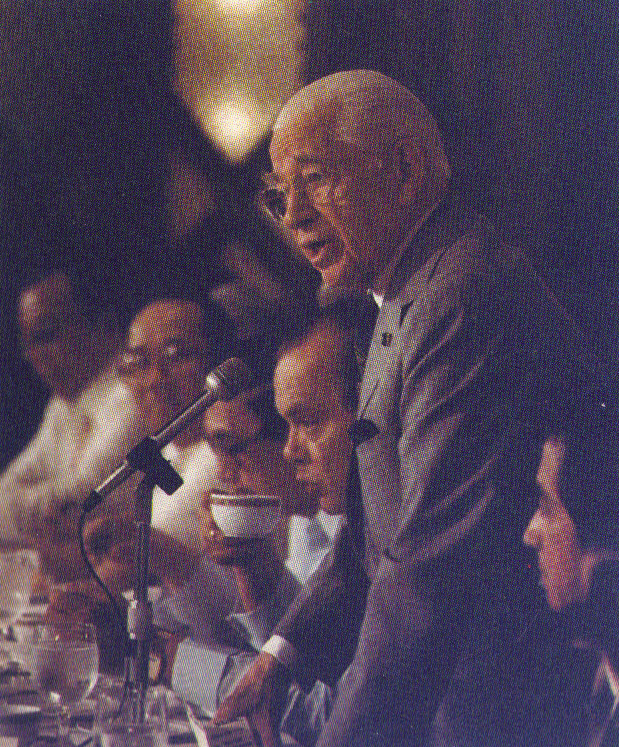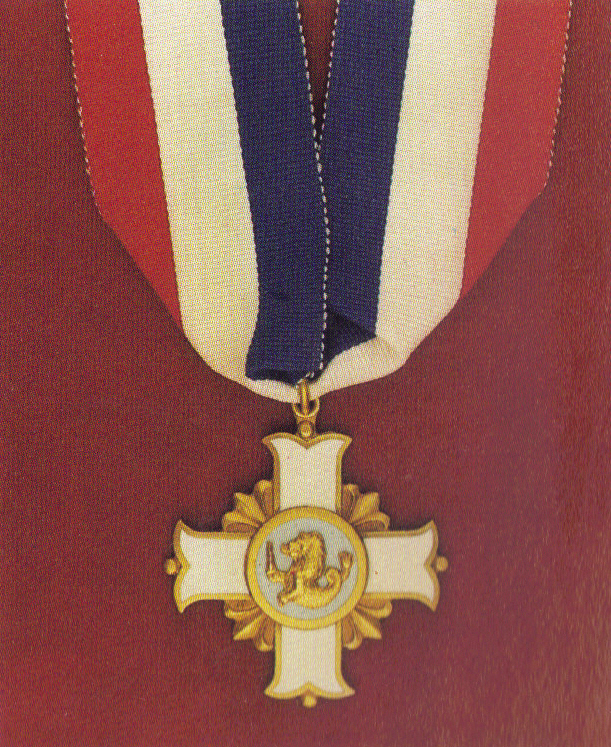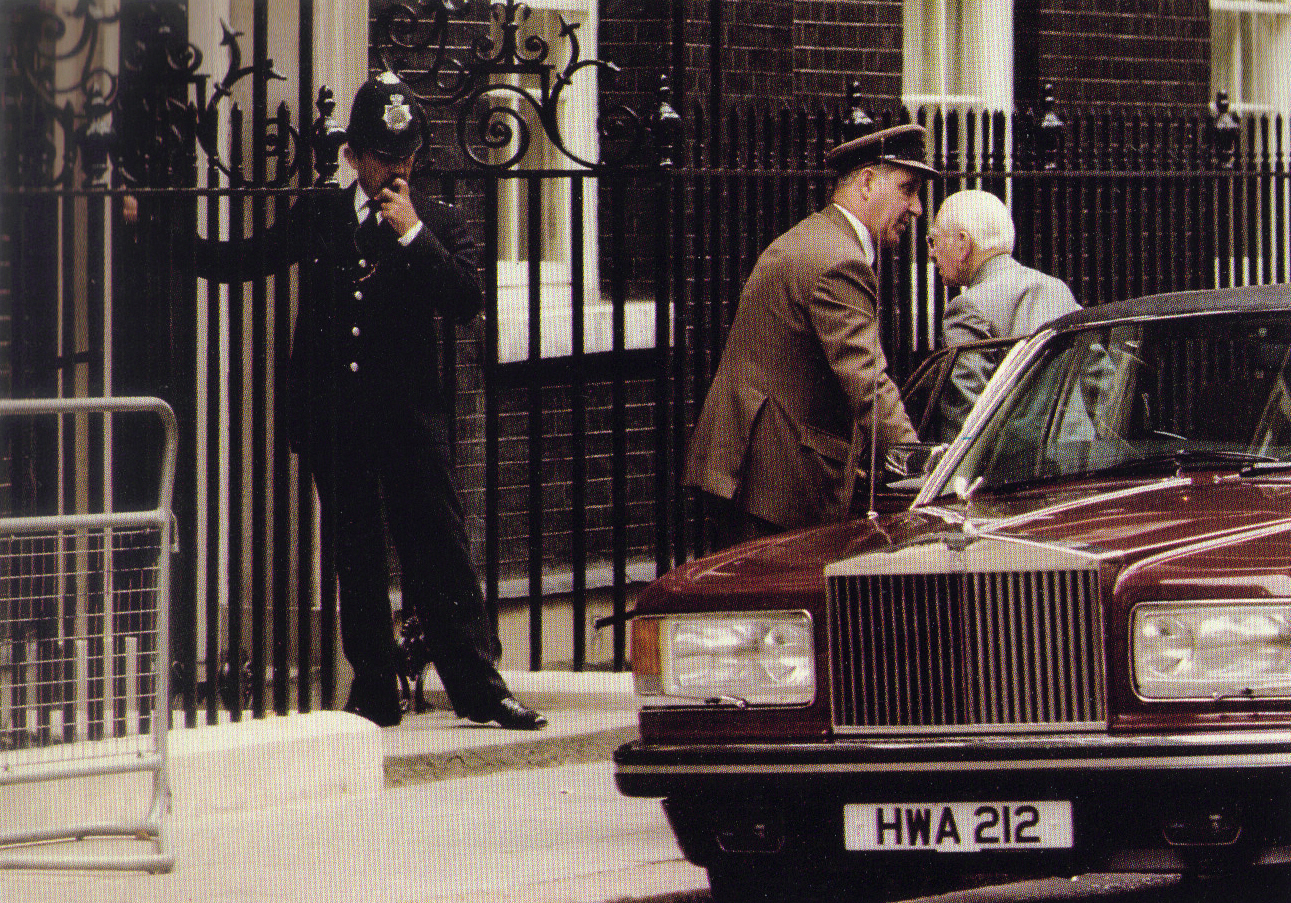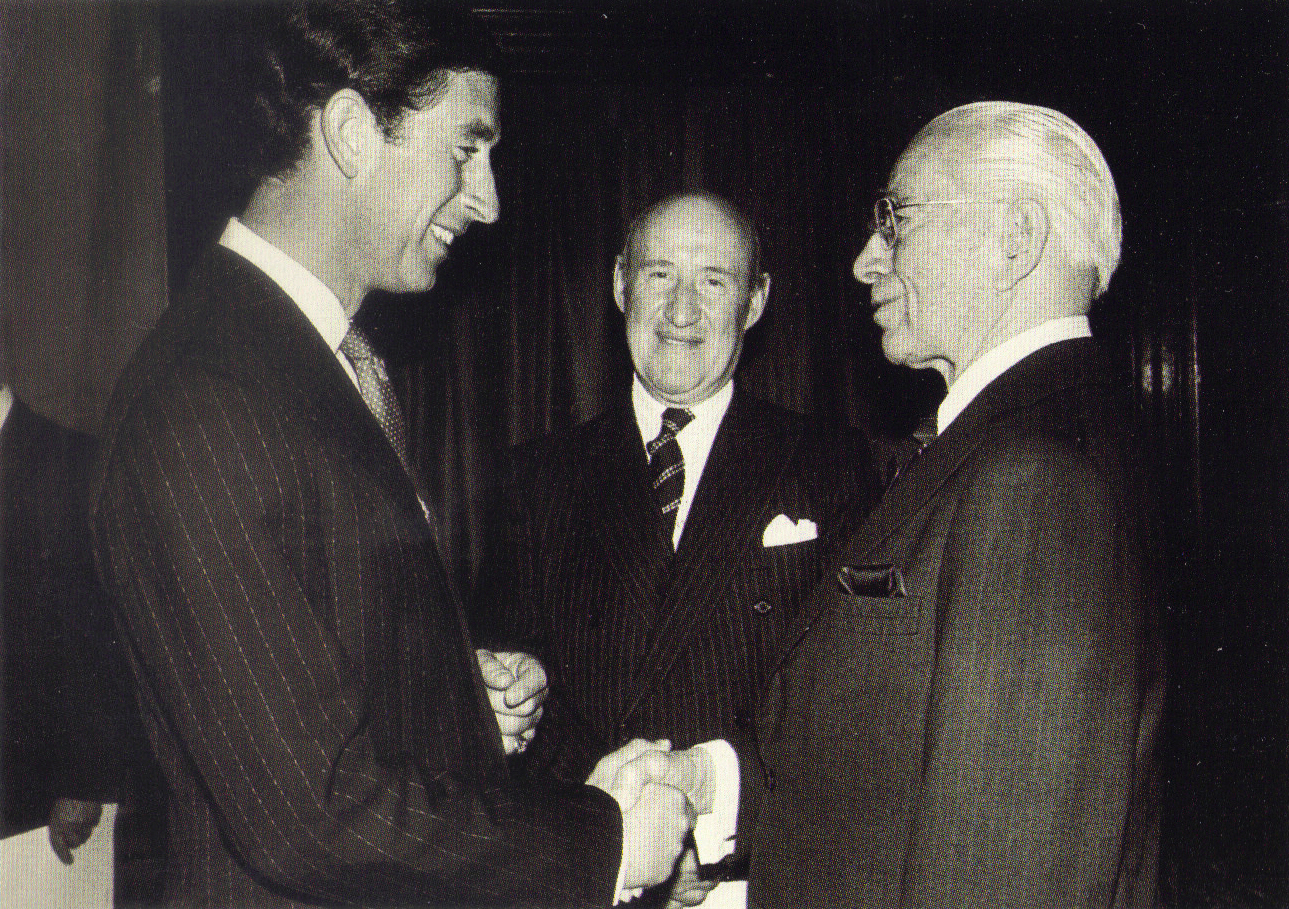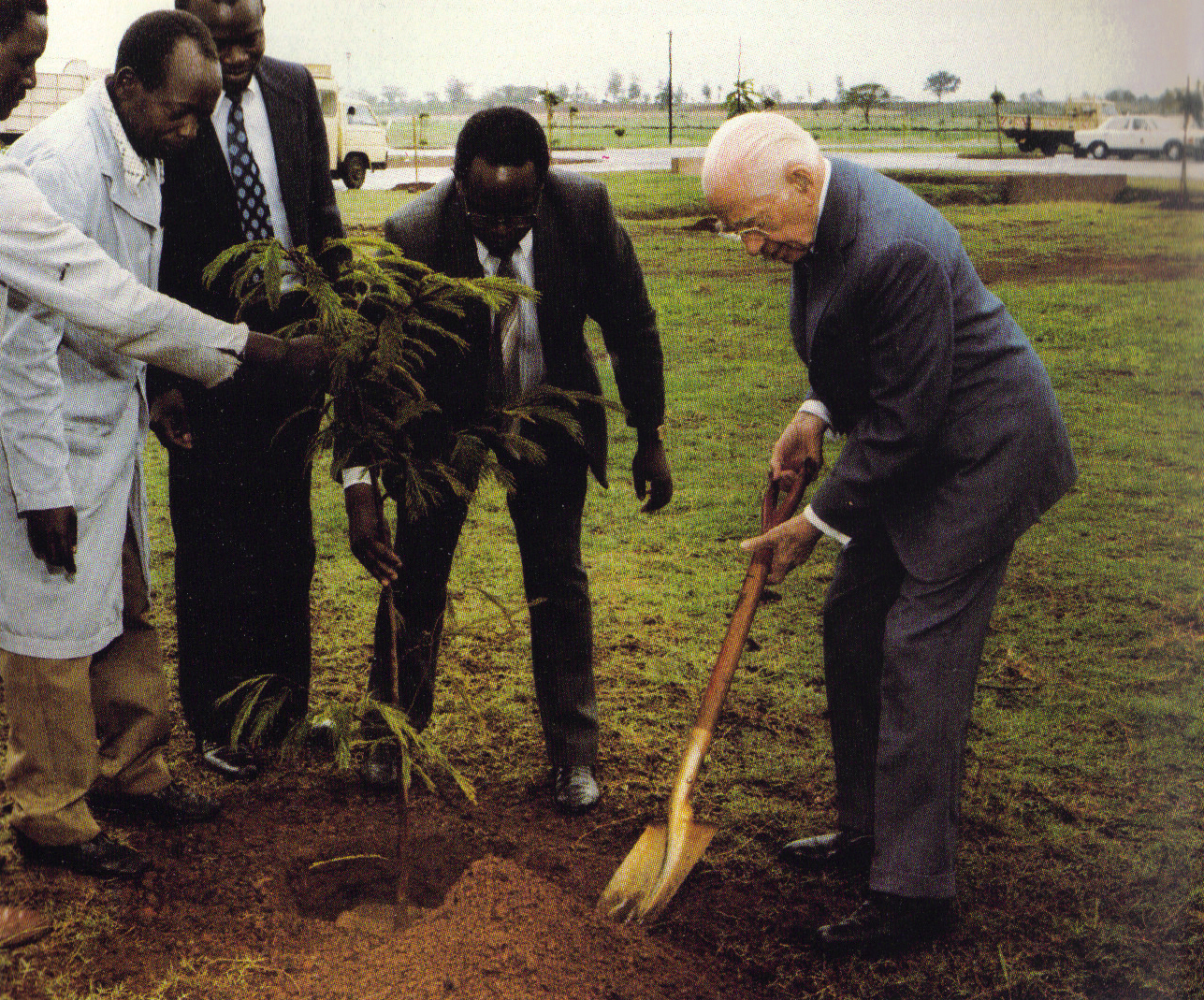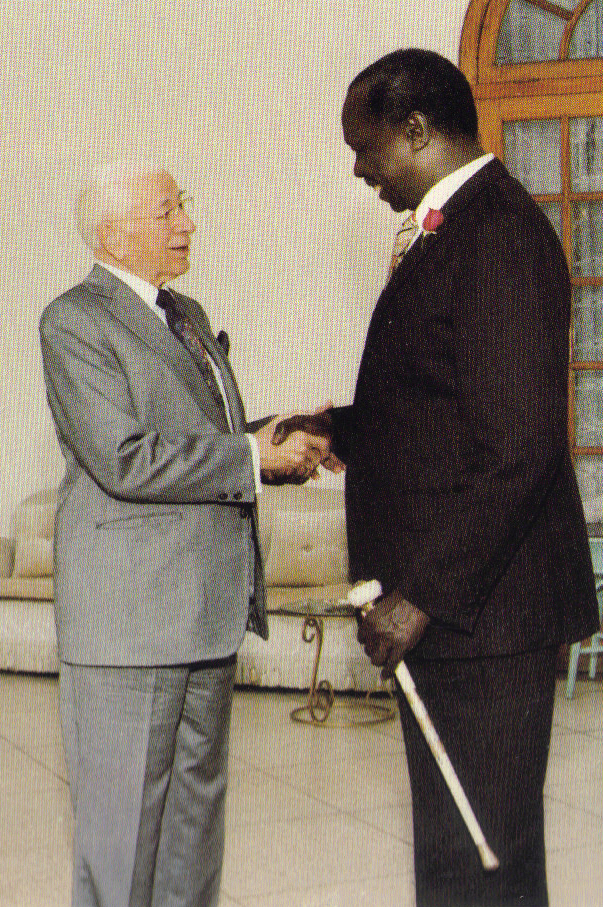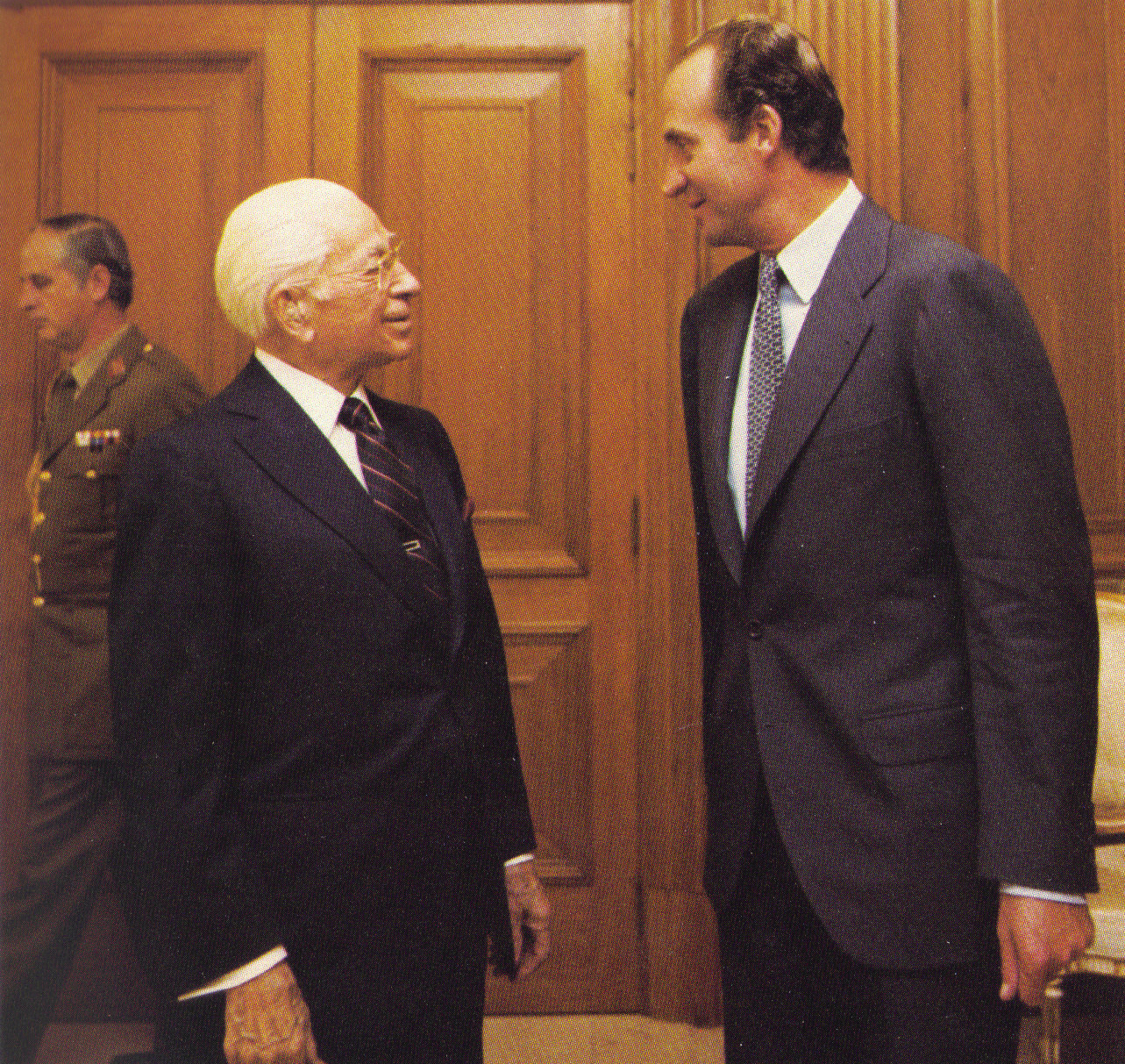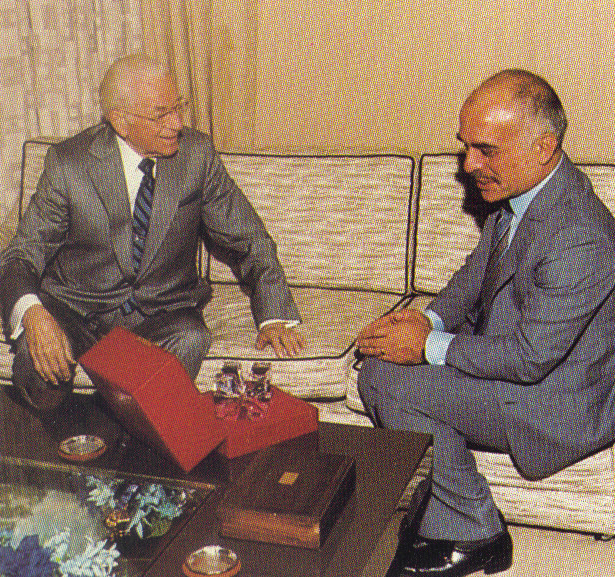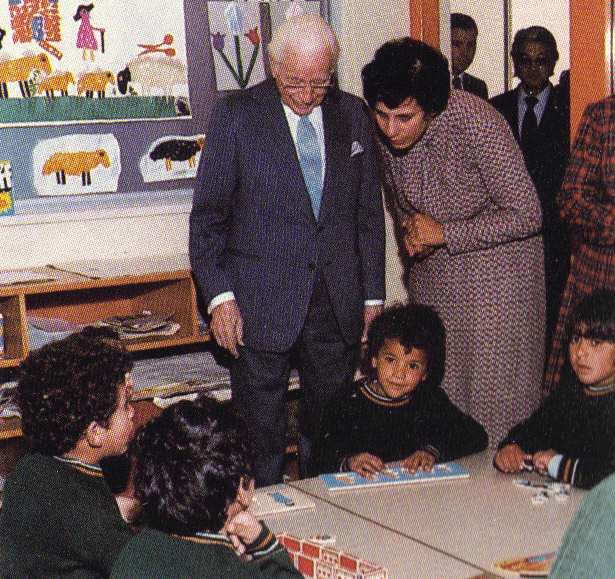
Volume II
1961, 1962, 1963, 1964, 1965, 1967, 1968, 1987
Herbert W. Armstrong 1892-1986
Table of Contents
CHAPTER 63 ..... First Evangelistic Campaign in British Isles
CHAPTER 64 ..... First Middle-East Tour
CHAPTER 65 ..... The Holy Land
CHAPTER 66 ..... At Last! -- Jerusalem
CHAPTER 67 ..... Touring Europe by Car
CHAPTER 68 ..... Purchasing Ambassador Hall
CHAPTER 69 ..... Ambassador College Expands
CHAPTER 70 ..... Tragedy Strikes Richard D. Armstrong
CHAPTER 71 ..... 25th Anniversary
CHAPTER 72 ..... Providential Acquisition of English Campus
CHAPTER 73 ..... June 29, 1959 -- May 22, 1963
CHAPTER 74 ..... April 25, 1966 -- December 10, 1968
Chapter 63
First Evangelistic Campaign in British Isles
Now I should like to get back once again to the year 1952. In recent chapters I have been covering the development of Ambassador College, the growth of The Plain Truth, the progress of the broadcast up to the ABC network transcontinental, on through the television program, and the policy of daily broadcasting.
But, after all, this is my autobiography -- the story of my life. Of course, this great work of God into which the living Christ plunged me actually is my life. The progress of the college, the broadcasting, and the publishing are the activities to which my life is devoted. But then, there is also the more personal phase of these activities.
Getting to Europe
The second commencement at Ambassador College was held on Friday afternoon, June 6, 1952. Our elder son, Richard David, whom we always called Dick, received his B.A. degree that afternoon, along with others.
Dick was a devout student of the French language, and a great life-dream in his mind had been to travel in France and to visit Paris. I had told him that I intended sending him there after graduation, but somehow that seemed so impossibly distant I don't think he ever let himself accept seriously the idea he would really go.
Then one day in my car, probably in February 1952, driving home from the college, I told him I was planning for him to go to France as soon as he graduated. I remember how startled and elated he was. For the first time, he realized that his dream of seeing France was actually going to come true. Immediately he was on Cloud Nine!
Then a week or so later it seemed as if the trip might have to be called off, due to finances. But in the campus newspaper, The Portfolio, dated March 13, 1952, the big headline across page 1 said: Herman and Dick Will Take Trip. It had, by then, been planned for Dick and Herman Hoeh to go together for a summer in Britain, France, and Europe, to look into possibilities of expanding the fast-growing work into Europe.
This story in the campus paper announced that tickets had been purchased on a steamship line sailing from Quebec, Canada, for Liverpool, England. Each of young men had made the trip possible by managing to pay two thirds of the fare out of his own pocket. Dick would take a portable tape recorder along, to send back important interviews to be heard on the World Tomorrow program. The graduation date had been advanced from June 8 to June 6, so these two men could leave in time for the sailing, June 11, for Liverpool.
Dick Drafted
Then something happened! The trip appeared to be canceled after all! Dick received greetings from Uncle Sam. He was ordered to report for induction in the Army!
Our other men students had been given the classification of 4-D, as theological students. But Dick had not been converted when the college started, and he had registered as a major in electronics and in French. He had been in charge of the radio studio when first installed. He had taken the full theological course required of all students, but had not registered it as his major. Consequently his Selective Service Board had not given him the 4-D, but a deferred classification as a student.
Now he was about to graduate, his draft board sent him an induction notice. Immediately I contacted the chairman of his board. I learned that the matter had passed completely from this board's jurisdiction the moment the induction notice had been sent. During his college years Dick had been converted, baptized, and was about to be put into the ministry full time, on graduation. The board chairman said the board would have, under those conditions, changed his classification to 4-D, but it was now too late. It was out of their jurisdiction. The only possible official who could now cancel the induction was the state chairman of Selective Service at Sacramento.
The next day I was in Sacramento. I explained the circumstances, and that passage had been purchased to send Dick to France in the full-time ministry of the Church. I explained that he was our only minister who could speak, read and write French fluently. The Church had been waiting for his graduation to open its work in France. Serious harm would come to the Church if he were prevented from going.
Also I explained the unique, yet most thorough theological training provided ministerial students at Ambassador.
On hearing the facts, the State selective headquarters not only telephoned Pasadena to cancel Dick's induction and reclassify him 4-D, but also sent notification to all other state chairmen that Ambassador College in their judgment qualified according to the meaning and intent of the Selective Service Act as a recognized theological institution.
It was an eleventh-hour reprieve from the death of the trip to France. Dick was to have appeared for induction the very next morning. As it was, he was reclassified 4-D, and given draft board approval to be absent from the United States and take the trip to Britain and Europe.
They spent some time in London, both in educational and theological research, and in checking every possible avenue for expanding the work to Britain and Europe.
I do not know now whether it was in London, Paris, or at Luxembourg, but they learned of the possibility of getting the program on Radio Luxembourg, most powerful commercial radio station in the world. On hearing this, I went immediately to New York to contact the New York representative of this giant station. And that, truly, was the beginning of getting the gospel, which Christ Himself brought and preached, into Europe and Britain!
While in London, they became acquainted with two brothers, William and John Cordas-Cousins, manufacturers of machine tools, whose sister we knew in Pasadena. In later years these brothers were a great help to Dick in getting established, and the work started, in London.
In Paris, where Dick spent a month of the summer, he found that his French was very good -- without foreign accent. They traveled through Germany, where they wrote articles on the phenomenal upsurge postwar comeback of Germany. They also visited Italy, and traveled as far as Belgrade, capital of Tito's Yugoslavia.
Returning to Pasadena, Dick became associate instructor of French at the college.
Radio Luxembourg Opens Door
In the fall of that year, time did finally open to us on Radio Luxembourg. But it was altogether different from broadcasting to an American audience. Luxembourg is a small country sandwiched in between Germany, Belgium, and France -- and its powerful signal heard in several other countries. Their very commercial life depends on being careful in what NOT to allow to be said over their powerful facilities. They allow NO political propaganda not even any ALLUSIONS to anything political. And, in accepting religious broadcasts, the station obviously enforces strict rules that no offense is given to any religion or religious belief.
In speaking on biblical prophecy, dealing with today's world events, we soon learned we had to become very familiar with their policies, lest our analysis of today's world news be construed as an allusion to things political.
November 22, 1952, was a historic day for us! On that day I recorded the first broadcast for Radio Luxembourg!
I have written many times about how Christ opened the giant DOOR of Radio Luxembourg to proclaim HIS gospel to Europe precisely nineteen years -- one time-cycle -- after the beginning of the work in 1934. The door of radio first opened on the first Sunday in 1934. Our first broadcast to Europe occurred the first Thursday in 1953 -- the first week in January both times!
BUT WE DID NOT PLAN IT THAT WAY! GOD DID! My November 22 recording was rejected by the station. A second try was rejected. The third time I had finally come to comprehend clearly the station policies -- and it was accepted! It went on the air the first week in January, 1953!
Dick Returns to London
Our broadcasting on Radio Luxembourg, at first, was a 4:15 p.m., Thursday afternoon time. It was on a broadcast band that reached almost all Europe, but did not bring a big response from England. An English language program could be understood by only a small minority of the people of Europe, where so many different languages are spoken.
Nevertheless, it did bring letters from listeners. And soon we were shifted to the 11:30 p.m. time on the well-known 208 beamed directly over the British Isles.
Now it became necessary to make plans to handle the mail response. Dick planned to return to London. First, we purchased a car for him, through the British Rootes motorcar corporation. Through their branch office in Beverly Hills, we purchased a little compact car -- a Hillman-Minx -- to be delivered to Dick upon arrival in London.
So, in February, 1953, Dick flew, alone, to London. There he arranged for a London mail address, at that time known to thousands all over Britain -- BCM (British Crown Monomarks) Ambassador, London, W.C.1.
He remained in London, handling the mail, until September, when he returned to Pasadena. Old Professor Mauler-Hiennecy had retired, and Dick now took over the French-language department at the college.
The British Monomark office forwarded the mail direct to Pasadena. Dick then began organizing the British and European mailing list in our mailing office. The Plain Truth and all requested literature had to be mailed to European listeners from Pasadena. This was very unsatisfactory and had to be remedied as soon as possible. But Dick was required in the classroom for that college year, until a new French professor could be appointed.
In the spring of 1954, the British mail situation was becoming desperate. We needed to establish an office in London. We placed a request for a teacher of French with the teachers' placement bureau in Los Angeles, and I appointed Dick to make the selection.
Under most unusual circumstances Mr. Dibar K. Apartian, who had been reared in French-speaking Geneva, and spent much time in France, applied. Dick interviewed him.
He's just the man we want, Dick told me. He was -- and still is! Under Mr. Apartian the French department has grown into a big operation. He became the voice of the French-language version of The World Tomorrow. He is also editor of the French-language Plain Truth.
On April 2, 1954, our dean, registrar, and professor of science, Dr. Hawley Otis Taylor, died. He had completed seven years, lacking two months, as head of the faculty at Ambassador College. With Professor Mauler-Hiennecy also gone, our own graduates were beginning more and more to fill up the faculty. Dr. Taylor was seventy-seven years of age when he died. His last seven years were devoted to helping establish the highest of academic and scholarly standards at Ambassador.
We Revisit London
While Dick had been in Pasadena during the 1953-54 year, his little Hillman-Minx car had been left in England with the Cordas-Cousins brothers. In May, 1954, plans were laid for Dick to return again to London -- this time with Roderick C. Meredith. They sailed on the Queen Elizabeth June 16, to handle the British and European mail and further the work overseas.
It was now time that I personally inspected that situation abroad, where the work had now secured such a firm foothold. Mrs. Armstrong and I sailed, August 5, 1954, on the new, fastest ship in the world, the S.S. United States. We had now been on Radio Luxembourg a year and a half. A large listening audience had been built up. The mailing list had grown.
Our son Dick, with Roderick Meredith and the Cordas-Cousins brothers, were standing on the dock at Southampton to greet Mrs. Armstrong and me, as we debarked from the giant steamer United States. We had made reservations at the Dorchester Hotel where we had stayed on our 1947 visit. The Dorchester representative at the Southampton docks arranged for transporting our steamer trunk via the boat train to the hotel.
We loaded our hand luggage into the automobiles. I think Roderick Meredith rode back to London with the Cousins brothers. Mrs. Armstrong and I crowded ourselves into Dick's little Hillman-Minx and Dick drove us to London.
A short distance out of Southampton Dick stopped at a small teahouse where we partook of the British custom of late afternoon tea.
Planning Meetings in England
Arriving in London I thought it well to make personal contact with as many of our radio listeners as possible. To arrange for booking halls for meetings, and placing some newspaper advertising I decided to engage a London advertising agency. I contacted the advertising managers of a couple of leading London newspapers on Fleet Street. They recommended the Frederick Aldridge, Ltd., agency. I contacted Mr. Philip Aldridge at the agency offices.
This agency had handled the Billy Graham evangelistic campaign in London, which had gained world attention. Mr. Frederick Aldridge had handled this account, and so his brother and partner, Mr. Philip Aldridge, was engaged as the World Tomorrow advertising representative for Britain. He handled our account for several years.
From our mailing list we knew our largest groupings of listeners centered around London, Manchester, Birmingham, Belfast, Northern Ireland, and Glasgow, Scotland. We planned meetings in Belfast, Glasgow, Manchester, and London.
The halls were booked, beginning September 14. Then announcements were mailed to those on the mailing list within those areas, and announcements arranged to go out on the program on Radio Luxembourg at the proper time.
Meanwhile we were free for other things. My wife wanted to go to King's Lynn, north of London on the sea, where her maternal great-grandfather had been a Methodist minister. Dick drove us to King's Lynn in the Hillman-Minx. En route we passed through Cambridge where we stopped for lunch. It was interesting to have our first view of one of these famous English universities. The various colleges scatter over most of the city of Cambridge. We walked through one of the halls, visited the cathedral, and enjoyed the beauty of the stretches of lawn alongside the river bank.
Also we stopped off a short while at Ely, to visit the huge old cathedral of Ely. It was then mostly or altogether in disuse, and sadly in need of repair if it were to be maintained at all. This is one of the very large cathedrals built by the Roman Catholics during the Middle Ages, now reeking with age. It has since undergone considerable repair. It is, of course, now one of the Church of England cathedrals.
At King's Lynn we searched out the little Methodist church where Mrs. Armstrong's great-grandfather had been pastor. A much larger addition had since been added since he died more than a century ago. We searched for his grave. Actually the graveyard where he was buried had been destroyed, for the building of a structure of some kind, but all the tombstones had been piled in an adjoining lot. We were just about to give up our search when one of us stumbled onto the great-grandfather's tombstone.
Later we drove in the Hillman-Minx on the Continent, crossing the English channel on a ferry.
We were taken all through the station at Radio Luxembourg. Then we drove on to Germany. Dick showed us the incredible recovery from the war, everywhere evident. Even the progress since his visit in 1952 was unbelievable -- yet it was there in plain sight. After visiting Frankfurt, Bonn, Cologne, and Düsseldorf, we drove into Holland.
As a boy I had read stories about Holland -- Hansel and Gretel and others. I had read of Haarlem, and supposed it to be a little village. I was amazed to find it a big city -- and Rotterdam as big as San Francisco -- with Amsterdam as big as Cleveland, Ohio, and bigger than Pittsburgh, or Boston, or many major American cities. We also drove through The Hague, about as large as Rotterdam. Then back through Belgium, and another ferry across the channel to the white cliffs of Dover in England.
This was the tenth of September. It was good to rejoin Roderick Meredith in London. We had enjoyed, and profited from, the trip on the Continent. But always, after being on the Continent, it seems just like coming home to be back in England! After all, the British and Americans are the SAME PEOPLE. Certain national differences have developed through the last two centuries, but we are the same people -- and both nations ought to remember that.
And NOW! U.K Speaking Tour
Late Sunday afternoon, September 12, Mrs. Armstrong, Dick and I started driving north in the Hillman-Minx. Over the weekend, our then advertising agent from Beverly Hills, California, Jack Parmalee, flew in to London. He wanted to attend the meetings on the speaking tour. He and Roderick Meredith met us in Belfast on Tuesday morning. They had driven from Dublin in a rented car after, it seems in a not-too clear memory, having flown to Cardiff, Wales, and then to Dublin.
We stopped off Sunday evening for dinner at a hotel in St. Albans. Little did we dream, that Sunday evening in September, 1954, that we would, within a few years, have a college already larger than the Pasadena College was then, with a St. Albans mail address!
After dinner we drove on north, bypassing Birmingham, and arriving in Manchester around midnight. Next morning we continued north. It was the first opportunity for Mrs. Armstrong and me to see northern England, and we found it a very interesting experience. We stopped at Carlisle for lunch. As a boy I had often visited a small town in Iowa named after this northern England city. It was just twelve miles south of Des Moines where I was born and reared. An uncle and aunt lived there, with a son -- my cousin -- just a year younger than I.
Carlisle is only a few miles from the Scottish border. Soon after lunch we were driving westward in Scotland. In the late afternoon we reached Stranraer. There was considerable excitement -- and no little suspense -- concerning our ability to get passage on the evening ferry across the north channel of the Irish Sea. We had dinner in a hotel near the docks while anxiously awaiting the verdict. If we failed, I might have missed the following night's meeting at Belfast entirely. We finally persuaded an official to let us on. There were more cars and passengers than they could accommodate.
It was interesting watching the cranes pick up Dick's car, swing it from a cable through the air, and drop it down onto the ship. But soon we were steaming the thirty-six-mile distance to Larne, Northern Ireland, where we had hotel reservations for the night.
Next morning, we drove the short distance down to Belfast, and met Roderick Meredith and Mr. Parmelee. We visited the hall that had been engaged for our meeting -- one seating about a thous and or twelve hundred people. We found everything would be in readiness for the meeting. Then we went sight-seeing around Belfast and vicinity.
We had heard of a very old historic place of ancient Druid worship a few miles outside Belfast, known as The Giant's Ring. We drove out to it. Then we proceeded to the giant shipbuilding yards at Belfast. The size of this operation was truly astonishing. Belfast is a major port.
Evening came, and time for the meeting. Arrangements had been made for ushering in people at the hall, so we did not appear until five or ten minutes before time for the service. The large hall, located in the very heart of the city center business district, was well filled. We found approximately 750 people waiting for us.
There had been a small advertisement in the newspaper giving notice of the meeting, but no attempt had been made to draw any audience beyond our own interested radio listeners. So an audience of 750 was a very, very warm welcome to Belfast. People had come from miles around. One had pushed another interested listener a great distance in a wheelchair to a bus, in order to attend. My message that night was on What's Prophesied for Britain.
The message was not intended to be for entertainment. This was my first opportunity to speak in person before an overseas audience. The time was serious, and the message was serious.
I said: Last week, and part of the week before, I spent five days in Germany. And what I saw in a Germany only eight years ago almost shattered from the war, was emphatic evidence that the WORLD WAR is not yet over! We are now merely in the second recess of the war.
What is prophesied for the United Kingdom, and for the United States? I have crossed America and the Atlantic Ocean to tell you things I can't say on the radio. What I'm now going to say is not popular! But it is as certain as the rising and setting of tomorrow's sun! Yet on beyond it all, after our peoples have been PUNISHED as no nations ever were before, WORLD PEACE is coming, in our time!
The audience showed tremendous interest! After the service our two cars were driven on a boat. We all had sleeping accommodations on the boat for the night. Next morning we were docked at Glasgow.
That night another good audience, equally warm and friendly and interested, assembled in a hall in downtown Glasgow. The crowd there was smaller -- perhaps 450 or 500.
Thursday we drove down to Manchester. The hall there was on the third or fourth floor of a building. There was only the one lift (elevator to our American readers). The hall here was smaller, but we had an overflow crowd, much to the displeasure of the lift operator. Extra chairs had to be brought in to the auditorium, and several had to stand. I must have spoken about an hour or a little over, but after about forty-five minutes the lift operator came in, interrupted the service, and wanted me to stop talking so he could close up the lift and go home.
But I had come a long distance to deliver a super-serious life-and-death message to hundreds of my radio listeners, and I was not going to cut that message off to please a disgruntled lift operator. The hall had been engaged for the entire evening. A good many had to hear more of this man's bad attitude before everybody had finally been taken to the ground floor, after the meeting was dismissed. And I was so thoroughly disgusted with his uncalled-for ill behavior, I expressed myself rather sharply to him as I descended in the final trip of the lift for that night.
The crowd there was slightly smaller than at Glasgow, but still an overflow crowd.
First Convert Baptized
On Friday we drove back to London. We had a request from a lady at Crewe, home city of the Rolls-Royce factory, for baptism. So we drove by way of Crewe. She was Mrs. Edna Palin. We found that she operated a beauty shop for women, in front of her home. We also met Mr. Palin and talked to him. We were satisfied that Mrs. Palin really was ready for baptism. She knew of a river -- or, I believe probably more properly, an irrigation stream -- some few miles from town. We drove there. And my son Richard David performed the very first baptismal service resulting from this work on this side of the Atlantic. Later, after the work was better established in Britain, Mr. Palin was baptized by one of our other ministers.
Returning to London, we had meetings scheduled in a very nice downtown hall for the following Tuesday, Wednesday and Thursday, September 21 to 23. While in London, a certain coincidence reminded us very much of the Ambassador College campus in Pasadena. Mrs. Armstrong and I were staying at the Dorchester Hotel, and Dick and Roderick Meredith at the Cumberland, only a few blocks away. But when we called them on the telephone, their hotel was on the AMBASSADOR exchange; and when they called us, the Dorchester was on the MAYFAIR exchange. And, as I think most readers know, Mayfair is the name of one of our principal girls' student residences at Pasadena.
We returned to the United States on the S.S. America, a very beautiful ship.
Chapter 64
First Middle-East Tour
MY TIME was almost completely absorbed, after our return to the United States, with the coast-to-coast broadcasting over the ABC network, the television scare, and intensive preparations to leap from radio over to television.
Our original telecasting experience lasted twenty-seven weeks. By January, 1956, we had become satisfied that radio was far from dead. Radio had been forced to change its format -- true! Radio had adapted itself to a different type of programming. But it had survived! People were actually buying more radio sets than ever!
Planning Our First Middle-East Tour
I had used a great deal of film stock -- that is, motion-picture footage -- to illustrate whatever I was talking about on television. I felt we needed some very special motion-picture film of Palestine, the ancient area of Babylon, such places as Tyre and Sidon. Also I had for some time felt the need of a personal visit to those lands, to obtain material for articles and broadcasts. I knew that if I visited the ancient Bible lands, got the feel and experienced the very atmosphere of these lands, my preaching, lecturing, broadcasting and writing would be far more effective. The places I would be speaking about would be far more REAL to me, and therefore I could make them more real to listeners and readers.
We were now well along on our new road of DAILY RADIO. I was no longer tied down with the furious night-and-day grind of intensive television production. And I really needed a change of scenery.
So we began making plans for a tour of the Middle East, and an every-night evangelistic campaign in London.
Our son Dick, with George Meeker, an Ambassador graduate and ordained minister, had sailed back to Britain and Europe on June 29, 1955. A considerable mail response was coming from the broadcasts on Radio Luxembourg, and the broadcasts on Radio Ceylon, and into South Africa. Those men were needed in London to handle much of the response, although the general mailing list was still maintained at Pasadena headquarters.
But it was becoming impossible to process, answer, and handle this increasing volume of mail from Pasadena. We needed an office in London.
Late in August, 1955, Dick obtained occupancy of a small suite of offices he had located on Cranbourn Street, Leicester Square, in the very heart of downtown London. He had returned to Pasadena for some three weeks in October, 1955, speaking on the television program while here.
Once it was decided that Mrs. Armstrong and I would take the Middle-Eastern trip, to be followed by the nightly evangelistic campaign in London, Dick began planning the itinerary through American Express in London. He was to accompany us.
But at that time the Middle East began to sizzle as the world's trouble spot. Nasser was soon to seize the Suez Canal. Trouble was brewing between Jews and Arabs. War seemed imminent. Russia had been supplying Nasser with arms and planes. The Suez crisis might result in British intervention. That might result in Russian intervention against Britain. World War III could suddenly flare up out of this crisis.
Then, suddenly, the crisis quieted down along about February. The way was opened for us to proceed with plans for the trip. The war scare remained quiet until our tour was finished. Then, on our return to America, the crisis boiled hot again. Nasser did take over the Suez Canal on July 26. I wrote an article on it for the September Plain Truth, immediately on our return.
That article said: The war clouds that have hovered over the Middle East were cleared just long enough to permit Mrs. Armstrong, our son Richard, and me to visit Cairo, and the capitals of the Middle East -- Baghdad, Amman, Damascus, Beirut, Jerusalem and Tel Aviv .... Now that we have returned to America, our mission accomplished, the crisis explodes all over again -- this time over the seizure of the Suez Canal! It was quieted just long enough to allow God's emissaries to complete their visit.
Mrs. Armstrong and I left Pasadena during the latter half of March, 1956. We stopped off a few days at what is now the site of the third Ambassador College Campus (opened September, 1964) near Big Sandy, Texas. We traveled by train to New York. One of our Ambassador graduates drove our car to New York, loaded with the entire mailing list for Britain, Europe, Africa -- which we were then transferring to the new London office.
We boarded the Queen Mary, sailing for Southampton, England, on April 11, 1956.
Mrs. Armstrong kept a diary of this trip. Her comments, written on the spot at the moment, are far more accurate than anything I could now write from memory.
Mrs. Armstrong's diary was published in The Plain Truth in three installments, in the October, November, and December, 1956, issues of The Plain Truth. They evoked a tremendous interest among our readers. Many exciting and interesting things happened. I feel that her diary belongs as a part of this record, so I shall reprint it here -- breaking in, as I may, from time to time, with comments of my own.
PART I by Loma D. Armstrong
WE arrived in New York after our train ride from Longview, Texas. We encountered varied weather conditions on the trip: dust storms in Texas, Missouri, and Illinois; rains, of almost cloudburst intensities, in Indiana and Ohio; and heavy fog in Pennsylvania, New Jersey and New York.
The weekend, in New York, was very windy and today (April 8) we awakened to see several inches of snow on the ground. It is still snowing. We hope that the weather will clear soon and allow the sun to come out.
Arriving in Europe
We arrived in Southampton on Monday, April 16, at 2:45 p.m. Our son Dick and George Meeker were on the dock to meet us. Dick was so glad to see us that he whirled me around until I was almost dizzy. When our car was unloaded at the dock it had three flat tires, but they held air when inflated. George Meeker drove Dick's car to London and Dick drove our car, with us.
The drive from Southampton to London, in the bright English sunshine, was beautiful. Our drive was interrupted with a stop at a quaint little tea room for tea. We arrived in London after dark. Dick took us first to the apartment where he and George live; then we went to our hotel. After our baths we enjoyed a good night's rest.
Tuesday, April 17
We had to completely repack our trunk and pack our suitcases as lightly as possible for our trip by airplane to Zurich, Switzerland, on our first lap to the Middle East.
Wednesday, April 18
We arrived in Zurich, Wednesday afternoon. It was a cold, rainy day -- rain mixed with snow. In places the ground was white with snow.
In London, we were told that we would not need coats, and that it would be very hot over the whole area in which we would be traveling; so, before leaving London, at the airport, we gave our coats to George to take to their apartment until we returned. As a result we were damp, soggy, and shivering before we were in Zurich many minutes. Mr. Armstrong bought a Bolex movie camera for our motion pictures.
We left Zurich by train for Rome, having to sit up until midnight. When we arrived in Milano we changed trains for the remainder of the trip, Mr. Armstrong left his hat on the first train. So we arrived in Rome with him bareheaded. He remedied that soon after we arrived, however, by buying a new hat.
We were in Rome only a few hours. The nearer the time came to fly across the Mediterranean Sea the more tense I felt. I do not like to fly.
Our flight was in the bright sunshine and the sea was beautiful. We flew along the Italian coast over the Bay of Naples -- near Mount Vesuvius, over the Isle of Capri, across the boot of Italy, over Stromboli, then out to sea. In the middle of the Mediterranean we saw an American aircraft carrier and several cruisers.
Destination Egypt!
Though trouble had quieted down between the Arab Egyptians and Israel for a while, military ships were in evidence -- standing by -- in a number of places.
It was dark when we reached the shores of Africa. We flew over Alexandria and the delta of the Nile.
We arrived in Cairo at 9:30 p.m., April 18, to a strange and different world. At the airport, an Arab and a Nubian checked our passports. Because we were Americans, we were held up until our names were checked against a list they had of spies or political undesirables.
The friendliness of the personnel at the English and at the Swiss airports was sadly missing here. We were looked upon as sympathizers of the British, who are hated in Egypt.
We were taken to our hotel in a bus driven by an Arab dressed in robes -- in fact, all people, here, dress in robes. It was a long drive and so surprising. We saw block after block -- mile after mile -- of large, modern apartment buildings, four to twelve stories high.
After arriving at the Semiramis Hotel, we had baths and brushed our teeth in water from the Nile (along its banks, Moses was hidden in the bulrushes when he was a baby). It flows deep and wide, just outside our window and across the street. Ex-King Farouk's yacht is anchored just below and is used as an annex to this hotel. A young lady from Long Beach, California, a school teacher, was on our plane and has a room on the yacht.
It was 1:40 a.m. when I finally got to bed. Friday Morning, April 20
A guide from the American Express office -- a young Arab named Sayed, who speaks English very well, dressed in a red robe and red fez -- came to the hotel after us. He had a nice car -- a Chrysler -- and an Arab driver who could not speak English.
What Egypt Is Like
We drove all through the native quarters where we saw the narrow streets filled with donkeys pulling carts of hay or vegetables; donkeys being ridden by men who were like giants on them (the men were so long-legged that their feet almost dragged on the streets); cars, mostly American, being driven by Arabs; and people wearing dirty and so often ragged robes. In the midst of it all there were children and dogs. Our driver used the horn on the car to drive through. All other cars were doing the same. Horns honking incessantly. The drivers of the donkey carts were yelling; people chattering; dogs barking; and the smell was awful. The motion pictures we took could not bring back with us the sounds or the smells. Actually, no one paid any attention to the honking of the horns. We had to wind our way slowly though the whole mess. The streets were as filthy as the people. Some of the shops are crude holes in the wall where different craftsmen are plying their trades. We saw one man carving large copper and brass trays by hand. These trays were intricate with beautiful designs -- very beautifully done.
We were taken to the City of the Dead. It is a place outside, or in the outskirts of the city. It is the place where the poor are buried. When we arrived, a pickup truck was unloading a body, merely wrapped in cloth, to be put in a hole which they dig in the clay banks and afterwards close up.
There were many caves in the hillsides. We found many people living in some of these dirt caves, sitting on the ground outside their openings in the dirty, dusty streets, even though they were in the midst of the City of the Dead.
We were then taken to a large mosque. We were told that it is the largest in the world. When we entered the courtyard of the mosque, we had to don canvas slippers over our shoes. No one is allowed inside in shoes. All Arabs remove their shoes and go in either barefooted or in socks. In the center of the courtyard is a large fountain, around which the Arabs sit and wash their hands and feet before entering the mosque.
As we entered, we were surprised at the beauty of the place. Its only furniture was a high altar reached by an ornate stairway from which the Koran is read. The floor was completely covered by a beautiful red carpet on which a number of Arabs were sitting or lying down. They were scattered over the large room, not in groups. We tried to take pictures inside the mosque but the lighting was too dim.
We have never in all our lives seen so many diseased eyes. Many people are blind and deformed -- especially with twisted feet.
After seeing Cairo, we left in the evening by train for ancient Thebes, now called Luxor -- 450 miles south, up the Nile.
As the train pulled slowly through the city, we saw how the people live. There were mud or adobe apartments -- just a conglomeration of rooms placed anywhere, one on top of the other. There was no plan, but they were placed as if they had been blown together by a strong wind and stuck just as they happened to light. The Arab women and children sit on the ground wherever they take the notion. It makes no difference what surrounds them.
After we were no longer able to see the country through which we were traveling, we went to bed in our tiny compartments only to awaken in the night choking with dust. The only way a person could breathe was by holding the sheet over the face. The dust was thick in the air.
Daylight came very early so we were able to see the country through which we were passing. A canal, beside the track, seemed to provide water for use in their homes and huts as well as for irrigation. The black-robed women were dipping the water in huge pitchers or bottles which they always carried on their heads.
We would also see people in water up to their waists and water buffalo wading. A highway ran along the opposite side of the canal, and, early as it was, early dawn, we could see many men and women walking briskly along. Some of the men rode small donkeys -- with their feet almost touching the ground, while the women carried baskets or jars on their heads. Others rode camels. Children were driving goats or water buffalo. There were people scattered over the fields working with their hands in the soil. A few had crude hoes. Once in a while we saw a donkey and camel yoked together pulling a crooked stick or a plow. Their agricultural methods were primitive. But the soil appeared rich.
Ancient Egypt's Grandeur
We arrived in the early morning at Luxor and were taken to our hotel in an antiquated motor-driven hack. There was no room for Dick so he was driven in a horse-drawn buggy.
This was Luxor, built on the site of the ancient city of Thebes, capital of the ancient Egyptian domain when Egypt was at the zenith of its splendor. Luxor, today, includes also the village of Karnak, six miles from the main village.
All the wealth of war, the booty, and the shipments of goods from other countries were once hoarded in Thebes, the capital. Today, we saw the remains, only a number of rich monuments, and supporting columns of temples and tombs. Once they were overlaid with gold, silver, alabaster, or marble; now there is nothing but time-worn stone. The temples had been connected with one another by courtyards and lobbies. Now, however, the massive columns are all that remain of the former splendor.
Our guide, an elderly and scholarly Egyptian, walked over the ruins hour after hour with us, explaining the history and the religion of the people who worshiped at the temples. It was all worship of the sun-god Ra.
We were there during the Muslim fast called Ramadan. Although our guide was in his seventies, he carried on all day through the hot sun, with no food. The fast lasts a month and no food can be eaten from sunrise until sunset; however, they eat during the night.
After a long day we sat on the large veranda of the hotel overlooking the Nile. The moon was full and the stars seemed so near and so very bright. It was a beautiful evening.
Our beds in the hotel were covered with high canopies with curtains of mosquito netting. We did not pull the netting over us when we went to bed, but we soon found it was impossible to sleep without it, after being bitten a number of times by mosquitoes.
The food was terrible. I could not eat any breakfast, so I drank some hot tea. At least the water had been boiled.
King Tut-ankh-Amon's Tomb
This morning we crossed the Nile River in a felucca or sailboat built as they used to build them thousands of years ago. A driver with an old Ford car met us on the other side and we rode over hot dusty roads to the tomb of King Tut-ankh-Amon. His tomb was discovered in 1922. He is said to have died at the age of eighteen. His tomb was the last of the pharaohs' tombs to be found.
The tomb is deep underground, down a tiled and decorated passageway, past a false entrance and thence to the real entrance where the inner coff in lies. In the room were images of the history of some part of his life. These images were in the tile on the walls.
The contents of the tomb filled one whole wing of the museum at Cairo. It took several years to move all the contents from the tomb. The mummy is in a museum. The wealth buried or stored in the different treasure rooms of the tomb was fantastic.
After leaving the king's tomb, we entered the tomb of Ramses the Sixth. I did not go to the end of the passageway down into the tomb, but Dick and Mr. Armstrong did. I felt that the long climb back up was more than I wanted to try. I did, however, go into the tomb of Seti.
After our visit to those tombs we were taken to the temple of Queen Hatshepsut, which was carved out of a mountainside. She is said to have ruled Egypt from 1503 to 1483 B.C. She reigned like a king and the large figures or statues at her temple have been made with false beards. She claimed she was the daughter of the sun-god himself. The story of her birth and of her reign is depicted on one of the terraces of the temple ruins.
After returning to our hotel we packed our bags for our return through the night to Cairo. Once more a dusty trip.
Cairo Again
When we reached Cairo our guide who had previously taken us over the city was at the station to meet us with the same Chrysler car and chauffeur. He had planned a trip to the Pyramids and a camp out in the Sahara Desert.
Our next visit was to the site of the ancient city of Memphis, where Moses and Aaron pleaded with the Pharaoh to let the children of Israel go. Only a few ruins which have been excavated remain now of the ancient city.
We drove from there to the Pyramids at Saqqara which, we were told, were the oldest of the Pyramids. There were also, in this area, a number of tombs over 2,500 years old.
We then drove through the city of Giza, out into the Sahara desert past the Great Pyramid where we found our camp.
We were quite surprised to find it really just our camp. We expected to find others there, but the four tents were just for us.
Mr. Armstrong's and my tent was quite large. It was white on the outside but very colorful on the inside with each panel of the tent a different design. The sand had been smoothed out level and covered with oriental rugs. There were two cots nicely made up with sheets and wool blankets (it is very cold on the desert at night). There were also a table, large pitcher of water, wash bowl and soap; and hung on the center pole were towels and a mirror. A large bouquet of flowers adorned the table. Dick's tent was like ours but smaller. Another large tent we found was our dining room. It also had a rug over the sand. In it was a large table with a centerpiece of flowers. There was a table for serving, and chairs with cushions. A short distance away was another tent -- the cooks' tent. Here was a cook, assistant cook, and a waiter.
Sayed had brought his little seven-year-old son, Mohammed, out to spend the day and the night. They slept out under the stars on cots.
We arrived at the camp before lunch time. After lunch, three camels with their leaders were outside our tent. We were helped aboard and had our first camel ride. We really enjoyed our camel ride to the Great Pyramid of Giza.
We went into the pyramid through its long, low passageway to the King's Chamber. It is a marvelous building and although the King's Chamber is in the center of the huge pile of stone, it is ventilated by built-in shafts.
I waited while Mr. Armstrong and Dick walked stooped over in the shorter low passageway to the Queen's Chamber.
When we once more mounted our camels we rode back across the desert to our camp, where the cooks had prepared a huge dinner which none of us could eat, because of the size of the lunch they had served before we left for the Pyramids. Our guide told us that he had asked some Arab entertainers from the village to come out that evening to put on a show for us.
We saw them coming by foot across the dunes in the moonlight. Then the dining tent was made ready for the entertainment. Although it was bright and beautiful out in the moonlight, the wind was cold.
There were six entertainers, all men, in their Arab robes. Four with strange musical instruments which they played with rhythm and not much music. The other two were dancers and the dances were weird imitations of animals. Finally, one danced the dance of a demon. Our guide stopped him before he danced himself into a frenzy because he noticed that I was shocked by it.
After they left we tried to eat some of the huge meal that had been prepared for us. Then we went to our tents for a night out on the Sahara Desert. The air was so clear we could hear the Koran being read over the loud speakers from the minarets of the mosques of Cairo.
When we awoke and had our breakfast, the car came to take us back to Cairo. We first visited the Sphinx again, then on in to Cairo.
We then went to the museum where we saw room after room of the fabulous furniture, vases, jewelry, and other material taken from Tut-ankh-Amon's tomb.
Sheikh Hafiz Wabba
During the afternoon, we returned to the hotel to pick up our bags that we had checked there while we were on our trek to the desert. We found that Sheikh Hafiz Wabba had called and had left us his telephone number.
He and his wife and three daughters came later in the afternoon to see us. While Mr. Armstrong and Dick talked to the sheikh (whom Mr. Armstrong had met in San Francisco at the first meeting of the United Nations and later in London, England), I had an interesting visit with his wife. They had lived in London while the sheikh was the Ambassador Extraordinary from Saudi Arabia to Britain for twenty-five years. His wife was very irked to have had to dress in the black robe and veil of the women of the Middle East, and to be forced to walk several paces behind her husband. She was quite well educated and her daughters had been educated in London. All were dressed in Western clothes when they came to see us.
After our visit with them we went to bed early and were called at 3 a.m. to go to the airport for our flight over the Dead Sea and the Jordan River to Jerusalem, our first stop.
The airport at Jerusalem was so far from the city that we could see nothing of it. After a thirty-minute stop we flew to Amman. That was a rough flight and for the first time on the trip, I became air sick, or perhaps it was flight sick.
When we arrived at Amman airport, U.N. Secretary-General Dag Hammarskjöld's plane was there. He was sent by the United Nations to quiet matters.
Now to Babylon!
We were delayed in Amman about an hour, while some repairs were made on our plane. Then we flew on to Baghdad, where we arrived in the early afternoon. For some three or four hours we flew over nothing but desolate, waste, desert land. Our American Express guide met us at the airport and took us to our hotel. The hotel was a modern, air-conditioned building, opened only five months before. It is surprising to find, all over the Middle East, very new, modern apartment buildings and hotels. Our hotel was on a narrow side street just a half block off the main street of Baghdad.
I was too tired to look at Baghdad but Mr. Armstrong and Dick walked a mile or so through the main street but came back to get away from the swarms of beggars. Everywhere children and grownups besiege one every few steps begging and blocking one's way, following along determined not to leave until they are given money.
We went to bed early and were called at 6 in the morning. After a breakfast of tea, toast, and orange juice our guide met us and we drove sixty-five miles by car over the roughest, dirtiest roads to the site of ancient Babylon.
A very small part of Babylon was excavated by the Germans prior to World War I. We saw the Ishtar gate with the dragons and bulls in the brick walls. There was also the lion's den into which Daniel had been thrown. A picture, or rather a brick form of a lion, is still on the wall (den). The inscriptions identifying this very pit as the lion's den, into which Daniel was thrown, were taken to Berlin by the Germans.
The Processional Way from the Ishtar gate to the ruins of Nebuchadnezzar's palace have been excavated. The paving stones are just as they were when Daniel and the three Hebrew children were there, but the palace is in ruins and a stork had built its nest on top of one of the ruins. The owls were there just as is prophesied in the Bible. We also saw the ruins of the hanging gardens, one of the seven wonders of the ancient world. Miles of the ancient city is still under fifteen or twenty feet of sand, soil and rubble.
It was so strange to realize we were walking over the same paved street that the prophet Daniel, with Shadrach, Meshach and Abednego, walked over. To be in the place where Daniel had been thrown into the lion's den and the other three into the fiery furnace and to realize that one like the Son of God had been there too, and delivered them all from death, was awesome. All of those events seemed so real to us even though the proud old city is now in ruins.
On our way to Baghdad we passed through two villages. How any of the babies there ever grow up is a mystery to me. The villages are very unsanitary.
We were covered with dust when we returned to our hotel and after a good bath had naps until dinner time.
Although it was only April 26, the heat was terrible and our air-conditioned room was such a relief.
On the next day our guide took us all over the city of Baghdad. Our first trip was through the streets to the Gold Mosque. None but Muslims are allowed in the mosque.
There Are Dangers, Too
As we took movies of the open door of the mosque, a crowd began gathering around us. Their manner plainly told us we had better move from there fast! Our guide took us through the crowd and into a building where we climbed three flights of narrow, very steep stairs to the roof and had a good view of the Golden Dome. We took movies from that vantage point unmolested.
After leaving the mosque we were taken to the market, or bazaar (as they are called there). There were narrow streets packed with people -- in discolored robes. There were open shops on both sides of the streets. A number of times in the crowd we were separated from our guide and from Dick. There were many square blocks of these shops -- mostly filled with sandals, or cloth goods, Arab head-dress materials, or copper and brass wares. We finally came to a wider street or passageway where men and boys were pounding out pans and other vessels from copper. It was a regular bedlam, but we stayed long enough to take movies of them and their handiwork.
We were so surprised to see on the main street of Baghdad men selling their wares outside the buildings. Along the curbs there were men with trousers or jackets for sale -- with tape measure over their shoulder to measure the prospective customer. There were baskets of bread for sale, put upon the dirty sidewalks, covered with flies and dust.
Many of the people are diseased and blind and crippled or deformed. It is a miserable existence, but they know of nothing better.
We drove out of the city several miles to the southeast to the great Arch of Ctesiphon, built by King Kisra of ancient Persia, long after the days of Alexander the Great. It was an immense arch! We also saw a part of the king's palace. This palace of King Kisra had been excavated by the Germans. We took pictures of the storks on the ruins.
When we were returning from the arch, we passed a tribe of gypsies -- some of them riding on donkeys. One woman was nursing her baby as she walked along. All their tents and equipment were carried on donkeys.
At Baghdad we were eleven hours sun-time from home -- almost halfway around the earth.
Our flight back west to Damascus from Baghdad over the Euphrates River, and the desert, took several hours.
We saw the green trees surrounding Damascus from the air and they were a welcome sight after the wasteland of the desert.
Chapter 65
The Holy Land Part II
by Loma D. Armstrong (Written February, 1965)
THE CITY of Damascus is a mixture of beautiful modern buildings in the new city and dilapidated, old structures of the old city inhabited by Arabs. The fine apartments are the foreign embassies and the residences of English, American and other businessmen.
Our American Express guide here in Damascus looked like ex-King Farouk of Egypt. He met us at the airport and took us to our hotel. The building was beautiful and modern, but the dining room was so filled with fly spray that it was difficult to breathe. We still had Arab food, some of it very strange. We were served licorice leaves in the hors d'oeuvres.
We went to bed early and arose early the next morning to see the city. Damascus is said to be the oldest continuously inhabited city on earth. And early as it was, the streets of this ancient city were crowded -- as they were in Cairo -- with people, donkeys, carts, dogs and cars. The car horns were continually being honked.
We first went through the market place with its narrow streets packed full of people as were the streets in Baghdad. Then we went through the Arch of Jupiter to a large mosque. This mosque has an intriguing history. Centuries ago, after the worshipers of Jupiter were driven from it, the Romans made a church out of it. When the Turks took over, it was changed to the present mosque. It is a large building with many, many beautiful oriental rugs completely covering the floor. On or along the east wall were niches to show the people which way to face Mecca when they pray. Many of the people were sitting on the floor in scattered groups bowing with their heads touching the floor. Many beggars were also among them.
We Visit a Harem
We were then taken to the former palace of the early Turkish rulers and also to the harem of the sultans. In their different rooms were life-size wax figures dressed in their native costumes and representing the different uses that each room was put to. In one, a woman was portrayed rocking a baby in a low cradle. In another the seamstresses were fitting a bride for her wedding dress.
Each room was beautifully furnished. There were many pieces of furniture inlaid with mother-of-pearl and camel bone with ivory. There were also Persian rugs covering the floors and one room contained the usual Turkish coffee pots in five sizes. They have five pots for this reason: First, the coffee is put into a large pot, then boiled down to the size of the smaller and so on until there is just enough remaining to fill the smallest pot. By that time it is thick and black and very strong!
In the courtyard of the palace was a beautiful fountain and pool, surrounded by porches and couches where the women of the harem used to lounge. This courtyard is enclosed and kept from view from the outside.
Street Called Straight
Later, we were taken to the street called Straight where Paul, on his way to persecute the Christians, entered Damascus after he was stricken with blindness by Christ. The old street Paul walked on and the gate through which he entered was fourteen feet below the present street and only the gate and a small part of the street have been excavated.
Our guide took us from there to a place underground which he called the house of Ananias where Paul received his sight. It is obviously a fake, for it is only a cave twenty-one steps down. It is now a very small religious shrine with the usual idols and the usual hands held out for money.
Leading off from this was a smaller, darker cave called the Confessional. It made me think of an evil bird's haunt -- and if one were able to see clearly, he surely would have seen bats on the walls!
We were then driven by an Arab to a refugee camp -- the most miserable place we had yet seen. We saw one hundred thous and Arabs living in huts made from old oil cans or anything else they could find. The dust was thick under our feet and the people were sickly and ragged. They were covered with flies. Most of them were beggars.
America had an Atoms for Peace display in Damascus while we were there.
We drove by the old wall of Damascus to the possible place where Paul was let down in a basket and escaped from those who plotted to kill him. After seeing the old part of the city, we were driven up winding streets to the top of a hill. Along these high winding streets were beautiful apartment buildings where the American and English businessmen, oilmen and others, along with ambassadors, live. This area was such a contrast to the part of the city we had gone through.
Easter Eggs at Baalbek
On April 30, we left our hotel at 9 in the morning with another guide who had driven down from Beirut in a car. He was sent to take us through Syria to Lebanon.
It was a beautiful drive through the mountains and fertile plains of Lebanon. We were surprised to see the fields of grain and other lush growth. We drove through a large and well-watered valley where the streams came down from Mt. Lebanon.
We arrived at Baalbeck, a city dating from the 3rd to 1st century B.C. It was the site of the ancient temple of Jupiter, built by Phoenicians, destroyed partially by the Greeks, rebuilt by the Romans, destroyed by them, then rebuilt again, and finally destroyed by God, with far greater devastation, through an earthquake.
Everywhere from Cairo, Luxor, Baghdad, Damascus, and now Baalbeck, we found eggs carved in the architectural embellishment of buildings and temples. The guides all call them the symbol of fertility. We have close-up pictures of eggs on the ruins of Babylon.
After lunch we drove back through part of the beautiful valley, then drove into the mountains where we came to a view of the seaport city of Beirut and the Mediterranean Sea.
When we reached the city of Beirut, capital of Lebanon, we found that most of the people were dressed in Western clothes and not in the robes of most Middle Easterners. Very few women were wearing veils over their faces. The streets were crowded by now with hundreds and hundreds of cars. Most of the autos were American.
We Visit Tyre and Sidon
Our first day there, we drove along the Mediterranean Sea to the site of old Sidon and old Tyre. We found old Tyre completely gone and the city the Romans tried to rebuild on the island (now part of the mainland which Alexander joined to the mainland by filling in the channel between with the ruins and topsoil of old Tyre) in complete ruin. We walked over the fallen columns and the walls or foundations of the ancient buildings excavated many years ago by the Germans. We found among the ruins pieces of shattered pottery which our guide, who lived nearby, let us take with us.
We were not able to take pictures of Tyre, for it is in a military zone and the guards on the highway leading to Tyre took our cameras until we returned from having visited the place. We were very near the Israeli soldiers' machine gun nests.
We drove past great banana, loquat and orange groves. On our return to Beirut, as in all Middle Eastern cities, we saw the usual beautiful apartment buildings and homes. The most outstanding ones were especially near the city of Beirut.
We were so hungry when we arrived at our hotel that we were ready to eat anything. And we did!
The evening before, when we first entered our hotel at Beirut and asked for mail, we found a telegram from our son-in-law, Vern Mattson -- our daughter Dorothy's husband -- saying that our little granddaughter had arrived and that the baby and mother were just fine. He also said that their seven-year-old daughter Carol's only comment was Shucks! She wanted a baby brother!
It was quite a relief to us. We had expected the baby a whole month before and looked every day on the ship from New York to London, and in every place we had been since then, for a cablegram. Now it had arrived and everyone was all right! We were happy and very grateful to finally receive the news.
That evening, Mr. Armstrong and Dick went down to the office of the American Express to check up on our trip, for we had advanced our schedule several days.
Had Dick Met With Violence?
Around 6 o'clock, Mr. Armstrong came back to the hotel alone. I asked where Dick was and he said that he was remaining downtown to see the city and that he would be back by 8 p.m. for dinner. Then Mr. Armstrong, worn out from the trip, took a nap.
Eight o'clock came and Dick had not come! Mr. Armstrong was still asleep. I was not worried then, but kept waiting, thinking that Dick would arrive any minute. I was going to let Mr. Armstrong sleep until then.
Nine o'clock came, and 10, and still there was no sign of Dick. Mr. Armstrong was still sleeping. By this time, I could stand it no longer. I was really worried. So I called Mr. Armstrong and told him that Dick had not come back. He was startled. Our room was directly above the hotel entrance, five floors up. He leaned out the window, looking down, and began to listen for and watch for cars as they drove up to the entrance to see if Dick were arriving by taxi. The window ledge was so wide it was difficult to stretch over it far enough to see.
Around midnight, although I had had Dick paged in the lobby with no results, Mr. Armstrong walked down the five flights of stairs (the elevator was not running) to see if he could possibly be in the lobby. I had kept our room door open and had made dozens of trips to look down the stairwell for Dick, but Mr. Armstrong's trip down to the first floor was fruitless.
I had called at Dick's door, adjoining ours, a number of times and knocked, but there was no answer. I had them to ring his room but still no answer.
Mr. Armstrong finally called a bellboy to come up and let us in Dick's room. He was unable to unlock the door. By this time it was 1 a.m. Three bellboys came up. One came into our room and again phoned or tried to get Dick's room. Still no answer. Had Dick been attacked in downtown Beirut? Had he met with foul play or violence?
The other two men decided to walk out on the window ledge from our window to Dick's window. His room was next to ours but it was quite a distance to be walking on a window ledge five stories above the street. One fellow reached Dick's open window and yelled and came backing hurriedly to the other fellow. Both came quickly crawling back into our room saying, There is someone in there all right! He threatened to shove me off the ledge!
All of us, with that news, ran quickly down the hall to Dick's door and pounded hard on it.
It was Dick! He called out, What's going on around here? His father said, Open the door, Dick, and a tousled, sleepy, but startled Dick opened the door to ask again, What's going on? He had come to the hotel before 8 o'clock and had gone directly to bed. He was as tired and exhausted as his father, and so sound asleep that he knew nothing of the excitement he had caused until he saw and heard the two men at his open bedroom window standing on the ledge high above the street! Dick was startled to see a prowler peeking into his room from outside and said, Shove off! The bellman on the ledge thought he had said, I'll shove you off.
Prior to coming to the hotel, Dick had met a man in downtown Beirut with whom he had talked about conditions in the Middle East. This man told him that if he really wanted to know, he would take him where several men were meeting.
Dick, being an American, was not too welcome. They expressed their views and evidently Dick expressed how he felt about their views of America.
When he saw these two men at his open window late in the night, he thought for a moment they were men who had followed him from that meeting and were there to do him bodily harm. We then learned why they so hurriedly scrambled back through our window into our room. Because Dick was so suddenly roused from his sleep, he sprang up in bed and yelled, Shove off.
They saw that he was startled and that he sounded as if he meant business, so, like scared rabbits they tumbled back through our windows. After all the excitement was over, we finally got to bed and to sleep -- but not Dick. He said he got no more sleep the rest of the night.
On Wednesday morning, we went through the museum at Beirut. All the museums in all the ancient cities are an education. Although we saw them all, the most outstanding in our memory is the Cairo Museum with its immense amount of loot taken from King Tut-Ank-Amon's tomb.
We left Beirut after lunch to fly to Amman, the capital of the kingdom of Jordan. Our plane stopped for twenty minutes at Jerusalem, at the airport on the Arab side of the city.
It is not a long flight from Jerusalem but after all the flying we had done. I still gave a sigh of relief when I felt the first bump of the wheels of the plane touch the runway.
Again, an American Express agent, named Yasser, met us at the airport and took us to our hotel. Then came a surprise.
American Tourists
When we were in Baalbeck, a number of tourists were there walking over the ruins of the temples and among them was a tall, austere, gray-haired American lady with a cane, traveling alone. A guide was showing her around -- and receiving such a torrent of complaint! She scolded him because there was no railing built on the steep stair leading to a lower level and she criticized the people and everything else she could think of
When we reached the hotel in Amman, here was the same woman. She came up to us and our guide and loudly complained about the staff there in the hotel. Yasser asked her what they had done to displease her. She replied they had heckled her.
All the clerks were sullenly listening to her and we had felt the antagonism to Americans in a most direct manner. We noticed this in a number of places. We became quite concerned listening to her tirade, but all we could do was to walk away and leave her.
On to the Rose-red City of Rock
Yasser soon followed us and we made our plans for the next day -- our longed-for trip to Petra.
Yasser told us we would leave the hotel at 6 in the morning by car. We went to sleep until 3 a.m. when, from the minarets of the mosques of the town, the Koran was read over loud -- and I mean loud -- speakers.
Why at that time in the morning they read the Koran, I'll never know. I got no more sleep.
On our way to Petra, I asked Yasser if anyone ever listened to the reading at 3 a.m. in the morning. He said that the Koran used to be read by the priests, but now it was on recordings and was automatically read every so often and sent out over loudspeakers from the minarets.
We were ready to leave, with our lunches all packed, by 6 a.m. Our driver was also an Arab in robes and a cloth over his head. Yasser was dressed in a suit.
It was quite cool when we started out at sunrise, but as the sun grew higher, it warmed up as we drove over the plains of Moab.
We drove almost due south from Amman, along the plains to the east of Mount Nebo. This whole area east of the Dead Sea is a hilly plateau. Here the Israelites camped before entering the Promised Land. It was in this locale that King Balak ordered Balaam (Num. 23:13) to curse the advancing Israelites and where, instead, God caused him to give them blessings rather than cursings.
I do not remember the order of all the towns through which, or around which, we passed, but all were on the ancient trail of the Israelites, where Moses, as their leader, suffered their grumbling and rebellion against God and against him.
However, one of the towns was Madeba. In this small town there was a Greek Orthodox church that was built in 1896 on the site of an ancient Byzantine church. On the floor, which was a part of the ancient church, was a map made in mosaic. It covered a large area and depicted biblical Palestine as well as the northern regions of Damascus and Byblos; Memphis and Alexandria in the south; the Mediterranean Sea in the west; and in the east were Amman and Petra. It is said to be the oldest map of Jerusalem in existence. (I believe they said it was constructed in the 6th century.) Also on the map were depicted vegetable and animal life. Among the animals shown were lions, which prove that these animals were inhabiting the region of Moab until that late date.
This land was where Moab and Ammon, the sons of Lot's daughters, settled in the days of Abraham. It was so level, here, that the grain waving in the wind could be seen for miles. However, the grain fields thinned out as we neared the Wady Arnon.
Actually, the Wady Arnon is a river at the bottom of a deep canyon. As we approached the fords of Arnon by way of the flat plateau country to the north, we could not see the Arnon until we arrived at the canyon rim. It looked like the Grand Canyon as it had a sudden drop of 4,000 feet.
We descended to the bottom over the narrowest winding road we had ever been on. No car could possibly have passed us.
Looking down on my side of the car, it seemed as if we were in space. It was hours, it seemed, before we reached the bottom of Arnon. Yet, on that lonely barren road, which was very high and miles from an inhabited place, we would meet a lone Bedouin walking. A few miles later there was another one riding a donkey.
We had passed many Bedouin tents before we reached the fords of Arnon. All of their tents are made of black goat hair. They are open on one side, and all are surrounded with herds of black goats and camels.
We also passed many herds of camels feeding on the hillsides and along the road. Our car had to slow down to make way for them in many places.
The gorge of the Arnon, however, was barren until we reached the bottom. There we found a small stream with the most beautiful and luxuriant oleanders lining its banks. All were in full bloom. We took color pictures of them.
After a few minutes rest, we started on the long climb up the opposite side. When we reached the top, we passed through another area of green fields. Feeding in one of the fields was a flock of eight storks. We tried to get pictures of them but they were startled and flew away.
When I expressed how thankful I was that all that climbing was behind us now that we were on level ground, our guide informed us that we would have still another deep canyon to cross.
Between these two canyons we drove up to the ancient city of Karak to refill the gas tank of the car. Karak was built with adobe or mud on top of a dry, desolate, dusty hill, inside the ruins of a high, ancient wall.
The agricultural lands surrounding Karak are rich and green; but the city itself, with a population of 5,000, is desolate, dirty and built of stone and adobe. We saw the green trees and fields below the city and we marvelled at the choice that the people had made for their city and their homes. The guide, however, explained that the city had been built on the hill as a protection from other tribes; and that the people used to leave their homes and work in the fields, always returning to the safety of the city in the evening.
This city is the ancient city of Kir-Moab of the Bible (Isa 15:1); also called Kir-Haresh (Isa. 16:11) and Kir-heres (Jer. 48:36).
The people of the city today seem about half Roman Catholic (or Greek Orthodox) and the rest Muslim.
We reached the bottom of the next canyon safely, however, and found a larger stream flowing across the road. We had to drive through this one.
It was now noon and we ate our lunch under the ancient fig trees that grew along the banks. Nearby was a Bedouin camp and, as we walked up the stream to eat, there followed several children, peeking shyly from behind large boulders or trees.
Our guide handed each of us a sack which contained a sandwich of hard coarse bread with beef, also one of cheese, and one with butter. There was also an orange and a tiny banana. I gave part of my sandwiches to a little Bedouin girl, but I felt safe in eating the cheese, a hard-boiled egg and the fruit. I had learned by this time to eat only what I could peel or to drink only what had been boiled.
Approaching Petra
At the small town of Shaubak built within the walls of an ancient fortress, we descended to Ain Musa, a spring, where there was a green and cool garden.
From Ain Musa the road descends to Wady Musa and to the police station at Eljy. When we arrived, we found all arrangements had been made by our guide for our horses to ride into Petra. It was mid-afternoon when we arrived -- dusty and tired. What a relief it was to leave the car and mount the horses.
Our bags were piled on a small donkey (poor thing -- he was almost hidden, with luggage for four people). I wondered if he would ever make the trip, but he did -- allowing only one suitcase to fall.
A bridle path leads from Eljy to the entrance of the siq -- the narrow ravine leading into Petra. It was rough going over rocks and rills to the siq. Then we entered the winding path of the ravine itself. It is a dry stream bed of rocks and boulders with sheer cliffs of 200 to 300 feet in height on each side. At no place in the ravine is it wider than ten or twelve feet. The walls are of fantastic shapes and colors and in places appear almost to meet high above. We often brushed by oleanders in full bloom growing in the siq in every crevice. It was such an inspiring and interesting trip through the siq. My horse stumbled several times and I lost my hat a time or two but it was recovered by the Arab boy who led my horse. We had to go single file all the way and the little overloaded donkey plodded along behind.
It is impossible to express the feeling that one receives from going on the trip to Petra. It was a different world altogether -- as if someone had turned back thousands of years and we were living in history.
Suddenly we came to the end of the narrow part of the siq and there before us, carved out of the mountainside, was the immense Khazneh -- a temple to Isis. It is called the Treasury of Pharaoh by the local people, and is the best preserved temple in Petra. Some believe that it was hewn out of the rock by some Nabataean king.
As we passed the Khazneh, the valley widens a little with great tombs or caves on either side. Further, on the left, were the remains of an ancient theater -- a sort of amphitheater cut out of the mountainside. There were half-circular rows of stone seats for the audience. We could see how the Romans had sliced away many tombs in constructing this amphitheater.
From here on, the valley widens and we soon saw the ruins lining an ancient paved street. As we started to go north on this street, I could hardly help but think of some of the history of this great city.
This was the ancient city of the family of Esau and later of the Nabataeans. Five hundred years before Christ, this place, now in ruins, was occupied and was a hustling, thriving city. Then came the Romans who built some of the buildings and constructed some paved streets. (One of these streets we later walked on.)
Along the way we saw the walls of the only real building standing in Petra. It was formerly a Roman temple to a pagan god. We also viewed hundreds and hundreds of caves and facades of temples carved out of the mountains, but not a one of them could be called a building.
As we came to the north end of the ancient street, we saw many white tents. It was a camp for tourists that was called Nazzal's Camp. In the center was a large dining tent. On the north side of the camp and sheltering it is the great rock mountain el Habis. The whole side of this mountain is dotted with caves.
We had the choice of a tent or a cave in which to sleep. Because a cold, stiff wind was blowing, we chose the shelter of one of the caves. It looked as if the tents would not be able to stand in the wind. So we climbed up a stairway cut in the side of the mountain to a large cave. It was sectioned off into rooms by canvas sheets. There were two cots in each section and a large room in the center space.
I was so thoroughly chilled that I went right to bed. Soon, though, I found that I had to get up and put on part of my clothes and call for an extra blanket.
The Arabs cooked for the other guests in a cave below our tier of caves and served the food in the dining tent. I had learned by this time what not to eat, so I tacitly ate an orange that our guide had given me before and then went to bed. With hunger and cold I began to see that Petra was no bed of roses but a place to really rough it.
I had gone to bed quite early and despite the hunger and cold was sound asleep when suddenly I was awakened by a crowd of twenty-eight people who had just arrived from Eljy, who had come into the cave to hear a lecture by an English woman archaeologist who was here from the English Antiquities Society. She, with a number of Bedouins, was carrying on excavations in Petra. It seems it was too cold in the dining tent to hear the lecture so she brought them to the large cave where we were. It must have been after ten o'clock when she completed the lecture and all was quiet in the cave again.
Soon after everything had settled down, I heard other occupants of the cave, including my husband, Dick and our guide come in and go to their cots. Once more quietness prevailed until all in the cave were sound asleep, except me.
Suddenly I was startled by frightening sounds. A number of dogs began barking, which startled a number of donkeys so that they began to bray. That, then, started the jackals and the hyenas to yelping and screaming. I never heard such bedlam before. I was certainly thankful that I was in the cave and not in a tent.
Next morning I learned that the animals were scattered over Petra and not near the camp. In fact, as we walked throughout Petra, we saw none of them save the donkeys.
After having tea and an orange, we started the climb to Petra's famous high altar. We began the climb behind the ruins of the ancient Roman temple.
Soon we came across a little Bedouin girl about ten years old, herding a flock of black goats. I gave her some money to have her stand beside me and have her picture taken. She was dressed in black robes with a piece of black cloth over her head, a ring in her nose, beads around her neck and bracelets on her arms. All were made of cheap materials.
After she had stood for her picture, she called in an ordinary tone of voice to someone way across the valley, and in her Arabic tongue told them of the coin she had received. The incredible acoustics of Petra carried her voice as if by a super loudspeaker. She held her hand high, with the coin, to show it as she called. I am sure that their sight is not as clear in Petra as the sound, for many of the Bedouins have diseased eyes. But we were amazed at being able to hear sounds so clearly over great distances.
One evening Dick was across from our cave on another hilltop quite a distance from us. Mr. Armstrong tried out the carrying power of his voice and in a quiet tone asked, Can you hear me, Dick? Dick answered, Very clearly.
There are very few of these Bedouins in Petra. Children were more in evidence than adults. They are the ones that herd the black goats over the hills and even up the sides of the mountains. We were surprised to see them no more than nine or ten years old skipping around from rock to rock on a steep mountainside as nimble, almost, as the goats.
After getting the little Bedouin girl's picture, we continued on our climb to the high altar. The going became more difficult and we had to stop and rest often. It was quite frightening to look down and we began to wonder whether to go on further. Our guide told us that it would be dangerous to try to descend now. He said if we would just keep climbing we could go down on the other side of the mountain. The climb was difficult. In some places we had to crawl on all fours.
As we ascended, we came face to face with a sculptured lion cut in the face of the rock. We rested here and took pictures of this beast which had been carved out of the stone many centuries ago. It was not in the best of condition for the weather had almost erased his head.
At last we reached the top. Here were two giant obelisks. They had been made by hewing away of the whole top of the summit of the hill. These were two of the gods of the ancient Nabataeans.
Ascending to another high point we came to the ruins of a temple situated high above the whole rock city of Petra. A wonderful view!
Yet still higher up was the high altar. By this time Mr. Armstrong and I were perfectly willing to sit and rest by the temple ruins and let Dick and Yasser, our guide, who had been with us all the trip, and the native Bedouin guide, go on up to the high altar.
The high altar is a platform with an altar hewn out of the rock. It is forty-seven feet by twenty-one feet. On one side, a bench was cut in the rock for those who brought their sacrifices.
As we sat on the mountain top, we looked across to a mountain called Jabel Haroun.
When Dick and Yasser and the Bedouin rejoined us, we started our precarious descent to camp. The going was not too difficult, that is, until we came to a large boulder much taller than any of us, down which we had to go. The Bedouin hopped down to a ledge below. Yasser, too, hopped down but not too easily -- the Bedouin had to help him. There was not too much room left for us on the ledge, but I was finally lifted down by two of them and was placed at a little distance away. Now the problem was, how was Mr. Armstrong going to get down?
On the sheer side of the rock there was nothing to hold onto. If he slid down and did not land on the narrow ledge, he would fall a great distance. Dick had gone on far ahead of us. We called to him but he was too far below to return. Finally, the Bedouin bent his back and encouraged Mr. Armstrong to step on him. Yasser stood near to steady him. We spent some time getting out of this predicament and were very thankful when we got out without accident.
The descent was not so difficult from this point. Dick had waited for us and we stopped often to view the city of caves, temples and tombs. Far across we could see Bedouin children here and there with their herds of black goats. We marvelled at their ability to climb around on the steep places with seemingly no difficulty at all, while we had to be so careful.
We continued down, finally coming to a narrow stairway hewn out of the rock. Here we saw and photographed an exquisite blue lizard with the most beautiful amber eyes. I hope that the picture comes out good.
We finally emerged near the Roman theater and then walked back to camp.
Dick explored much more of Petra than we did -- at least in the higher mountains. One mountain climb was enough for us.
We spent the afternoon in the lower hills, photographing a number of the colorful natural caves as well as many that were man-made.
We were rather weak from lack of food, most of our stay in Petra. We drank tea because the water had been boiled. Perhaps the water as it came from the spring was good, but it was brought to camp in square tin cans slung over the back of a donkey that was led by a very dirty Bedouin.
We could not see far into the kitchen cave, but what we saw did not look too clean. However, Mr. Armstrong and Dick both ate dinner. I stuck to the tea and as a result spent the night in wakefulness. Even without the tea I would have not been able to sleep because the same bedlam of the night before broke loose. The blood-curdling sounds of wild animals seemed to continue for hours.
Early the next morning, we arose and found that our horses had already arrived from Eljy and along with them had come our faithful little pack donkey.
We left the camp before sunup and soon reached the Khazneh. It was still too dark to take pictures so we waited until the sun began to shine on the marvelous carved temple. We obtained some clear pictures of it.
Once more we mounted our horses and bade farewell to Petra. We rode single file through the siq on our way back to civilization -- that is, Arabic civilization.
Chapter 66
At Last! -- Jerusalem
I'M SURE every true minister of Jesus Christ has dreamed of visiting Jerusalem and the Holy Land and so have millions of others as well.
This cradle of three religions had always seemed, somehow, to be a mystic, almost unreal land far off -- scarcely part of this same earth. Now we were to be privileged to visit this land we had heard so much about and read about ever since we were old enough to read the Bible.
And we were to learn that it is, indeed, a real land right here on this same earth on which we live. The land there is composed of the same kind of earth we have always lived on.
Our visit made the Bible come alive! The Bible -- the records of Abraham, Moses and ancient Israel, David, Nehemiah, Jesus Christ, the apostles -- suddenly became REAL!
Here, now, is the third part of Mrs. Armstrong's diary. PART III by Loma D. Armstrong
WE ARRIVED back in Amman, Jordan, May 7, 1956, in the evening, tired and dusty. We then picked up our bags we had left at the hotel and, after looking in vain for mail from home, continued toward Jerusalem.
From Amman to Jerusalem
This trip was so very interesting. The country is more beautiful and every bit of the way filled with the history of the Israelites -- with their wars, not only with the pagan nations around them, but among themselves.
We saw the place where Absalom was killed. It is no longer a wooded area, but today a bleak land denuded of trees. There are no oak trees. Remember how Absalom tried to escape the armies of David by riding on a mule through the area called the wood of Ephraim? How his long hair was caught in the thick boughs of a great oak before he was slain by Joab?
We went through Jericho where God caused the walls to fall as the Israelites marched around the city.
We saw the mountain from which Moses viewed the Promised Land before he died.
Every mile of the way was breathtaking. We were seeing in our imaginations, again, the tribes of Israel before and after they reached the Holy Land, then a land of rich vegetation, a land flowing with milk and honey; but now, because of their sins and their idolatry it is a land under a curse. The only trees are those recently set out. Most of the land in Arab hands is uncared for.
Nearing Jerusalem
We went through Bethphage and Bethany. Bethany is where Mary, Martha and Lazarus lived and where Jesus raised Lazarus from the dead. When Jesus went into the city of Jerusalem, He often went to Bethany or out to the Mount of Olives to spend the night.
We passed the Garden of Gethsemane on our way to the hotel in Jerusalem which was situated outside the walls of the city. We looked forward to a good bath and a good bed after the long day's ride from Petra. We were quite dis appointed however. After viewing the bathroom in connection with our rooms, we felt it would be cleaner to go to bed without a bath. So, after washing ourselves in sponge baths we tried to rest in very uncomfortable beds.
We arose early, anxious to see all there is to see in ancient Jerusalem. The old Jerusalem of Jesus' time is not there now, except a few places where excavations have been made some thirty feet below the present surface. Many shrines exist over deep holes or caves. To get to them one has to go down a steep stairway through dank, dark passageways; then there is a cave or hole where candles are burning and where people are kneeling, kissing rocks or cave walls. They believe these shrines to be the places where this or that happened in the life of Christ.
One such place, called the Church of the Holy Sepulchre, was crowded with people all overawed by a stone. Some were rubbing their hands over it and then over their bodies. Another had an airplane bag (the Pan-American bag that is given with purchase of ticket) that he was rubbing over the stone. Another man lifted himself up and scooted around on the rock, rubbing his hip over it. Perhaps he expected healing from this procedure. Everyone backed out of the place crossing himself or herself
The Site of the Crucifixion
The original level of the ancient city in the time of Jesus was twenty to thirty feet below the present level. Two walls have been built in different places since the original wall around Jerusalem and only a small part of the old wall has been excavated. The base of the old Damascus Gate has recently been excavated under twenty feet of debris.
From this place can be seen The Place of a Skull. No one can fail to see the resemblance. There is a low eroded forehead, two deep hollows that make the eyes, a nose, and near the ground level, twisted lips.
We viewed this skull from a spot near the tomb in the garden; then walked past an ancient winepress to enter the nearby tomb.
It was impossible fully to realize where we were -- what we were seeing! To actually visit, to really see, and to walk into the sepulchre from which Jesus rose immortal from the dead -- the actual spot where the angels sat, at the right of the entrance -- was an experience we couldn't fully comprehend until later.
It is an unfinished sepulchre; only one tomb was completed. Two others were partially finished. We saw the stone where the angel sat and also where the linen cloths lay that Peter and John saw as they stooped down and looked into the tomb.
We walked in the garden where Mary met the resurrected Christ. We saw the place where the stone had been moved in the groove to cover the opening of the sepulchre. Near all this are evidences of rocks split by earthquakes. All of this, at the foot of Golgotha, was excavated in the year 1893. This is the place where Joseph of Arimathaea hurried to bury the body of Jesus as the High Day Sabbath drew on.
The Sepulchre
This tomb is at the foot of The Place of a Skull. There is a garden surrounding the tomb. It all is as the Bible describes, while the place in the city called the Holy Sepulchre is under a church, down a steep stairway, to a hole in the ground where there is a rock.
We visited many places in the old city where churches and shrines were built over spots purported to be where Christ did this or that. They probably are fakes. All have their boxes out for money.
The ancient city of Jerusalem was destroyed. The Arab city now in existence on the site is crowded. Their Mosque or Dome of the Rock now is at the site of the temple Solomon built.
Inside this Dome of the Rock, which is built on Mt. Moriah, is a huge boulder surrounded by the dome. This boulder is covered and protected by glass on the circular hall around it. There is an entrance to a cave below this rock to an ancient threshing floor. There we found Muslim women bowing, kneeling, and touching their heads to the floor in their worship. On top of the rock, they claim, is the place Abraham led Isaac to sacrifice and near the place where the ram was caught in the bushes. Near the Dome of the Rock is the gate called Beautiful where the lame beggar was healed by Peter and John.
We were driven out to see the Valley of Hinnom (Gehenna), or hell as the Authorized Version reads.
We drove to Bethlehem to the church built over the place claimed to be the stable where Christ was born. This also is a deep hole under the church, down steep stairs, through dank, dark rat-runs to a cave -- not a stable or anything resembling a stable or manger where Christ was born as given by Scripture. Here was an idol in a cradle. There were also numerous candles and odd lamps burning; and people were also kissing walls and floors and crossing themselves.
Adjoining this is a Greek Orthodox church over another hole they claim is the birthplace of Christ. Here there was another statue in another cradle and other candles and other people kissing stones, floors, and walls. Our guide told us that the two churches, or the priests of the two, get into real fights sometimes. Each church has out its money boxes and each watches the other in jealousy.
We drove by Rachel's tomb on the way to and from Bethlehem and stopped there for a few moments. She died here at the birth of Benjamin.
When Not to Eat Lamb!
When we returned to our hotel, we were tired and hungry. I tried to eat. Muslims do not eat unclean meats but the lamb they served had been a lamb many years ago. Although I lost a lot of weight, I don't believe I'll be able to eat lamb again for months or maybe years. From Egypt on, everything has been lamb. Strong, smelly, tough lamb! Everyone and every place smells of sheep, goats, and camels. I wonder if I will ever be able to get the sheepy, goaty, camel-ly smell out of my memory!
The next day we went to the top of the Mount of Olives. This was a real inspiration. This is the place where Christ spent much of His time, and the mountain from which He ascended into heaven and on which His feet will again stand when He returns to this earth a glorified Christ and King of kings. We who overcome and are faithful unto the end, will be there with Him. I may never again see the Mount of Olives in my mortal life but I expect to see it again then with Him.
We walked down into the beautiful Garden of Gethsemane among the ancient olive trees -- some over two thous and years old. We walked in the place where Christ prayed and sweated great drops of blood in His agony before He was betrayed by Judas. It is impossible to express the thoughts, the sensations, and the inspirations that one experiences here. It is so cold on paper, but to be there and experience it makes it all very real. To me the Bible is a new book now -- so alive and real!
Our time in the old city of Jerusalem, under Arab control, was up. We were driven to the Mandelbaum Gate where we were to pass out of Jordan into Israel -- the Jewish section. Yasser took us to the gate and through it to a small shed which is the Arab border customs house. Just outside are cement tank traps, tangled barbed wires, and many bombed-out buildings.
From here on for 100 yards was no man's land. Entering Israel
No Arab was allowed to help us across to the Israeli side; so Yasser stood on a cement tank trap waving to us as we started out on foot across this precarious ground. Mr. Armstrong and Dick were loaded down with bags. I had the two cameras, Dick's blue airplane bag, my hatbox, and the handbag. Watched behind by the Arabs and in front by the Jews, we caught the feeling of animosity that exists between the two enemies. Soon we were faced by a sand-bagged shack on the Jewish side. We were watched through a small window used as a place to shoot any intruder.
An Israeli met us when we had finally made it across no man's land and helped us into Israeli customs. We had to call American Express from here and found out that our Israeli guide had gone to Tel Aviv. We then called a taxi and went to our hotel -- the King David.
What a change! It was like suddenly entering a new world. All was different here. The streets are clean and wide. The children playing on the lawns are clean and healthy looking. The hotel is beautiful and clean. The luxury of baths in clean bathrooms and eating in a clean dining room was such a wonderful feeling. I spent one day sick abed.
Our tour over all Israel was so different from the Arab countries. There were no more Arab robes, nor diseased, crippled, and deformed people. These were more like the people of our country, yet they are not from America but from the countries of Europe, Asia and Africa.
We spent a couple of days seeing the Israeli side of Jerusalem. It is a comparatively new city, and very modern. It probably was open field in Jesus' day. None of old historic Jerusalem is in Israeli hands [in 1965].
After a visit to the tombs of the Sanhedrin and to the town where John the Baptist was born, we drove to Tel Aviv, over the ancient territories of Judah, Benjamin and Dan. Tel Aviv, of course, is on the Mediterranean seacoast. From here, stopping only to check for mail, we proceeded north along the coast through the ancient lands of Dan, Ephraim, and into Manasseh, then northeast over into the Valley of Jezreel and to Megiddo. This place is the Armageddon of Bible prophecy, where armies assemble for the future battle of the Great Day of God Almighty.
In this valley more battles have been fought than any other place in the world. Once again blood will flow unto the horse bridles at this place. In the distance, across the valley, we could see Mt. Tabor.
Approaching Nazareth
We continued along the highway northeast to the town of Nazareth, where Jesus lived as a boy. Nazareth is located on a rather steep hill. The ancient city of Jesus' boyhood is gone -- buried underneath today's city. The present city is now and has been for hundreds of years occupied by Arabs. The Arabs have built their city with adobe and stone.
Again we were taken to a dirty cave over which is a church. They claim it to be the boyhood home of Jesus. There was another they called the home of Mary's girlhood. But Jesus was a carpenter; and they did not live in dirt caves. Here again were fakes for money-getting.
We were taken to a synagogue that had been excavated. This was the site of an earlier synagogue where Jesus did attend and where he stood up for to read (Luke 4:16).
After another Arab lunch in Nazareth, we drove past Cana of Galilee where Jesus performed His first miracle.
As we neared the Sea of Galilee, we stopped and viewed it first, from a high hill. The sea is approximately 700 feet below sea level.
As we drove over all this country between Nazareth, Cana, Capernaum, and the Sea of Galilee, it brought again to life the New Testament. Jesus walked over these hills along this way. He too viewed the blue Sea of Galilee from this high point, for it is on the way to Capernaum.
We drove along the seashore where even today the fishermen launch their boats and mend their nets. This is where Jesus called Peter and Andrew, and where they left their nets and followed Him.
We went over the hills where He fed the five thous and, and we could view the place, across the lake, where He cast the demons out of the two demoniacs, and the swine ran down the steep embankment into the sea.
We passed through Magdala, the home of Mary the Magdalene, and then on to Capernaum. The town is gone but the synagogue has been excavated. It is in ruins now. It is a much larger place than the one in Nazareth. Here again, though, they have a high iron fence around the place and expect money to be given for looking at it.
Jesus devoted a large part of His ministry to this region around the lake of Galilee, especially around the northwest portion of the lake where we were, and it was a very impressive experience to be there on the very spot.
It was growing late in the afternoon, so we drove on across the valley of Jezreel again, forking northward, arriving in Haifa in the early evening. Haifa is a very busy seaport city, located on a bay overlooked by the north tip of Mt. Carmel. We registered at our hotel and went for a walk around the city. A United States cruiser was in port, and we saw a number of American sailors.
A Jewish Wedding
When we returned to the modern hotel for dinner, we found that hotel guests were not being admitted to the main dining room, located on the lower level below the street-level lobby. A Jewish wedding feast was in progress and the wedding guests completely filled the large main dining room. Hotel guests were being served in a smaller room on the same floor. It was filled, and we had to wait in this lower-level lobby some thirty minutes for a table. This gave us opportunity to observe a little of the Jewish wedding feast. This was most interesting, after having passed by Cana of Galilee that day, where Jesus attended a Jewish wedding more than 1,900 years ago, and turned the water into wine. We learned that Jewish weddings are elaborate affairs. The bride and groom came out in the lobby to have their pictures taken while we were there.
We spent the night in Haifa. Next morning we were driven all over the city, and stopped to go through a Jewish industrial fair being held there at the time. Here we saw displayed exhibits of the various products now being manufactured in the new nation of Israel. It was an eye-opening revelation. It seemed to us that the Jews who have returned to Palestine are now manufacturing there almost every commodity and gadget that they need to be self-supporting. We saw literally thousands of different items of modern Jewish manufacture, for home, farm, office or factory.
Then we were driven up on Mt. Carmel, which overlooks the city.
We ate lunch on Mt. Carmel where Elijah lived. We drove past the place where Jezebel and King Ahab lived when she was thrown out of the window and the dogs ate her. We also saw the place of their summer palace, and the place where Elijah dared the prophets of Baal to call down fire to burn up the sacrifice, and where God, at Elijah's prayer, sent down the fire that not only burned the sacrifice but the altar, the stones, and the dust. We were over the hills and dales where the prophets of Baal were slain.
From there we proceeded south and visited one of the Hadassah farms where Jewish children, from all countries, many of them orphans, are entered at the age of ten and schooled and trained until they are eighteen. It was a fruitful and beautiful place.
The children do all the work -- care for the buildings, the chickens, the stock, and the farm. The supervisors train them to do each job well. They are so happy there that even though they sometimes leave for a visit to their homes they are always in a hurry to return.
We took pictures of this place. The overseer turned on a beautiful fountain for us and showed us the flowers. We took pictures of them in color.
Some of the boys took Mr. Armstrong and Dick to show them the stock. They are all very proud of their place and their work.
As we drove through the fertile fields, I stopped and picked some of the lovely lavender hollyhocks that grow wild everywhere along the roads.
Much of our journey from Haifa to Tel Aviv was along the Mediterranean Sea. It was such a beautiful trip.
We visited a communal farm between Haifa and Tel Aviv where families live and have everything in common. These are very productive farms, and because the land of Palestine has had its rest, it is very fertile.
These people live in large buildings and have a common dining hall, kitchen, and living room. The barns and dairy are nearby, while the fields go for miles in all directions.
They drive out in the morning to cultivate the land. Each group has its certain work to do.
That American Tourist Again!
When we reached Tel Aviv we found a modern city. It was Friday afternoon when we arrived. Our hotel was a beautiful modern building on the seashore. When we entered the dining room here again was the woman whom we had seen and heard at Baalbek, Amman, and again at the King David in Jerusalem. It seemed wherever we went she was there. We did not want to start a conversation with her or rather have her try to start one with us, so we veered off to another corner of the dining room.
Our rooms here were very nice. On leaving us after taking up our bags, the boy said, Shalom. Each time anyone greeted us this was the word they used.
We had a new experience the next day. Everything all over the city was closed. It was the Sabbath -- no buses, no streetcars, not even any mail delivery to the hotel. Yet the Sabbath is not observed as a sacred day. The only synagogue we saw was a small one. All streets within two or three blocks of it each way were closed to traffic. However, the other streets were full of people out walking or on the beach swimming, surfboard riding, and playing games. It is a day used by many for their pleasure.
The land now called Israel is being rebuilt by Jews who are leaving God entirely out of their plans.
I sat on the beach at the rear of the hotel and a Jewess from New York was there with a Hadassah group. She talked to me of the wonderful things they were doing for the children and of the general upbuilding of the land of Israel. But, when I tried to talk of the part their religion had in the building of the country there was no answer. She just was not interested. God is not in the picture at all.
We had driven out to the ruins of Ashdod, a totally ruined and deserted Arab town since 1948. Thence we went to desolate Ashkelon where some of the ruins of the ancient city have been excavated and where part of the ancient wall still stands. God said that this city would be completely destroyed and it was.
We drove to Ekron where we took pictures of a group of Yemenite Jewish children. They are very dark.
After another night in Tel Aviv, we flew to Istanbul, Turkey. We had to fly over the Mediterranean Sea, the island of Cyprus -- one of the world trouble-spots -- Asian Turkey, over the Sea of Marmara and the Bosporus before arriving in Istanbul, which is located in European Turkey.
We stayed at the Hilton Hotel in Istanbul that was built by the American hotel man, Conrad Hilton.
Viewing the Black Sea Near Russia
Our first trip here was a boat ride up the Bosporus to the entrance of the Black Sea -- Russian waters. We saw the submarine nets near the entrance to the Black Sea, put there by the Turks to prevent Russian submarines from coming through.
The trip was tiring because the boat was packed and we could hardly find even standing room. This was because we were there during the time of the completion of the Ramadan -- a thirty-day Muslim fast, which is ended with three days of feasting and holiday. Although the Turks are Muslims in religion, they do not wear the Arab dress or the fez, the robes, the veils for women, etc. These were all outlawed by Ataturk, a former ruler.
Our guide this time was a woman. She was a very nice looking Turkish woman, who in summer works for American Express and in winter teaches in a girls' school.
At the end of our boat trip up the Bosporus, we landed at a large village and took a car back through the country to Istanbul.
Many of the buildings in Istanbul are modern, but many also are very, very old frame houses so ancient they look as if they are ready to cave in: yet people live even up in the third and fourth stories of these old firetraps.
Our guide took us through the old mosque and also the palace of the king, now a museum where we saw the largest collection of china on earth. There was room after room filled with it from all parts of the world.
Our stay in Istanbul was short. We left there May 17 and flew over the Golden Horn, the Sea of Marmara, and the Aegean Sea to Athens, Greece.
Greece and Its Statues
The German president and his retinue had taken over this hotel where we had reservations; so we had to find another. The beds were just thin pads on wooden slats with no springs and not enough cover. The bathroom was dirty, so we only spent a few hours in our rooms and the rest of the time looking over the city where the Apostle Paul spent so much time.
There is always a silver lining to every cloud. Even though we had to stay in a very uncomfortable place, we were not in the same hotel with the lady whom we first met at Baalbek who did get in the hotel where the Germans were.
We had to avoid her. She caused trouble wherever she went. At the King David while in Jerusalem, she had several waiters trying to soothe her ruffled feathers and finally, before we left, the head waiter had been called to try to calm her. We scurried out of sight of her in this hotel.
Our guide was a woman -- a Greek Orthodox, and our driver was a man. We drove to the museums, then past the palace and back to the hotel for lunch.
During our visit in the museums, our guide was disgusted with us and frustrated at our lack of enthusiasm over the icons and religious trappings and pictures. She would exclaim, Isn't this beautiful? over some picture and receive no response from us. Finally, Mr. Armstrong told her what he thought of superstition and gave her a good explanation of what life is all about. She heard the gospel for the first time in her life.
We went to the marketplace where Paul disputed with the Athenians. We also saw Mars' Hill where Paul told the Greek wise men that they were too superstitious and declared to them the true God. We went up to the famous Acropolis and spent some time there.
Our stay was not long in Athens, but we were able to see all the Bible places connected with Paul's ministry.
On to Rome
As we flew over the Mediterranean, across the boot of Italy, along the coast of Italy, the Bay of Naples and then to Rome, we were contemplating staying no longer than two days; we were now one week ahead of schedule. However, when we arrived May 18, we called the hotel in London by telephone to try to advance our reservations there five days, but found they were crowded and no space was available until Friday, May 25; so we stayed the full week in Rome.
The city is so very interesting. We spent every day in historic places. On Thursday, May 19, we drove to Naples along the Appian Way where Paul entered Rome after landing near or in the Bay of Naples. It was a very beautiful drive to Naples with many interesting places to see.
After seeing Naples, we drove to the ruined city of Pompeii. This was the most startling place we have seen. In the year A.D. 79, Pompeii was completely covered with ashes from Mt. Vesuvius. It was the city of twenty thous and people. While thousands escaped from the city to the sea, hundreds perished in their homes and in the streets.
In the year 1860, excavations began. We walked down the narrow cobblestone streets worn by chariot wheels and saw public buildings still standing. Only the walls remained. The roofs were gone -- fallen in from the weight of the ashes and cinders.
We entered the doors of many homes and saw, in some, their household gods. These were near the entrance to the homes.
We saw the bodies of the victims that have been found preserved in the ash. These were in the museum. Even the expressions on their faces are preserved. One dog still with the chain around his neck was twisted, with his head under his body, showing the agony it suffered before it died.
There are two loaves of bread preserved and hardened. Here was bread two thous and years old.
There was also the body of a woman with her arm over her face to protect it. An expression of stark fear and agony was on her face. Some of the bones of the hand and leg were showing through the encrusted body.
We walked past their pagan temples and through the city center. One has to visit the place to really understand. It was overwhelming. One feels shocked beyond expression and has a great pity for these people, even though they have been dead over eighteen hundred years. It is impossible to realize that it happened so long ago when you are there and viewing their bodies.
The Image of Mary
We drove back to Rome. On the way we passed a funeral in one of the villages. The hearse was a highly decorated, immense, horse-drawn affair; and the whole funeral procession was more like a parade.
When we entered the suburbs of Rome, we got into a traffic jam that seemed hours before we moved. When finally we began to inch along, we found what had held up traffic. It was a life-sized statue called Mary that was on a brightly lighted truck used in a political campaign. An election was coming up and the Christian Democrats were urging everyone to vote to defeat the Communists.
It seemed that wherever a statue called Mary was seen in Rome many worshipers would stop and stare in worshipful awe. They will even stop city traffic.
Statue of Peter
We went through St. Peter's cathedral again, once more watching people as they pass the seated statue in the cathedral, kissing its big toe. One after another they kissed the big toe, even lifting up little children. Whether diseased, dirty or clean, all were crossing themselves and kissing the toe that was now worn shiny from years of this procedure.
A halo has been placed over the head -- or perhaps it's called a crown, and huge keys made and fastened in the hand. It is now called St. Peter with the keys to the kingdom of God.
We went through the treasury in the church and saw millions of dollars worth of jeweled religious robes, crowns, and all sorts of things. Among them was the triple crown of the Pope. In some jeweled objects were bones, small bones, or piece of bone from some pope or saint.
We went through the Vatican Museum on two different days. It was our third visit to these places.
Home Again!
We were glad when we were able to leave Rome and once again fly (even though I dislike flying) to England. We flew over the Mediterranean, and then over the Alps. We flew very near Mt. Blanc and that was awe inspiring and beautiful. It is the highest mountain in the Alps. All the flight across those snowcapped mountains was so beautiful that I almost relaxed.
It was beginning to become dark as we flew over France and the English Channel.
When we arrived in London, George Meeker, from our London office, was there to meet us. It was almost like arriving home.
Our long, long trip over Egypt, Iraq, Syria, Lebanon, Jordan, Israel, Turkey, Greece, and Italy was over. The English seemed like home folks. London looked so good.
Here we finally had letters from home and at last good clean food and comfortable beds, and, of course, George Meeker.
Click in the image for a larger view
With his majesty Leopold III of Belgium.
His majesty Leopold III of Belgium presented the last of four watches cast from a World War I cannonball to Herbert W. Armstrong for his contribution towards world peace
Prime Minister Golda Meir of Israel invited Herebert W. Armstrong to visit at her Knesset office in Jerusaem in 1971
India's Prime Minister reviews copies of The Plain Truth during 1970 visit of Herbert Armstrong
HWA with President V.V. Giri during same trip to India
Climbing aboard the Gumman Gulfstream II on one of numerous trips in the 1970s to visit world leaders
At the garden tomb, Jerusalem
The building of Ambassador Auditorium, Pasadena, 1972 to 1974... HWA in his personalized hard hat at the groundbreaking ceremonies in January 1972
Addressing the audience at the ceremonies, flanked by personnel of the construction company. In foreground before podium is model of the auditorium
Reviewing blueprints during construction
The completed auditorium, surrounded by mirror pools and egret fountain designed by David Wynn
HWA with pianist Artur Rubinstein
Pausing with longtime friend Nagendra Singh, left, and President Manfred Lachs, of the World Court
Greeting Emperor Haile Selassie of Ethiopia in June 1973 and President Suharto of Indonesia 1972,
Greeting President Suharto of Indonesia 1972,
HWA with South Vietnam's President Nguyen Van Thieu, October 4, 1973
HWA with President Jomo Kenyatta, of Kenya, 1975
Hwa with King Sobbuza II of Swaziland, 1976
HWA with King Hussein of Jordan
Portrait of HWA taken in Japan
Order of the Sacred Treasure, Second Cl;ass, Conferred on HWA by His Majesty the Emperor of Japan
Over a period of more than a decade Herbert W. Armstrong had the priviledge to know and to discuss world problems with Japan's Prime Ministers
Prime Minister Sato
Prime Minister Tanaka
Prime Minister Miki
Prime Minister Fukuda
Prime Minister Ohira
Prime Minister Suzuki
With President Anwar Sadat of Egypt, whom Mr. armstrong regarded as a leader who came to understand the importance of peace among nations
Embracing Prime Minister Menachem Begin of Israel, 1978
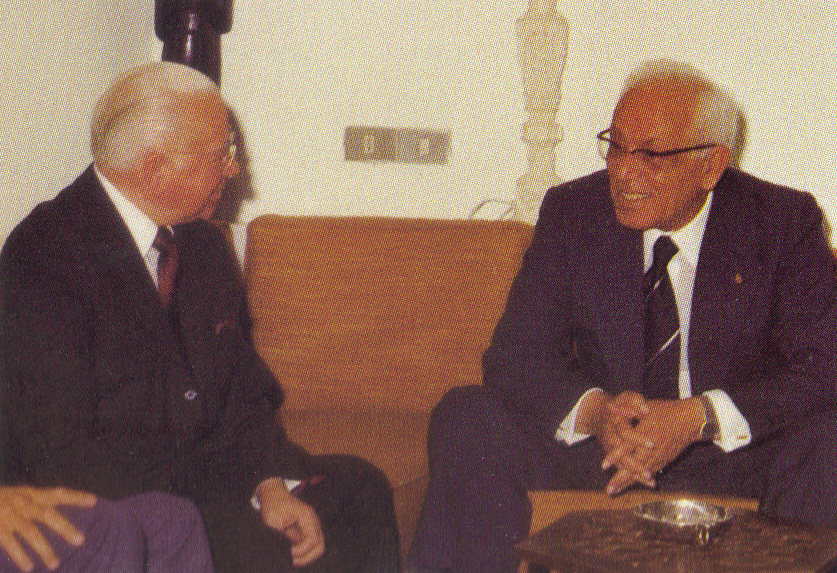
With President Suleiman Franjieh of Lebanon in 1973
The redwood library and social hall on the expansive campus of Ambassador College, Big Sandy Texas
Mr. Armstrong, even iin his late years, attended commencement excercises at the Pasadena campus whenever he was at headquarters
Addressing a luncheon in Bankok Thailand, after being presented the royal Thai decoration of Commander Of Our Most Nobel Order Of The Crown Of Thailand
The royal Thai decoration of Commander Of Our Most Nobel Order Of The Crown Of Thailand
Thialand's Prime Minister Prem Tinsulanonda personaly congratulates Mr. armstrong for the royal Thia decoration conferred on behalf of His Majesty King Bhumibol Adulyadej
Mr. armstrong addresses an audience of more than 4,500 in Manila, at the Convention Center, in his ninetieth year.
Speaking before the Rotary Club in Manila.
The Presidential Merit Medal bestowed in 1983 by the Philippine President
HWA being received at 10 Downing Street by Prime Minister Thatcher
Charles, Prince of Wales, greets Mr. armstrong as a benefactor of the Royal Opera House in London
Symbolic tree planting at the Jomo Kenyatta School of Agriculture and Technology, a school partially funded by the ambassador International Cultural Foundation and Japanese friends. Kenya has a population explosion and its leaders, since independence, have had to focus on the countries agriculture and forestry needs.
President Moi of Kenya receives HWA in November, 1982
His Majesty King Juan Carios of Spain receives HWA on the King's estate outside Madrid
King Hussein of Jordan, a longtime friend
Touring the Bunyat Special Education Center in Amman, Jordan
Chapter 67
Touring Europe by Car
MRS. ARMSTRONG, our son Richard David and I returned by air to London from our Middle East tour Friday, May 25, 1956.
Before leaving London on this tour of the Bible lands, arrangements had been completed for holding a two-weeks' speaking engagement at Dennison House, a hall in London's downtown West End near Victoria Station. The office had been left in charge of George Meeker while we were gone. He and the office staff in London had sent out notices of the meetings to those in and near London on our mailing list.
Speaking Campaign in London
Almost two years before, I had engaged a hall and spoken three successive nights in London. So this was the second time for speaking before our radio listeners in London.
Customarily, in earlier years, I had held evangelistic meetings six nights a week for six weeks. But these were not evangelistic meetings -- but rather speaking engagements for the purpose of meeting those who had become regular radio listeners.
Commencement exercises at Pasadena that year were held on Friday, June 1. Our son Garner Ted graduated on that day -- the first commencement at Pasadena I had missed.
Immediately after his graduation in 1956, Ted and his wife, Shirley, flew on over to meet us in London.
Actually, before leaving London on the Middle East tour I had written a letter, to be printed later and mailed to our mailing list for the area, inviting them to these special services. At the time of writing, we did not yet know just where the meetings would be held. I had arranged for our London advertising agency to work out the booking of a suitable hall with Mr. Meeker. Mr. Meeker was to add this information to my letter.
Although I had written this letter in April, before our tour of the Bible lands, it was finally dated May 22, when Mr. Meeker posted it. It was sent only to those radio listeners already on our mailing list. It said: I hope to meet you personally here in London very soon -- and for some of our friends, it will be for the second time. Then the meetings were announced, beginning June 4, for Monday, Tuesday, Thursday, and Friday nights of that week, and Monday through Friday the following week. On the second week, my son Dick spoke one night, and Garner Ted the following night. I did the speaking on all other nights.
Touring Europe
Early Sunday morning, June 17, the five of us -- Dick, Ted and Shirley, Mrs. Armstrong and I -- left in my car, which we had brought over with us on the Queen Mary, for a brief tour of the Continent.
I do not remember all the events of that tour, but we crossed the Channel from Dover to Calais on a ferry, drove on to Paris. Tuesday we drove on to Luxembourg. On the way we examined many scenes of both world wars. Seeing the actual battlefields made the wars seem much more real.
At Luxembourg we visited the radio station, then on to Frankfurt. Mrs. Armstrong, Dick, and I had driven through Germany, and visited Frankfurt am Main in 1954, and Dick had been there in 1952. We were tremendously impressed with the amazing progress in restoration of bombed-out areas, which had devastated most of the city -- and other German cities as well.
When Dick had visited Frankfurt in 1952, people were living in quickly erected temporary little cabins or shacks. They were then rapidly rebuilding their industrial sections, with apparently inspired zeal. Retail stores were operating out of temporarily roofed-over, mostly destroyed business district buildings. Their temporary little wooden cabins were being made neat, with patches of lawn and carefully planted flowers.
When we had visited Frankfurt with Dick in 1954, almost unbelievable progress had been made. The giant factories were then restored and steaming full-blast -- many twenty-four hours a day. The retail business districts were well toward complete restoration, and almost endless blocks of flats and apartment dwellings being rapidly erected. But there still were many whole blocks of stark devastation, as yet uncleared.
But now, in 1956, few vacant blocks remained from war's destruction. Work was rapidly nearing completion in expanding the retail district and residential areas. German cities had made far greater progress at restoration than had London.
Even ten years before, people of other countries were saying Germany would never rise again -- or, as some cautiously admitted, it would take fifty to a hundred years to restore devastated Germany.
We spent a day driving over various parts of Frankfurt. Then on Friday, June 22, we drove on to Munich on the famous German autobahn. Some one of us became careless. The car ran out of fuel. We were out in a wide expanse of country, miles from any town. One of the party remembered passing a petrol station a couple miles back. So, with the car pulled over to the side of the highway, Mrs. Armstrong, Shirley and I waited while Dick and Ted started afoot back along the autobahn.
About an hour later -- actually much sooner than we expected them, they returned in a car which had taken them in, with a can of gasoline.
At Munich we saw the same miraculous restoration -- streets lined with gleaming modern new buildings. On Saturday night we visited the historic beer hall where Hitler's Beer-Hall Putsch started, November 8 and 9, 1923. Actually, this beer hall might be called the site of the beginning of World War II. On November 12, 1923, Hitler was arrested for leading the putsch, and imprisoned at Landsberg. There he wrote Mein Kampf.
We didn't remain long in this beer hall. Hundreds of robust Bavarians were drinking their beer, shouting with deafening, throaty voices, holding their giant beer steins aloft. Mrs. Armstrong wanted to leave immediately. Nevertheless, it was quite an experience.
En Route to Switzerland
Sunday, June 24, we drove on southwest toward Zurich. En route we passed through a corner of Austria -- had lunch at a restaurant in an Austrian town, probably Bregenz. The Bavarian countryside between Munich and the Austrian border was very scenic. We were impressed with the large farm dwellings, where the barns for livestock were part of the same building as the family dwelling. Their system of gathering hay also was something we had not seen before.
Then came a unique experience. We entered and crossed one of the tiniest little countries in the world, Liechtenstein. There was a certain amount of mountainous scenery, and a castle atop a small mountain.
But very soon we entered scenic Switzerland, and, between Liechtenstein and Zurich, one of its most scenic highways. Much of it was along two elongated lakes, the Walensee and the Zurich. There was just enough mountain scenery, combined with the beauty of the lakes, to make it breathtaking and exciting. The higher mountains, of course, are a little farther south. Switzerland undoubtedly offers the most stupendous, breathtaking scenery of any part of the world I have visited -- and I have traveled completely around the world.
We merely spent the night in Zurich. A grand-scale festival was in progress, and we were only able to get our car within about two blocks of our hotel. We had to carry suitcases afoot through the throngs of happy festival participants -- many in native costumes. The gaiety lasted well past midnight. We viewed the excitement from our hotel windows, but finally were able to get some sleep after the noise and din began to subside.
Monday morning we walked up and down the Bahnhofstrasse -- Zurich's main business street, and did some shopping for wristwatches. There I purchased the watch I wore for many years, a Rolex Chronograph. It gave the day of the week, day of the month and was also a stopwatch.
When I purchased this watch, Dick solemnly shook his head in mock dis approval, saying, It's no good, Dad. It doesn't tell what year it is.
By noon on that Monday we arrived at Lucerne in time for lunch.
Then we proceeded along the way of exciting scenery and beautiful lakes to Interlaken, arriving a little late for evening dinner. However, the kitchen staff hurriedly prepared a special meal just for us. Switzerland is just about as famous for its good cooking as it is for its fantastic mountain and lake scenery, its watches, and its trains which always run on time -- you can set your watch by the arrival or departure of a train.
The Spectacular Alps
Next morning, early, we boarded one of the mountain trains which daily transport awestruck crowds up to the top of the spectacular Jungfrau, one of the highest peaks in the Alps. We changed trains twice, as the climbing became steeper, proceeding on a cog railway.
The steep journey winding upward is simply one breathtaking and exciting view after another. Cameras click constantly. Arriving to the top, we found it necessary to purchase specially dark sunglasses. The brilliant sun, reflecting on the glistening white of the snow and glacier is almost blinding to the natural eye on a cloudless day.
We had lunch in the large restaurant at the top -- took the few tunneled side tours, and then started the slow descent on the cog railway. The afternoon was well spent on returning to Interlaken.
Wednesday morning we were back in our car resuming our journey. Retracing our way some little distance, we then proceeded east and south toward Lugano, which Mrs. Armstrong and I had visited in 1947. We passed through some of the most spectacular mountain scenery in the world. Arriving at the famous St. Gotthard Pass, we decided to load our automobile on one of the flatcars which the railroad makes available for that purpose, and ride through the railroad tunnel, rather than drive the car on the winding figure-eight roadway over the mountain.
At Lugano we again contacted and visited Madame Helene Bieber, whom we had gone to Lugano to see in 1947. At that time we had visited Madame Bieber's villa, Heleneum, with a view to its possible purchase for the European branch of Ambassador College. We had envisioned this branch college in Europe even before the opening of the college in Pasadena. We then drove on to Milan, northern metropolis of Italy, for the night.
The next morning, Thursday, after visiting the great cathedral in Milan, we drove on to Genoa, on the beautiful Mediterranean Sea. I had read about Genoa even as a boy. It was exciting to visit it for the first time. We drove around the city a bit, had lunch there, and then proceeded west along the Italian Riviera. I had always heard a great deal about the Riviera. But when one speaks of the Riviera, he is speaking of the French Riviera, farther on west -- especially that bit of coastline from Monte Carlo on past Nice and Cannes.
Bustling Italian Riviera
But we found the Italian Riviera one continuous winding coastline of jam-packed beaches, with a continuous congestion of town after town, and perhaps hundreds of Mediterranean-front hotels. Only these hotels were not the large, elegant, luxury-class hotels of Cannes and Nice, frequented by the rich of the world. The Italian Riviera, we found, was far more densely populated with pleasure-seeking vacationists than that of the French coast. But that was true because it is a much lower-cost type of resort area.
We found going quite slow along this Italian Riviera because of traffic congestion. We reached Monte Carlo by evening, where we had reservations for the night at a hotel.
Next morning, Friday, now the 29th of June, we drove, first, up to the palace of Monaco, which is ruled by Prince Rainier III. He had married the American motion picture actress, Grace Kelly, April 18, just a couple of months before our visit. As we approached the palace, atop a hill, we began to wonder why all visiting sightseers seemed to be staring at us. We learned that, although we were not driving an expensive limousine, such as one would expect royalty to ride in, but just an ordinary car in the Chrysler line, Prince Rainier and Princess Grace drove the same model car we were driving!
Monaco is another of these very tiny nations. Its entire area is only one-half square mile! Its population is around 20,000, and that includes the city of Monte Carlo, a small city of only 9,500 resident citizens. But of course the hotel population of visitors swells that considerably. This little nation is entirely surrounded by France, except for the Mediterranean coast. Yet it has existed as an independent principality for 300 years! This miniature nation has no income tax. But it is one of the world's famed tourist resorts. It derives its government income from gambling at the casino, the sale of postage stamps, the indirect taxation on money spent by tourists, and a tobacco monopoly. This made two of these very little countries we had visited this trip.
As we proceeded west toward Spain, we made brief stops at both Nice and Cannes, which we had never visited before. But we had no inclination to join the playboy vacationers lolling around on the beaches in front of the luxury hotels. We continued on to Marseilles, France, where we had hotel reservations.
One interesting thing I remember about Marseilles. The Harlem Globetrotters professional basketball team was there. We did not attend any performance, although we assumed they probably were giving one. But we had seen them at performances back home. They stage a hilarious performance. The things they can do with a basketball must be seen to be believed.
On Sunday morning, now July 1, we continued our trek along the Mediterranean, entering Spain, and arriving by evening at Barcelona. This was our first visit to Spain. It was necessary to visit Spain because Garner Ted speaks the language fluently. We noticed at once something we had not seen previously, in other countries. Dictator Franco had his armed gendarmes stationed at frequent intervals along the highways.
At Barcelona we were put in one of the finest hotel suites I had ever seen. This was not of our choosing. American Express, London, had arranged all bookings. The bathroom off the room Mrs. Armstrong and I occupied had one of these elaborate sunken Roman baths. But when we checked out on Tuesday morning, the hotel office overcharged us rather outrageously -- completely above the price quoted the travel agency. Protest did no good. This is somewhat of a European custom. But we had the consolation that we had enjoyed exceptional accommodations, at least. Barcelona is a city of about one and one-half million people. We found it interesting, but I do not remember anything worth recording here.
Tuesday was another day of driving. Tuesday night we checked in at the Castelana Hilton Hotel in Madrid. It was a comparatively new hotel. Certain parts of the building were still unfinished. But we learned that certain parts of virtually all buildings in Spain are left unfinished. It seems that once buildings are almost completed -- sufficiently to be occupied -- they simply never do get around to completing them.
Inside Spain
We found Madrid to be an exceptionally beautiful city of two million population. It has broad avenues and boulevards, with beautiful parking alongside, and the streets lined with imposing and beautiful buildings.
Dick had been there before. He had made the acquaintance of a young man of a family of the former nobility -- prior to the Franco regime. This young man had visited Ambassador College in Pasadena, so we had all met him. We spent one enjoyable evening at the home of his widowed mother and two sisters. The mother was an accomplished pianist. They had a grand piano, and she played for us.
The next day, July 4, our American Independence Day, this young man -- I believe his name was Francisco -- arranged for a friend, Juan, to drive us out past the outskirts of the city -- I believe the direction was north or slightly northwest -- to one of the most unusual structural operations I have ever seen. General Franco was secretly building a tremendous cathedral, to become a surprise gift to the Catholic Church. I'm sure there is nothing like it. It begins on the side of a small mountain. Actually this church or cathedral is a gigantic tunnel under the mountain, coming out on the far side of the mountain. As I remember it, it had a ceiling higher than any other room in the world -- and it was unbelievably long. Also, it was being done in magnificent and ornate cathedral style. We drove around the mountain to the rear entrance.
There, on level ground just beyond the far side of the mountain, was a most beautiful building. It was beautiful in its very plain simplicity. It had been built as a monastery, which the Generalissimo had wanted to present as a gift to the monks. But the monks had refused to accept it. It was too fine. The monks have taken a vow of poverty. They seem to feel they must live in surroundings so plain that they are gloomy, depressing, utterly lacking in anything fine and beautiful.
Incidentally, this very experience impressed on me an outstanding difference between Ambassador College and other universities. Between the 6th and 12th centuries, the only colleges in Europe were the cathedral schools and the monastic schools. The monastic schools were colleges for training the monks, usually if not always located in the monasteries. After the founding of the first modern-type university in the 12th century -- the University of Paris -- the monastic tradition seemed to cling to all educational institutions as an inviolable policy. That is the reason classrooms, libraries, study rooms, lecture rooms, halls, in so many colleges and universities have always been so excessively plain, foreboding, gloomy, depressing.
At Ambassador College we strive to create even a physical atmosphere of equality, character and beauty. We find quality and cultural surroundings much more conducive to inspiring education than a bare, colorless, depressing atmosphere.
While shopping in Madrid we strolled into the lobby of one of the luxury European-type hotels. At a cigar-news-souvenir counter, we found a beautiful gaily-dressed Spanish doll of perhaps fourteen or eighteen inches in height. Mrs. Armstrong liked it, and I purchased it for her.
That started a hobby. Mrs. Armstrong continued collecting dressed-up dolls in various countries we have traveled through, usually in the native dress or costume of that country. Her doll collection has been used in elementary schools to help children understand the people of other countries, and how they dress.
The night of July 4 we were unable to sleep until long after midnight. In a hotel court below our window a group of Americans were celebrating Independence Day. The alcohol was flowing, and the voices were not only merry -- they were loud! So even though we were far from America, there was a 4th of July celebration going on!
On Thursday, July 5, we started driving back north. We reached San Sebastian, in northern Spain on the Atlantic and near the French border, for lunch, and spent the night at the French town of Poitiers. We stopped off at Versailles on the way in to Paris.
The next day we were spending a quiet day in our hotel suite.
Chapter 68
Purchasing Ambassador Hall
OUR OVERSEAS TOUR of 1956 had been a long and eventful one. From Paris, we drove our car back to London -- crossing the Channel, Calais to Dover, by ferry.
At the time, we had left George Meeker in charge of the London office. After checking in at the office in London, within a few days we again boarded the Queen Mary for the return voyage to the United States.
The 1956 Return Voyage
All four of the larger British and American trans-Atlantic ships conduct table-tennis tournaments during the crossing. On most voyages I have noticed there are no real expert table-tennis players on board. But on this particular crossing there were four or five who were fairly good -- among them the former Maureen Connolly, nicknamed Little Mo, three times women's world champion lawn tennis player -- usually ranked with Helen Wills as one of the best women tennis players of all time. Maureen was rather good at table tennis, although not of the topflight championship class she had been at lawn tennis.
As I remember, our younger son played her during the tournament, but neither he nor I remember now who won. Garner Ted had been, nine or ten years earlier, a rather good table tennis player.
Before sailing from Southampton, Dick had sold his Hillman-Minx car, receiving almost as much for it as he had paid new two years before.
Arriving in New York, Dick purchased a new Mercedes -- one of the smaller models -- and drove it back to California. Garner Ted and his wife Shirley, anxious to get back to their children, flew home from New York. And Mrs. Armstrong and I drove our car -- which we had taken with us to Europe -- across the country. That left Mrs. Armstrong and me alone for the drive from New York to Pasadena.
I had wanted to drive through the city of my birth, Des Moines, Iowa, especially to see my uncle, Frank Armstrong, who had virtually steered my earlier life, beginning at age eighteen.
Death of My Uncle
Those who have read the Autobiography from the beginning will remember that, at age eighteen, I had put myself through a vocational-guidance analysis, and decided I belonged in the advertising profession. My Uncle Frank was the leading advertising man of the state of Iowa, and naturally I went to him for counsel and guidance. After moving to Oregon, in 1924, I had seen very little of my uncle -- especially after my conversion and my being drawn into the ministry -- except on rare occasions when I happened to be in Des Moines.
I felt that, since he was now past eighty, this might be my last opportunity to see him.
But, arriving in Des Moines, I telephoned his office and learned that he had died while Mrs. Armstrong and I had been in the Middle East on this same trip. So it already was too late.
However, I felt I should at least telephone my aunt, now widowed. But she did not care to see me. She had been very cordial to me during the advertising days -- whenever I was in Des Moines. But her cordiality cooled noticeably after I had entered the ministry. Now, I was dis appointed to learn, it had chilled completely. I hung up the receiver, deeply dis appointed.
Thous ands who will be reading these words have learned this same thing by experience. When God really gets hold of one's life -- when that life becomes changed by the indwelling of God's Holy Spirit -- one's contacts, friends, and especially relatives will often chill decisively. A certain underlying hostility will be sensed, if not openly displayed. Actually it is not the converted human they resent. It is the living Jesus Christ -- now living His life within the converted one, who is the real object of the hostility. However, the carnal mind does not realize or understand this phase of its own working.
I felt intense sorrow and dis appointment over my aunt's cold and blunt statement that she did not care to see me. She said, icily, she had never approved of my religion. I had always been very deeply grateful to my uncle for his advice and counsel. It had become a long-standing feeling of affection. Some day, in a resurrection, her eyes will open. I think she will be quite astounded when they are opened to the TRUTH.
A Fabulous Property Offered
While we were in London on this 1956 tour, before leaving for the Middle East, I received a trans-Atlantic telephone call from Mr. Meredith at Pasadena headquarters. It was near midnight in London -- but shortly before 5 p.m. in Pasadena.
He asked me whether I felt the college would like to acquire the estate of multimillionaire Hulett C. Merritt. One other 200-foot-wide property stood between this estate and the Ambassador College campus -- as it then was. This Merritt property was considered the most fabulous in Pasadena. The mansion on it, built in 1905-1908, had cost $1,100,000 at that time. Several years ago an architect told me that the place could not have been built for six million then -- IF the rare woods and materials could be obtained -- which they couldn't.
The question came like a bolt out of the blue. I had always considered this fabulous property as utterly inaccessible for us. Extending the campus in that direction had not been considered in our future planning.
Mr. Merritt had died before I had left Pasadena on this tour. His wife had died previously. Mr. Meredith explained that the executor of the estate was going to put it on the market, but first, privately, it was being offered to us through an insurance and real estate broker and his associates.
This broker had an offer to purchase the estate for less money than the ornamental iron fence around the Orange Grove Boulevard front of it would cost today. His proposition was that he and associates would purchase the estate at this low figure, and then donate the property to the college.
It appeared they had privately checked with some Internal Revenue people as to whether they could deduct this donation on their income taxes for something like a half million dollars. Apparently they felt assured they could. They could purchase it for less than half of that.
How Would We Use It?
My mind was doing some fast thinking. One doesn't turn down such a gift without consideration. But how would we use it?
Could you gain access to the place yet tonight? I asked. Mr. Meredith said they could. All right, I replied. I want you and Dr. Hoeh to go over there immediately. Go completely through the building. List how many rooms could be used as classrooms -- and send me a telegram stating how many rooms could seat sixty-five or more students, how many fifty or more, how many thirty-five or more. Your telegram should be here by the time I wake up in the morning. Then I'll give my decision. I wouldn't want to accept this property unless we need it for actual college purposes -- otherwise we'd have to pay taxes we can't afford for something we couldn't use.
The telegram was waiting for me on arising next morning. The ornate and fabulous building would be ideally suited to become our chief classroom building of the college.
I telegraphed the decision: Accept it. Plain Truth Grows
While we were on this Middle East tour, the April issue of The Plain Truth came out an enlarged magazine, and with a new front cover. This had been planned before leaving Pasadena.
Only once before, a special issue announcing the new Ambassador College, January, 1947, had The Plain Truth appeared with a front cover. It merely had a masthead, with the lead article beginning on the front cover. This April, 1956, number also went up to twenty-four pages. At the time this seemed a big leap forward. It had contained only sixteen pages previously. But the twenty-four pages was small compared to today's thirty-two pages, including cover. It was still black and white -- no color printing. But it was advancing, improving, growing!
From Cairo we had a long-distance telephone talk with the Pasadena office about the Merritt property, the purchase of which had hit a snag. The heirs -- all grandchildren -- had rejected the price tentatively agreed to between the executor and our prospective donors. They insisted the place be sold at auction, thinking it would bring a higher price.
Returning to Pasadena, I found the broker and his associates had bought the property at the auction. They had made the high bid, which was only slightly more than their original purchase offer. However, it seemed their funds were not immediately available, and our office had loaned them $5,000 to bind their bid.
Saving Ambassador Hall
The auction purchase terms had been one half down, with the balance spread over some seven or eight years. The due date for the balance of the one-half down payment had come due, but our prospective donors still had not had the funds available. They had obtained a thirty-day extension.
I contacted these people. They assured me the money would be available by the final extended due date. A week before that date I contacted the broker again by telephone. He was positively reassuring. Two days before the deadline date I was becoming quite concerned.
My associates and I will be in Pasadena with the money day after tomorrow, he said, positively, over the telephone. Everything has worked out all right. Don't worry about it.
I had told him that, having gone this far, I did not want to lose this valuable property. It had totally changed our general master-planning for the campus. I told him that, if his people were going to come up short, I wanted time to raise the money myself, rather than lose it.
The crucial day arrived. Our would-be donors were on hand, but the necessary funds were not. They had flunked out completely.
I went to the executor, who had been Mr. Merritt's business manager. I asked another thirty-day extension to allow time for me to raise the money.
Ten-Day Margin
But this matter is in probate court, he said, and another thirty-day delay in meeting the obligation would undoubtedly cancel out this purchase, and open the property up to another auction. Some of the people building these multiple-family garden apartments along the boulevard now regret they didn't bid higher. In another auction they would bid up as high as necessary to acquire this property. They realize now that it went for too low a bid.
Nevertheless, he called his attorney. The attorney agreed with his opinion, but felt they might give me a ten-day extension.
I was under pressure, but we managed it. I had an offer of a $20,000 loan from a loyal co-worker, and I had borrowed $30,000 at the bank, neither of which, on the tenth day, I needed. I did accept the $30,000 bank loan, however, and then left it on deposit at the bank to improve our credit standing. It was worth paying the interest.
And so the fabulous Merritt property, which had been named Villa Merritt Olivier, became ours, and was renamed Ambassador Hall.
New Academic Center
To leap far ahead of this chronicle of events for a moment, two exceedingly beautiful ultramodern new classroom buildings were later built flanking Ambassador Hall and the formal Italian sunken garden, with a magnificent plaza in the center, joining the three buildings and the Italian garden into an outstanding academic center. One of the new buildings is our Science Hall, the other the Fine Arts Building. The entire grouping was named in memory of my wife of fifty years, the Loma D. Armstrong Academic Center. An oil portrait of her now hangs in the grand hall of Ambassador Hall.
Escrow at the bank on the purchase of the Ambassador Hall property finally closed October 29, 1956. The 4-acre estate was then ours.
Manor Del Mar Acquired
Meanwhile, we had ourselves negotiated another important purchase of former Merritt property through the executor of the estate. This fine property, a block to the south of the campus as it then existed, had been the three-story mansion of Lewis J. Merritt, father of Hulett C. Merritt. This property, too, was obtained at a very low price and on very favorable terms. An extensive remodeling job was undertaken at once, and two large rooms were added. This property was named Manor Del Mar, since it was located on Del Mar Boulevard, which forms the south boundary of the campus as it is today. Manor Del Mar became our number one men's student residence.
After returning from the European trip, my elder son, Richard David, joined Roderick C. Meredith in a long-planned evangelistic series of meetings at Fresno, California, with splendid success.
Dick Needed a Wife
Dick had spent many months -- including most of two dreary, lonesome winters -- alone in London. Those of us in the family, as well as students and faculty, had somehow neglected writing him most of the time. Dick had come to feel the desperate need of a wife. He was now twenty-eight. It just seemed that the right girl had never come along.
Meanwhile there was a young married man from Iowa here attending college classes. His wife was very pretty. Mrs. Armstrong had become fond of her. This woman had a younger sister, attending university in Omaha. Mrs. Armstrong had heard glowing reports on the younger sister, Lois Lemon, and had shown a picture of her to Dick.
Sensing his mother's interest in the girl from Omaha, Dick immediately set up a prejudice against her in his mind. Much as he felt the need of a wife, Dick was not going to let his mother select her for him. But meanwhile Mrs. Armstrong and Miss Lemon's sister were doing their best by letters to interest Lois in the advantages of Ambassador College.
Would GOD Select a Wife?
During the two years previous to this time I had had a number of talks with Dick about the matter of marriage. I had counselled him to simply put this problem in God's hands, and rely on God to bring him and the right girl together. I had urged him not to rush blindly into any romance.
Even before I had been converted -- had come to really know God, His truth and His ways -- in my carnal-minded days I had somehow realized that God had given me my wife. I did not pick her out. Even before conversion I did pray occasionally. Everything about those prayers, however, was selfish -- except one thing: I always thanked God for giving me my wife!
Dick always agreed with me that he should leave it in God's hands. He asked me to pray that God would work it out in the right way. I knew that he had asked others to pray for this same solution. But, even though Dick was willing to have God provide his wife, he was not willing to have his mother pick her out. This, of course, was only human nature at work. Most any other young man would react the same way.
While Dick was on his field assignment, in southern Texas that winter, Lois arrived on campus, and registered to attend classes beginning the second semester. Mrs. Armstrong just could not resist calling Dick long distance.
Now wait a moment, Loma, I said to her. If you want to talk to Dick a while, go ahead and call him. I'd like to talk to him, too. But whatever you do, DON'T say one word about Lois being here. You'll only drive him the other way if you do.
Prejudice Aroused
Mrs. Armstrong partially heeded my advice. But not altogether! She just would not resist mentioning, in a tone supposed to be very nonchalant, casual, disinterested, and incidental, By the way, Lois Lemon is here, and has registered for classes.
That did it! She didn't sound one whit casual or incidental to Dick. When Dick returned to campus a few weeks later, he avoided Lois as though she were poison.
It seemed that everyone on campus sensed romance in the air between Dick and Lois, as soon as Lois arrived. It seemed just like a natural to everyone. Naturally, Lois had sensed this from talking to the girls. This set Lois against Dick just as positively as he had set his mind against her.
My Advice
So they went around, each determined to avoid the other.
After about two weeks, I called Dick to my office. Dick, I said, years ago when I had been reduced to the depths of financial depression, just after my conversion, I had prayed earnestly for God to provide me with a new overcoat -- among other things. We then lived in Portland, Oregon. It was in January, and cold. I needed an overcoat seriously, so I asked God for it. The next day I stopped at my brother's office a moment. He noticed the big hole in the side of my overcoat.
'Herb,' he said, 'you need a new overcoat. Today is the 20th of January, and Meier Frank have a sale on overcoats. Anything I charge on my charge account beginning today will not be billed until March 1. I'll have until March 10 to pay and keep my credit good. Go over and select an overcoat, and during noon-hour I'll come over and have it charged on my account.'
But I resisted immediately. It would be rather humiliating to have my younger brother buy me an overcoat.
'Oh NO, Russ,' I said, 'I couldn't let you do that!' And just at that instant it flashed to my mind, almost as if God Himself were speaking and saying, 'Didn't you ask me for a new overcoat? And now you don't want to take it THE WAY I am giving it to you!'
So instantly, I continued, to Dick, I changed my mind and told Russell I would do as he said. And now, Dick, didn't you pray and ask God to send you the right wife of HIS choice? And didn't you ask me to pray for it, too -- and even several others? And here you are, when everyone on campus seems to just know that Lois is the answer to that prayer, you are avoiding her like the plague!
Just Two Dates Only?
Now I don't want to intervene in your most personal problems, Dick, or try to pick out your wife for you. But I do say that after you asked God about this, and have prayed about it so long, you are acting rather foolishly to completely and coldly avoid Lois altogether. Now all that I'm going to ask you, Dick, is this: I ask you to get a date with Lois -- just once. IF this is God's doing, give it a CHANCE! Then don't date her again for a week -- but a week later, have just one more date with her. Then if you're satisfied she is not God's answer to your prayers, DON'T EVER DATE HER AGAIN! Now how about it?
Dick grinned. O.K., Dad, he said rather sheepishly. I'll do as you say.
That same evening Dick had a date with Lois. But he did NOT do as I said, fully. He did not wait a whole week for the next date. Their next date was the very next night! And for the next few weeks they were seen together quite frequently.
One day in March, Dick and Lois came to Mrs. Armstrong and me, hand-in-hand.
Dad and Mom, said Dick, we've got something to tell you! Of course, we knew what it was! We're going to be married, Dick announced. Later he told me what had happened. That afternoon they had gone for a talk in Dick's car. Suddenly Dick pulled over to the side of the road, and stopped the car.
Lois, he said, I can't stand this any longer. I've been fighting this, trying to steel my mind against liking you, and trying to resist it -- but I can't resist it any longer. I know I'm in love with you!
And he said that Lois then said she had been fighting against him in the same way -- and she couldn't resist it any longer, either.
So then they drove straight to tell Dick's mother and me they were going to be married.
The Happy Wedding
I performed the ceremony, as I had for our other three children, on June 11, 1957, in the outdoor garden theater on the Ambassador College campus, with a reception at our home afterward.
Dick and Lois took a honeymoon trip up to Oregon, the scene of his early boyhood. Meanwhile I had given them a little help in purchasing a small but very nice new home, which was ready for them on their return. Their marriage lasted just a little more than a year -- when it was suddenly and unexpectedly cut off by Dick's untimely death resulting from an automobile crash while Dick was out on a baptizing tour.
But they lived a rather full lifetime in that one year. And Dick left behind a little three-month-old son, Richard David II.
Chapter 69
Ambassador College Expands
ISN'T IT strange? -- when one tries to remember past events, one's memory seems so much sharper in recalling events of childhood and early adulthood, than in remembering events of ten years ago.
I have not yet come to the year, in this Autobiography, of my mother's death. She lived to the ripe and happy old age of ninety-five and a half. But in her last years she was becoming noticeably more forgetful. She would ask a question, hear and plainly understand the answer -- and then a little later ask the same question. Her mind simply did not retain the knowledge as well as formerly. She had a good mind. That is just the way of all flesh!
Consequently, I am having to question many people -- younger people of sharper memory -- to help me remember events of sufficient interest to record, from 1957 to the present.
Actually, as I write, I am now trying to remember the happenings that were taking place while I was writing the earlier chapters of this serial. The first installment of the Autobiography appeared in September, 1957!
Perhaps I should have been writing about what was then happening while it was happening. That, of course, never occurred to me. I had no idea, when I started this story of my life, I would still be writing it many years later. Actually, I think I vaguely envisioned it lasting for perhaps ten or twelve installments. But the response showed readership interest, and I began filling in more details.
The Campus Expands
Through 1956 and 1957 the Ambassador College campus in Pasadena began expanding with increasing momentum.
During the lifetime of multimillionaire Hulett C. Merritt, we had envisioned our campus as occupying the area beginning on the north with Mayfair, and the half-block dead-end street of Mentoria Court, and south to Del Mar Boulevard. As I mentioned earlier, the idea of Mr. Merritt's fabulous mansion ever becoming a part of the college simply had never occurred to me.
But with the acquisition of his property in 1956, our whole concept of the future campus was altered. Immediately on acquiring this superb property, we conferred with city officials for a use permit for a change of occupancy. Changing the mansion from a private dwelling into a college classroom building brought it under a different code.
We were required to install a fire sprinkler system throughout. Mr. Merritt had built a penthouse on the flat-roofed central portion of the building, with an elevator running from the basement to the penthouse. We were required to remove the penthouse, or come under a different code applying to three-story buildings that would have necessitated excessively expensive alterations. We were required also to seal off the elevator so it could not be used.
A Real Scare
Next, the city inspectors threw us a real scare. There is a code which requires all public buildings to be reinforced against earthquakes. Pasadena is almost directly over the famous San Andreas Fault. It is earthquake country. Since Mr. Merritt had built his mansion long before this code was introduced it was naturally assumed the building had not been constructed to conform to this strict code. It was going to cost a fortune to add this reinforcing -- if indeed it could be done. We faced the possibility of having to demolish the building and build another, or give up using the property altogether.
City inspectors made a series of tests. They bored through the outside walls at certain points, and looked into the interior walls. We had good news. They found the building had been constructed far beyond code requirements.
Our relief was only temporary. Next, inspectors said the mortar used fifty years ago would not conform to present standards. Once again we had good news. Tests showed the mortar equal to or superior to present standards. Next, they insisted on testing the bricks -- but they, too, met all required standards.
Finally, in December, 1956, city engineers approved classroom usage of the building. But that did not mean we could start holding classes then. The sprinkler system had to be installed -- a major plumbing operation requiring several months. There was serious question about the ornate dual winding staircases. They did not conform to code for our new use. On this point we argued strenuously. To remove those staircases would destroy the beauty of the building. Finally, city officials agreed to let them remain, provided we build a new outside stairway on the west portico. The pillows on that half-circle portico had to come down -- more earthquake regulations. A rear staircase had to be taken out.
For several months work was proceeding to put the newly named Ambassador Hall into condition for classroom usage. My elder son Dick set up his office in one of the future second-floor classrooms. One or two other men set up temporary offices in other rooms. This usage, of course, was permissible while the work on the building was in progress.
Certain other remodeling had to be done -- like providing adequate restrooms, refinishing much of the fabulous wood paneling, certain painting, a complete remodeling of the rear first floor wing into home economics labs. It was finally more than two years after acquiring the property that it became our finest classroom building. It was first opened to classes with the opening of the 1958-59 school year, early September, 1958.
It had been a lot of work, accompanied by anxiety and suspense -- but it was worth it. Few institutions have a building so elegant, and with such magnificent grounds. Actually we had a multimillion-dollar property acquired for less money than the ornate iron fence around the South Orange Grove Boulevard front would cost today. It had come to us for a very small fraction of its actual value.
Our entire concept of the future campus was now greatly altered. We knew the campus eventually would have to include the four-block area from Green Street on the north to Del Mar Boulevard on the south -- and from millionaire row South Orange Grove Boulevard on the west down to the Union Pacific railroad tracks on the east -- a twelve-square-block area.
Earlier we made mention of the acquirement of Manor Del Mar, our finest men's student residence. This had been the mansion of Lewis J. Merritt, father of Hulett C. Merritt. It also was built with rare and beautiful wood paneling. It also had spacious grounds and a sunken garden. Here also we were required to install a fire sprinkler system throughout. This fine property, also, had come to us at an exceedingly low price -- actually a fraction of its present value.
New Office Building
From this time, we were in the process of gradual acquisition of additional properties within our ultimate campus area.
Next, by donation, the college acquired a two-story building on the northwest corner of Vernon and Camden Streets, one block east of Ambassador Hall. This building had housed the Jensen's Furniture Store.
Meanwhile we had completely outgrown our circulation and mailing department quarters, and our little printing shop. These departments had occupied the ground floor of our administration building. I have explained before that this building, part of the original initial property purchase, had been built as horse stables, with servants' living quarters on the second floor. Later the large center room on the ground floor had been converted into a four-car garage, with servants' living rooms on each side of it. We converted the larger center room into our main work room, for mailing list files, and mailing room; and the rear rooms into one room for our printing department.
We then operated two small Davidson duplicating machines as presses. We printed all of our booklets on these. Type was set by an outside firm. We had the small hand-lever paper cutter, and the small folding machine we had brought from Eugene, Oregon, also in this small printing shop.
After remodeling the Jensen's Furniture building to our needs, we moved the printing shop into the rear part of it, and the circulation and mailing department into the front portion of the ground floor. This more than doubled our floor space for these operations. But the work was growing -- at the average rate of thirty percent increase each year. It wasn't long until we had to partition off the second floor into rooms and offices, and expand these departments into that.
In January, 1958, when we moved into this building, we installed two small-size Miehle presses. But to us, then, after some years with the little Davidson duplicating machines, these seemed like great giant presses! Yes, they made us realize THE WORK WAS GROWING!
1957, 1958 and 1959 were years of gradual expansion and growth on the Pasadena campus.
Neighbor Heckling
As the campus little by little expanded, with occasional additional property purchases, we found ourselves in a situation of trying to operate a liberal arts college with neighbors living next door, across the street, and sprinkled here and there in between us.
Ambassador students always have been exceedingly well-behaved. We were making every effort to keep noises down, and to avoid disturbing neighbors. I'm sure we did a more than creditable job at this. Nevertheless, our student body was growing every year.
Careful and courteous and considerate as our students tried to be, a few neighbors became irritated at times.
Once the students were putting on a short play in the Tempietto, which forms the stage or platform for our garden theater, in what we have called the Lower Gardens. Two elderly ladies living across the street called the police. Soon a police car drove up. The officers only grinned when they saw what was going on, asked us to do our best to keep noises at a minimum, and asked if they could stay for a while and see part of the show. They explained that even though they disliked to interfere, when a complaint came in they had to investigate.
A short time after that we were having an afternoon wedding in the garden theater. There have been many of these, since. I looked across the street, and sure enough the two elderly ladies were sitting on their front porches. Ah-ha! Were we going to have the police called out to stop the wedding?
Just before time for the wedding ceremony, while guests were beginning to arrive, I walked across the street, smiling, and asked the two ladies if they would honor the young couple by attending the wedding. I have always noticed that women never outgrow their interest in romances of young people and weddings. The ladies graciously accepted, and I escorted them across the street, and ushered them into seats. They could not have seen any of it, otherwise, because our garden theater is secluded by high trees and thick shrubbery along the street side.
These ladies became very friendly and never again raised any objection to any student activities.
Chapter 70
Tragedy Strikes Richard D. Armstrong
BY January, 1958, the World Tomorrow program was being broadcast over every inhabited continent on earth. We were using more than four million watts of radio power every week. We were broadcasting from Okinawa, from Mozambique into the Republic of South Africa, and into India, over into Burma and the East Indies, and into Eastern Africa by the three superpower beams of Radio Ceylon, besides Radio Luxembourg, world's most powerful station in Europe -- and beamed over the British Isles.
These were very powerful stations -- reaching out as far as 2,000 miles, covering vast areas. With our coverage in South America, we were reaching out over areas containing approximately half of the entire world's population.
Of course I do not mean that that many people actually tuned in and listened to the broadcast -- but that many could, if they all owned radio sets and tuned in to hear it. Actually, our estimate was that some four or five million actually did hear the program during an average week of broadcasting. But that's a vast audience!
But we knew well that we were only barely started! The BIG growth was yet before us! By September of that year -- 1958 -- another million watts of radio power per week had been added.
Most significant among the new doors of radio being opened to The World Tomorrow was the powerful KGO, San Francisco. This is one of the few AA-class 50-thous and-watt radio stations on the West Coast that was heard clearly up and down the Pacific coast from Alaska to Mexico. We were given a good time, seven nights a week. Also newly added by that September were such valuable stations as WPIT, Pittsburgh; KGBX, Springfield, Missouri; and KWJJ, Portland, Oregon.
Also, by October, that year, The Plain Truth had been increased to thirty-two pages. It had been printed in two colors since February, 1957. With the November, 1958, number we began publishing, serially, the Bible Story book written and illustrated by Basil Wolverton. By that time, the circulation of The Plain Truth had gone up to 175,000 copies.
During the early part of summer, 1958, Mrs. Armstrong and I had driven once more back up to Oregon, for a period of fasting and rest on one of the Oregon beaches. Dick was left in command at headquarters. In more ways than one he showed excellent executive ability and good judgment.
We returned to Pasadena after two or three weeks. It was along about this time that two significant events -- occurrences that would seem incredible to many -- directly involved Dick. One, the birth of a baby. It was a most serious breech birth. The situation was becoming desperate, and since Dick was the ranking minister then at headquarters, he was called in on the emergency. He drove immediately to the home where the baby was being delivered. The doctor and the nurse were near exhaustion -- perhaps more of hope than physical -- and the mother near physical exhaustion. Of course all Dick could do was pray but pray he did, and in faith. He kept reassuring the others but the situation was fast becoming hopeless.
Finally the doctor gave up hope, said there was nothing he could do, unless to take the baby by cesarean section, which the family refused to allow. The doctor went home. The husband and the wife were counseled by Dick not to become frantic or to lose hope but to rely on God. Dick refused to lose faith. He continued to pray. And finally his faith was rewarded. The fetus turned over in the womb. The doctor was called back, and the baby was born in a normal manner.
The other incident, more amazing, involved a war veteran. He was paralyzed in his back, in his legs and both arms -- helpless. He had to be moved in a wheelchair. The military hospitals had done everything for him that medical science could do. It was an incurable case. He was confined to helplessness for life, and put on a life pension for special financial support.
This man called for Dick to pray for him and ask God to perform a miracle, that he might be restored to a life of usefulness.
This was one of Dick's last acts. He did go to this man, and following the New Testament instruction in James 5:14-15, anointed him with oil, and laid hands on him as he prayed, asking the Eternal Creator to do what man was unable to do, and had pronounced impossible to be done.
This man, a former Yale football player, was healed, and quickly restored to the full use of arms and legs and his whole body. He entered Ambassador College, and soon was climbing up and down ladders painting buildings.
The Last Baptizing Tour
It was shortly after this incident that Dick was off, with an assistant, on a baptizing tour up the Pacific coast. A number of people had sent in written requests for counsel with a minister, and for baptism.
At the time I was using, for an office, a very small room in what we called the penthouse atop the library building. The room was so small that I was having to use a small woman's boudoir table for a desk -- an ordinary business desk was too large for the room.
I shall never forget, of course, how Dick came briskly running up the stairs to say good-bye.
Well Dad, he said with cheerful enthusiasm, I'm off on this trip.
A few days later his companion, Mr. Alton Billingsley, called me on the telephone.
Tragedy Strikes
Mr. Armstrong, he said in a voice that signaled even before his words that something was very wrong, We've had a terrible accident, and Dick is in very critical condition.
Quickly I asked for all of the facts. The accident had occurred a short distance north of San Luis Obispo, which is about halfway between Los Angeles and San Francisco, on the Coast Highway. It had been a head-on collision. Both our men had been thrown completely out of the car. The right third of our car had been virtually sliced clear off. Dick had been sitting in the right front seat -- often called the death seat -- and had he not quickly moved to the left he would have been killed instantly.
As I learned later, they were driving north on the Coast Highway 101, after having baptized a man that morning. As Mr. Billingsley was driving, Dick had opened his briefcase and was checking his list of people to visit planning their next few stops. They had been on a dual highway -- one way traffic only on each side of a divided highway, with a short space in between. The divided highway had ended but somehow neither of them had noticed it. A half block or so to their left was another paved road running parallel to theirs, which Mr. Billingsley noticed, supposing it to be the other two lanes of the divided highway.
Assuming that they were still on the divided highway with only one-way traffic on their two lanes, they were driving on the left lane to pass another car. Suddenly, from over a slight hilltop, came another car in their lane heading directly toward them. At this precise second they were almost past the car on their right -- but not far enough to turn right in front of it in order to miss the oncoming car in their lane. There was no time for that, anyway.
Dick shouted, Turn left! Turn left! Mr. Billingsley had only a fraction of a second to turn partly to the left. There was not enough time to turn out of the way of the oncoming car. Two cars, for example, speeding toward one another at fifty miles an hour or more, seeing each other about 150 feet away, will crash into each other in less than one second!
The oncoming car hit them head-on, its right side striking our men's car slightly to the right of center, and Dick's car crashed the oncoming car into the third car that our men were then passing. It was a three-car crash!
But I didn't wait for all these details then. I got the essential details, and I was off in a flash for San Luis Obispo. Dick had been unconscious, and taken in an ambulance to a hospital in San Luis Obispo.
I had our switchboard telephone operator call our college physician, Dr. Ralph E. Merrill, asking him to be ready as I would be driving past his office in Glendale, on the way to San Luis Obispo. I asked Mr. Norman Smith, our radio studio manager, to go with me. Dr. Merrill was ready as we drove past. I drove as fast as I dared, consistent with safety.
Right then I was terribly aware of the DANGER of highway driving, and although I wanted to make the fastest time possible, caution and care in driving came first. It was a strenuous drive of approximately 200 miles.
Arriving at the hospital, we found that Dick had been transferred to another hospital -- there were two hospitals in this little city.
We found him now conscious, but in very critical condition. His right arm was broken at the elbow; his pelvis had been broken badly, and they had him in traction. His jaw had been broken in three or four places; X-rays showed that his heart had been knocked over to the right -- to the middle or slightly right of the middle of his chest; his left lung had been collapsed. Mr. Billingsley had been examined, and released -- not sufficiently injured to remain in the hospital.
Dick wanted to rely on God for healing, without medical aid. The doctors asked for a conference with me and Dr. Merrill. They explained that Dick was already in their care and to protect their reputation and that of the hospital, they had to administer medical aid or else have him moved, in which case he probably would die before we could get him home.
Dr. Merrill, who himself had been healed by direct prayer, and understood both sides of this problem, advised us against moving him in his very critical condition. The hospital doctors agreed to give him the very minimum of medical aid consistent with their own and the hospital's protection. I learned later, however, that in practice that meant giving him everything medicine knew how to give. It was a very difficult decision to make -- but with so many bones broken it certainly seemed that we would be directly causing his death to move him out of the traction and other trappings and contraptions that they had him in.
Then followed one of the most tense, strenuous week's vigil of my life. I telephoned my wife, and she with Lois, Dick's wife, and their two and one half month old son came to San Luis Obispo on the train. Of course Mr. Smith and I had anointed and prayed for Dick immediately. It was a week of almost constant prayer.
Registered nurses were required to be in constant attendance around the clock. We had one R.N. as they are called in hospitals, at the college and another had applied for entrance to Ambassador College that autumn. By telephone, I arranged for these two to come immediately to the hospital, and the hospital supplied the third nurse. We preferred to have our own nurses at his side so far as possible.
It was too agonizing a week to go into in detail. Dr. Merrill had to return to Glendale, but the rest of us remained in the hotel in San Luis Obispo, to be in as constant attendance as possible.
The accident occurred on July 23, 1958. By evening of July 29, a very serious decision had to be made. Dick's kidneys were not functioning enough to keep him alive much longer. The doctors at San Luis Obispo had called specialists from UCLA Medical Center to come up for consultation. They told me that it would be necessary to attempt to remove Dick to the medical center in Westwood (Los Angeles) where they could use an artificial kidney to stimulate normal action by his own kidneys. By carrying him suspended in traction on the special kind of pallet bed that he was strapped on, driving slowly in an ambulance through the night, they felt that they could successfully move him to the Los Angeles medical center. Our two nurses and one or more of their doctors went along in the ambulance. Also, Mr. Norman Smith, who had remained the week with me, went along with them.
We tried to get a little sleep through part of that night, rising and leaving about 5 a.m. for Los Angeles. We felt we should arrive not too much later than the ambulance, since it was to drive very slowly.
During the week, Dick had had various ones of us read the Bible to him. In spite of the pain, and the terrible condition, he kept in good spirits. Once, in prayer, he began thanking God for the many, many blessings that had been lavished on him. The nurse in attendance said that this continued a long time -- he had so very MANY things to be thankful for.
I had typed out a number of biblical PROMISES that God had made for us, from various parts of the Bible, for our nurses to read to Dick in the ambulance when he was awake.
As we approached the Los Angeles area on the morning of June 30, strange premonitions seemed to come into my mind. I didn't tell the others. I didn't want to cause them any concern, worry, or lack of faith. This I had to fight out within my own mind, by prayer and mental concentration. Finally, it seemed that I had won a victory over these premonitions and I had gotten my mind again into a state of FAITH.
We drove into the UCLA Medical Center parking lot. We left the others in the car while Lois and I went to see Dick or to get a report on his condition. As we approached the entrance, Mr. Smith and our two nurses approached us, with the news that just before they could get the artificial kidney connected, Dick had died.
There were present some of the most famous surgeons and specialists in the nation. They cut Dick open near the heart and tried to massage his heart back into action -- they tried frantically everything that such specialists know, but to no avail.
Dick's body was then sent to a mortuary in Pasadena. It hit Lois as if she had been shot. I grabbed her, steadied her.
Steady, Lois, I said as calmly as I could. Remember you have another very precious little life to nurse and keep alive, now. You must keep calm so that your milk will not be disturbed.
Lois responded bravely, like a trouper. Then we discussed how to break the news to Mrs. Armstrong. We tried to break it gently so it wouldn't come as too much of a shock. We tried to keep normal composure.
They've taken Dick back to Pasadena, I said, trying to be casual as if everything was OK. But no one ever could mislead my wife. She almost fainted -- for she knew that we were only trying to ease the blow. But, she always was a real trouper too, and she quickly recovered without going to pieces -- though naturally wounded to the very depths.
Chapter 71
25th Anniversary
IT was an agonizing week for Lois, his mother and me. No one, of course, but a mother, can describe or fully appreciate a mother's love for her son. But fathers love their sons, too. And my affection for Richard David had been greatly deepened by the special circumstances under which he had been born.
My Time of Trial
It is, of course, natural for every father to want a son. When our first child was a girl I was not dis appointed. Few fathers would be. Nor was I dis appointed when our second child was another daughter. But when the ranking most famous obstetrical specialist in the world, in a Chicago hospital pulling my wife through a near-fatal mid-pregnancy toxemia eclampsia, with 30 percent albumin in the urine, warned us gravely that she could never undergo another pregnancy without fatal results to her and the child, I was dis appointed beyond words to describe. I had to resign myself to a sonless life.
And this medical pronouncement was confirmed by two other doctors.
We didn't know, then. And I'm not sure these doctors knew, the real REASON. Apparently not too much was understood, at that time, by the medical profession about this negative-positive RH blood-factor condition. But my wife and I were opposites in that regard.
I had been forced to resign myself to a future without possibility of ever having a son.
Then, eight years later, in Portland, Oregon, Mrs. Armstrong had been -- as recounted earlier -- suddenly, completely healed of several serious complications by a positive miracle resulting from believing prayer. We knew then, by faith, that whatever had been the disturbing factor to render another pregnancy fatal, had been removed by this healing.
I knew then that God would give me a son. And ever since I felt that the day Richard David was born was the happiest day of my life.
I was perfectly satisfied, then. God had blessed me with a son. He had been conceived less than a year after my conversion.
But the great God had plans I did not know. I was perfectly satisfied with the one son. We did not plan to have another. A year and four months later, Garner Ted was born -- and I then felt doubly blessed -- with TWO sons.
But when God took from me -- or allowed to be taken -- my firstborn son, on July 30, 1958 -- less than three months before his thirtieth birthday -- well, it seemed that I could have some little understanding of how Abraham must have felt when he expected to have to give up his son Isaac -- or even God the Father of all, in giving His Son Jesus Christ for ME as well as for the world.
The Ordeal
Dick's death occurred early Wednesday morning, July 30, 1958. The accident had occurred the preceding Wednesday morning. The funeral was set for Friday, August 1. The day in between, Thursday July 31, Mrs. Armstrong and I shared a very sorrowful 41st wedding anniversary.
On Wednesday we conferred with Messrs. Roderick Meredith, Herman Hoeh and Norman Smith regarding funeral arrangements. They felt unanimously that it was my duty to officiate at the funeral, which we planned for a simple graveside service only. Through the day I drove in my car to inspect cemeteries -- which I had not had occasion to do before in Pasadena. I do not now remember whether Mrs. Armstrong and Lois went along. Necessary arrangements were completed. Lois accompanied us to the mortuary to select the casket -- selecting one in the type of wood Lois said was Dick's favorite.
To say that my comparatively brief graveside sermon was an ordeal would be a gross understatement. I had learned, many years before, in conducting many funerals, to steel my nerves and remain calm, with controlled emotions. But speaking at Dick's funeral was altogether different. I found myself speaking in a louder, more concentrated voice than usual in a supreme effort to prevent emotional loss of control.
I remember quoting a portion of Lincoln's Gettysburg Address, regarding the duty of those of us remaining to carry on the great work to which God had called us.
My first impulse was to remain away from the Saturday afternoon college church service. I didn't want to see anybody. Nor did Mrs. Armstrong. But then I realized it was my duty to attend.
I thought of entering at the last moment, and sitting in the front row before any could speak to me or offer condolences. But then I realized that some of the students had erroneously assumed that ministers were under such divine protection that no such tragedy could occur to one of them. Dick's accident and death might shatter this faith. I knew I had to bring a message that would bolster and strengthen, not destroy, faith.
These experiences were perhaps the most severe test I had ever been called on to experience. But of course I knew where to go for strength, wisdom, and help.
We Travel to Springfield
Lois' parents had come for the funeral. She and they planned for them to stay on a while with her, in the home she and Dick had purchased new just over a year before. Lois felt that perhaps, with her parents in the house, she might adjust to remaining there without Dick.
I had assisted Dick and Lois with the down payment for the purchase of the property, and it probably was still less than half paid off. But Dick had been thoughtful in providing insurance which paid off the property in full. He also had provided insurance for Lois. And there was an additional $15,000 due Lois from group insurance carried by the College.
However, the few days of attempts at adjusting to living in the house without Dick had convinced Lois, by that weekend, that she could not live there alone.
Mrs. Armstrong, Lois and I planned a trip to get away from the trauma-shock we had undergone. I had learned that nothing is so quieting and relaxing to distraught nerves as a long trip on a train. So we planned a trip to Springfield, Missouri, to meet Ted and be with him for the final service of his evangelistic campaign. The death of Dick had caught Ted in a campaign he could not leave at the time.
We left almost immediately, taking either the Chief, or the Super-Chief of the Santa Fe Railroad as far as Kansas City, changing there for a train to Springfield. Little Dicky -- Richard David II -- was carried in a sort of crib basket.
It did Ted and his wife a great deal of good to have us with them in Springfield. He, too, had undergone a most severe ordeal.
After a few days there, we journeyed on down to the location in Texas that later became the third campus of Ambassador College. We were then building there, of comparatively inexpensive all-steel construction, what we believed to be the largest church auditorium in Texas, as a tabernacle for an annual 8-day festival or convention -- seating 8,000.
After a day or two there, we journeyed on back to Pasadena. Soon we were engrossed in the many responsibilities of carrying on the work to which the living Christ had called us.
We had, shortly before this, acquired the mansion of Mediterranean architectural design located between Mayfair (girls' student residence), and Ambassador Hall. We had done a certain amount of remodelling to convert this property into another girls' residence on campus -- renamed Terrace Villa.
Since Lois felt she could not endure living alone in the home she had shared for a year with Dick, we converted one wing of the ground floor of Terrace Villa into an apartment for her and little Dicky.
This proved to be the best solution possible for Lois. She was on campus, where there was much activity. Many other girls were under the same roof, though she had the privacy of her own apartment. Also, she was abundantly supplied with baby-sitters whenever needed.
Frequently, from that time, during the next few years, we all dreamed occasionally about Dick. It often seemed, in my dreams, as if he had come back from the dead and was living again -- as indeed he shall -- and in the not too distant future.
Surprise Banquet
On Sunday, January 4, 1959, Ted and Shirley called at our home for Mrs. Armstrong and me. They had arranged a few days before that we four should go to a restaurant for dinner that evening -- since it was the 25th anniversary of The World Tomorrow.
It was midwinter and they were wearing coats. We didn't notice that they were in evening dress. After driving a couple of blocks Ted suddenly said:
Oh, by the way, Dad and Mom, I wonder if you'd mind stopping off at Ambassador Hall first. We've plenty of time, and Shirl hasn't seen the big new chandelier we just installed in the Grand Hall. I'd like to show it to her. Would you mind?
Of course we didn't mind. Entering fabulous Ambassador Hall, we found it all dark which was natural on a Sunday evening. I switched on the lights in the Grand Hall. Shirley was thrilled. For a few moments we four stood admiring the ornate chandelier of Czechoslovakian crystal. Then Ted suggested we have a look at the new crystal ceiling light fixtures installed, at the same time, in the Rosewood Room. When the doors to the Rosewood Room were opened, a mystified Mr. and Mrs. Armstrong were bewildered. For there seemed to be many obscure and shadowy figures in the very dim, partially candlelit room.
The lights suddenly flashed on, to the shouts of SURPRISE! coming from seventy voices.
All -- except Mrs. Armstrong and me -- were in evening dress, sitting around beautifully decorated banquet tables forming one large U shape filling the large room. Huge floral arrangements of red and white carnations decorated the immaculate linen-covered tables gleaming with sparkling crystal, china, and silverware.
Accompanied by enthusiastic applause, Ted and Shirley escorted Mrs. Armstrong and me to the head table. There, for all guests to see, a red and silver banner at the base of the large floral arrangement read: 25TH ANNIVERSARY.
Student waiters appeared in full dress, and began serving a banquet of superb cuisine, probably prepared by girls in the Home Economics class. Then I glanced over the room to recognize the guests. There were all the ministers so far at the time ordained and their wives (except two who were in England); all faculty members of Ambassador College and wives of male members; intimate personal friends of Mrs. Armstrong and myself who had been associated with the work since the early days; and those business and professional men, who were closely associated in a business or professional way with the work, and their wives.
Perhaps the keynote of the banquet was the playing of a recorded Memory Tape, prepared by Mr. Norman Smith, director of our radio studio. It recounted, through loudspeakers, by means of re-recording old recordings, even back in the electrical transcription days, many memories of the early days of the broadcast back in Eugene, Oregon. There was a running commentary, tracing the history of The World Tomorrow, outlining the beginning and progress of the Plain Truth magazine. We were vividly reminded of the days in 1934 and 1935, in the stuffy little windowless office, devoid of ventilation. In that little room many mimeographed editions of The Plain Truth were edited and printed.
Mrs. Helen Starkey, who had been our first employee in that unventilated office, was present with her husband, and at my request she rose to relate a few personal experiences of those days.
At Ted's request, I rose to give our guests (or was not I -- with Mrs. Armstrong -- the guest?) a glimpse of the happenings of those days.
Highlight of the Banquet
Perhaps the highlight of the Memory Tape was the reproduction of a portion of a World Tomorrow broadcast, in which the listening audience had been taken to Paris, where Dick cut in with our first on-the-spot broadcast, along the Champs Elysées, reporting the military display of the Bastille Day parade.
But the highlight of the entire evening was a presentation to Mrs. Armstrong and me of a most unusual and superb gift, commemorating a quarter century of broadcasting. Garner Ted read the presentation. He said:
No anniversary would be complete without a gift. But a gift presents a serious problem. Mr. Armstrong has repeatedly said Mrs. Armstrong was fully 50 percent of his ministry. She has been with him through much of the actual programming during the last twenty-five years. No run-of-the-mill gift would do. And so, in selecting an APPROPRIATE gift for the occasion, I found the article I wanted could not possibly be purchased on such short notice, not even at the finest jewelry stores, silversmiths, or trophy makers on the Pacific coast.
I found it would have to be MADE, by silversmiths in San Francisco. And so I had to decide whether to have a gift to present to Mr. and Mrs. Armstrong TONIGHT, or to sacrifice presenting it tonight in order to have a wonderful memento specially created by master craftsmen as a permanent, lasting memorial of this first Sunday of 1959, the twenty-fifth anniversary of the World Tomorrow broadcast.
I decided in favor of the QUALITY, instead of the time. And so, it gives me great pleasure to make this special presentation to Mr. and Mrs. Herbert W. Armstrong.
As a lasting memorial of this twenty-fifth anniversary celebration, we are having made, by silversmiths in San Francisco, a beautiful desk set. The thick, long base is to be one solid piece of specially rolled and carved sterling silver! Beautifully matching pens will be specially made by the Sheaffer Company, and they'll also be of sterling silver! They'll repose in sterling pen holders, on each end of the base. In the center, a specially cast, hand-engraved miniature microphone, also of solid sterling, will stand beside a hand-finished miniature solid sterling silver world!
In the center, immediately in front of the mike and the world, a gold inscription plate will read: 'To Mr. and Mrs. Herbert W. Armstrong. In deep and lasting gratitude for unselfish service as instruments in the hands of God through twenty-five years of radio broadcasting.'
Chapter 72
Providential Acquisition of English Campus
NOW WE come to the year 1959. The office my son Dick had opened in London had expanded as far as it could expand. It then occupied the entire floor of an office building in downtown London.
However, the office building occupied but small ground area, and each floor consisted of only three office rooms, beside corridor and lift (elevator to Americans).
When Garner Ted and I boarded an SAS (Scandinavian Airlines System) polar-flight DC-7 plane at Los Angeles International Airport, in early June, 1959, we had no idea whatsoever of establishing another liberal arts college campus in England. Our purpose was to find larger office quarters.
We did have in mind combining new and enlarged office space with an altogether different kind of college. We felt it might be advis able to open a small college for men only, of various races and nationalities. The idea of such a college was to make it primarily a college for training men either as ministers or for religious service among various races and countries, as the broadcast and The Plain Truth developed need.
We arrived in Copenhagen about 3 o'clock in the morning. It was already becoming daylight -- because Copenhagen is far north where the days are very long in summer and very short in winter.
There was some mix-up in our hotel reservations. I think we were to go to one hotel, and learn there what hotel our travel agent had booked for us. Anyway, I remember that after an hour or two waiting in the lobby of the hotel to which our taxi first took us, we transferred to another hotel several blocks away.
First Ship Radio Station
This was our first visit to one of the Scandinavian countries. We took this flight, stopping first at Copenhagen, because we wanted to contact the first radio station that we had heard of operating offshore from a ship. The offices of this station were in Copenhagen. Also, we wanted the thrill of a polar flight, and, as I remember, only this SAS flight from Los Angeles to Copenhagen was then operative as a polar flight. Flying on the prejet prop plane, it was much slower than today's jets.
I was not able to contact the manager of the station, who was out of town. However, I did contact him later by telephone. Nothing definite came of it at the time, but it did open to our investigation the idea of broadcasting from offshore ship stations, to countries where no radio time can be purchased or used by The World Tomorrow.
We enjoyed a day in Copenhagen, and then flew on to Cologne, Germany. We carried with us a portable Ampex tape recorder. In fact it was the first of the Ampex 600 models -- I believe ours was the first set from the factory. This was the first portable tape recorder that was of professional broadcast quality, so that programs recorded on it would be acceptable for broadcast by the largest, most discriminating radio stations.
At Cologne, in our hotel room, I recorded a program, which I wanted to do from inside Germany.
German Enthusiasm for Work
We were much impressed by the phenomenal progress the Germans had made since our last visit, in recovering from the war. Now factories and downtown business blocks and stores and offices not only had been rebuilt, and residence apartments constructed, but we noticed a much finer, more expensive quality of merchandise displayed in store windows.
Cologne suffered one of the worst beatings by Allied bombing of any city -- 80 percent to 90 percent destroyed. In all their cities, the Germans rebuilt first their factories and industrial and production facilities. People lived in temporary shacks or small temporary houses. They kept them neat, planted roses, flowers, shrubs for beauty outside working hours. Stores operated, at first, from bombed-out wreckage or any temporary kind of quarters.
Production came first, not fine living. In 1956 and 1958 I was awakened frequently in hotel rooms by Germans walking briskly to work about 5 or 5:30 a.m., yodelling or singing lustily. While the English, supposedly the victors of the Second World War, lolled around, came to tea and took an occasional work-break, the Germans worked with enthusiasm, vigor and PURPOSE.
Today the whole world sees the RESULT. I talk a good deal about CAUSE and EFFECT. Every condition is the RESULT of a CAUSE. If Britain has gone down economically, no longer a world power, virtually bankrupt today, there has been a CAUSE. The English, in their proud and stubborn attitude, have refused to acknowledge the CAUSE they were producing. Now they are down, and, as an important nation in the world, OUT! They have toppled the bars of moral restraint. They have gone in for laziness, indolence, gambling, and haughty, stubborn indifference. They are beginning now to really reap what they have been sowing!
The British have written a lesson they still refuse to learn or admit.
But, every visit we made to Germany, we noticed the CAUSE of a dynamic economic upsurge -- hard work, industry, vigor, PURPOSE. They have purposed to come back. They are once again beginning to shout: Deutschland über alles!
Office Hunting in London
From Cologne Garner Ted and I flew on over to London. There, Raymond McNair, in charge of the work in Britain and Europe, and our business manager of the London office had been searching for a larger, more suitable office space prior to our arrival, hoping to have a few desirable selections for our decision. This time we wanted office space in a building where additional office rooms could be leased as our needs expanded.
But up to that point their efforts had not been very rewarding. Most of those they had inspected were not suitable, or worth showing to us. They did have three or four, one of which they termed the least of the evils. After looking them over, we agreed with their apprais al.
One we inspected was a three-story, old, badly maintained apartment building. We supposed it could be used for the kind of college we had in mind -- for a small number -- perhaps not over thirty-five -- men of different races. They could live in the apartment rooms, mostly very small, and the one or two lounge rooms might be enlarged by tearing out a few partitions and doing a remodeling job. These might be used as offices and classrooms. But the place was of third-rate quality, old, ill-kept -- and, the PRICE was too high.
It was very discouraging. Lastly, they showed us the least of the evils. It had once been a mansion, or home of very good quality, three stories, and a block and a half north of Regent's Park. It was fairly close to the downtown business section. The location was good. It occupied a lot of about seventy-five or eighty-five feet width. But it, too, had been neglected, poorly maintained. Of course we knew we could give it a going-over. It could provide sufficient office space, and perhaps we could use it for our small, limited-size college of the type we then had in mind.
And Then -- Out of the Blue!
We had spent two or three days looking. Mr. McNair had spent several days looking prior to our arrival. It began to seem like we were going to have to settle for this least of the evils. It could be bought, and on terms we could handle. But we were not a bit happy over the idea.
Mr. McNair had entered Ambassador College in October, 1948, in the second year of its existence. He had always been a steady, balanced, persistent plugger -- never quitting -- never giving up. He didn't give up, now. He continued to telephone estate agents.
Then, suddenly one of these agents suggested something he didn't suppose we would be interested in -- but he ventured to suggest it; a place just outside Greater London, north by northwest, in the Green Belt. It was a fairly large house, larger than the least of the evils. It had a few acres of grounds.
Could you handle the office work from a location that far out? I asked.
Yes, said Mr. McNair, I think we could if the place were otherwise satisfactory.
Why don't we go out and have a look at it yet this evening? I suggested.
It was arranged. Finally, after we had gotten completely out of London, we had to drive down a lane, and then a still narrower, winding, twisting lane. It didn't raise our anticipations. But then, we were getting used to dis appointments.
Finally we turned in to the place. There was a sign, Hanstead House. I don't know why, but that name sounded very unattractive to me.
Then suddenly we came to the iron gates in front of the mansion. It was like turning suddenly from the back-alleys of discouragement and dilapidated dis appointments into a millionaire's beautiful mansion and grounds!
This place, too, had been neglected for two years. Weeds were hip-high. But the house looked proud and majestic. We could not see in very well -- it was almost dark -- but what we could see appeared to be in reasonably good condition inside. The building was of stone and stucco. It had a very attractive and fairly impressive entrance. There was, on the south side, what appeared to have been an expanse of lawn -- now high in weeds. But on either side of that weed-grown lawn were rows of the most beautiful and stately cedars of Lebanon we had ever seen.
We were a little excited. This began to look promising! I want to see the inside of this mansion, I said. Can you arrange for us to come back tomorrow morning, with the agent, to let us inside?
We'll stop by his home on the way back to the hotel and try to arrange it, Mr. McNair responded. It was arranged for complete inspection at 10 next morning.
This time two others of our staff went along. And we planned to arrive at 9:30, to go carefully over the grounds and talk it over privately among ourselves before the agent arrived.
When we arrived, in full daylight, all four of us were tremendously impressed. We began walking around. I noticed three large urns in what appeared to have been a garden in front of the front entrance -- one a very large and costly urn. Then we discovered that there was an aviary. We discovered a little brook running down what appeared to have been a very fine and costly garden. At least I noticed, among the weeds, several plants I knew to be very fine and expensive shrubs.
We also had noticed that there was an informal English sunken garden on the east side of the mansion, and there were four large greenhouses.
We didn't know, then, that there was such a beautiful formal garden on the west front, the most magnificent rose garden we had ever seen, and a very exotic Japanese garden through which the little brook ran -- these were so thickly covered with weeds we did not discover them.
The young men began to shout. Almost in unison, we all exclaimed, This is PROVIDENTIAL! This means God wants another full LIBERAL ARTS coed college in England, just like the one in Pasadena! It was like a sudden realization -- a KNOWING -- a recognizing of the divine guidance and intervening to show us HIS will!
The other fellows were shouting for joy. Hey, pipe down! I said. Not so loud! If that estate agent arrives and hears you fellows, the price will double! Besides, we haven't bought it yet, and we don't know whether we can!
There was not really any doubt in our minds, though. It was like recognizing a revelation straight from God. We KNEW this meant we were to establish a college in England. NOT the kind of college we had in mind. The kind we now recognized GOD had in mind.
This may seem preposterous to some readers, I know. But we are engaged in God's work. We have learned how God works. It was like God had flashed a message straight from heaven like a sudden bolt of lightning.
Here was a college campus, already there! We knew that, for this purpose, we would need additional buildings, for administration offices, for dormitories, perhaps for additional class and lecture rooms. We knew, too, that in the Green Belt it would be almost impossible to obtain a building permit to erect additional new buildings.
But on this place we noticed there were quite a number of very superb horse stables, cow barns, and even a building for an electric generating plant. We felt sure we could obtain a permit to REMODEL those existing buildings suitable for our usage.
Of course we knew there were many problems to hurdle. We had, first, to see whether the county authorities would grant us a change of occupancy permit to operate a college at that location. And there was the rather BIG matter of negotiating for the purchase -- and whether we would be able.
When we inspected the inside we saw that this Hanstead House, as it was then named, was a very ornate building of fine quality -- comparable in quality and size to Ambassador Hall on our Pasadena Campus. Ambassador Hall is the former Hulett C. Merritt mansion and estate, the most fabulous place in Pasadena. Ambassador Hall had come to us virtually as a gift. When we saw the ornate interior of Hanstead House, we began to have misgivings. Perhaps we would find the price completely beyond our reach.
Beside, the estate agent's office had intimated that TWA was considering the purchase of the property to be used as a school for stewardesses.
Yet, this mansion, with these outstanding gardens, the aviary, greenhouses, cedars of Lebanon, all finally came to us for £8,000 ($22,800) -- the not uncommon price of a five- or six-room cottage on a forty- or fifty-foot lot in America, -- and that on terms that gave us several years to pay.
[Editor's note: The events of the year 1959 in the life of Herbert W. Armstrong were written for The Plain Truth in the year 1968, some nine months after the death of Loma D. Armstrong. Mr. Armstrong chose not to continue his autobiography serially in the magazine. However, during the years that followed he continued to write up his remarkable experiences and to expound new truths as they came to him. The publishers have therefore gathered together and edited his public letters, together with certain editorials in The Plain Truth. So here, in Herbert W. Armstrong's own words, are the highlights of the nearly twenty-seven remaining years of his life that concluded on the morning of January 16, 1986 -- when he fell asleep in death in his wife's favorite chair.]
Chapter 73
June 29, 1959 -- May 22, 1963 Monte Carlo June 29, 1959
Dear Co-Workers with Christ:
We spent a very busy ten days in London. We planned for having the British and overseas edition of The Plain Truth printed hereafter in London. Until now we have shipped the printed copies by air freight ....
Also plans were made for establishing a second Ambassador College in Britain, beginning September next year, 1960. God opened to us one of England's fine, spacious country estates. Until the owner died a year ago, this was the home of one of England's wealthiest titled ladies -- Lady Yule. It is one of the most recently built of such estates -- built in 1924, and in superb condition. Originally this estate comprised over 800 acres. When wealthy titled people die in Britain today, the inheritance taxes take almost everything, and their heirs (Lady Yule left no children) are forced to sell the property in order to pay the taxes. In this case, the estate has been subdivided into many smaller farms, and most of it sold, except for the fine big mansion, with its eight acres of beautifully landscaped lawns, rose gardens, etc., and a two-acre plot containing brick housing units for the former employed staff, the fine brick stables, garages, etc. These will make student housing, as also will servants' quarters in one large wing of the mansion. They had no difficulty selling off small farm plots, and even near-by guest cottages. But in England today nobody could buy such a mansion to live in, and it could only be sold for a college, hospital, or some such institution. The result was, having been unable to sell it in a whole year, the price was reduced to a small fraction of what it cost to build. We obtained it for less than we paid for any of our college buildings in Pasadena, though this is larger than any of them, and even finer than any except Ambassador Hall. It came to us with a small payment now, a large part of which was paid by our British Co-Workers, and except for small payments which I think British Co-Workers can fully pay, no more to be paid for a year, when we establish the college. This also provides adequate office space for our fast-expanding London office. Our London office manager told me the saving in office rent will more than pay for this fine property.
Thus God has providentially opened to us a superb, magnificently landscaped ten-acre college campus, only five miles from the edge of London, walking distance from suburban train, with a fine, stately, thirty-three-room college building, with ample class rooms, and offices and mailing rooms -- and without putting any financial burden on our United States and worldwide work from Pasadena headquarters!
Co-Workers, the way God continues to bless His Work and to lead the way just fills me with awe, with gratitude, and almost chokes me with emotion! Constantly Christ shows us that He is in this great Work -- guiding it -- blessing it! What a privilege for us to have a part in it -- to be co-workers with Christ Himself!
I hope it fills your heart with joy and thanksgiving, too, as it does mine -- and inspires you to pray harder for this great work -- to sacrifice more so you can give more if you have not already done that, as I know many of you have -- but far from all!
I am typing this letter in Monte Carlo, and will airmail it to Pasadena, where it will be reprinted and mailed on to you! I hope to be back home before you receive this, or a day or so after.
New York, November 4, 1960
Dear Friend:
I have just completed my first trip around the world! I have thrilling and important news for you. I have come up to the offices of our New York advertising agency to type this letter to you, during a stopover of a few hours between planes. I must fly on across the Atlantic Ocean again tonight, arriving at London airport tomorrow morning at 7 a.m. Mrs. Armstrong is there, and I expect her to meet me at the airport.
Our New York advertising agency is responsible for opening up time for The World Tomorrow on overseas radio stations outside the United States, around the world. Constantly more and more powerful stations are opening their doors for broadcasting the World Tomorrow message on five continents around the world.
I have had to be in England most of the time since June, preparing for the opening of the second Ambassador College. The founding and starting of a new college is a gigantic task. It seems a thous and and one things have to be thought of, planned provided, put into operation. The new college did open on schedule October 14.
Developments on the other side of the world, in Australia, made necessary a hurriedly planned flight to Sydney, Australia. The president of our New York advertising agency flew to London, where I joined him, and together we flew on to Sydney, and then on around the world -- all in something like two and a half days' actual flying time! ...
I was very much surprised, recently, to learn that only a very small percentage of all people have ever flown in an airplane. I used to say that I would never fly unless I absolutely had to, in God's Work -- and then I would trust God to protect me. The time finally came when, nineteen years ago, I had to fly from Seattle to Portland. I had broadcast the program on Sunday morning from the studios of a Seattle station, and had to be in the studios of the Portland station for the broadcast a very few hours later. The only way I could get there on time was to fly.
Half-way along that first flight of mine, the captain came through the cabin, speaking very quietly in the ear of each passenger the tremendous news he had just heard over the plane's radio that the Japanese were bombing Pearl Harbor -- the United States was at war! That, of course, was Sunday, December 7, 1941. You can understand why I shall never forget my first flight in the air! ...
I have had to do a great deal of flying these past nineteen years. These big 707 jets have been in service only about two years, and already I have lost track of the number of times I have flown on them. But this was my first trip around the world -- and the first time I have ever taken time or space to tell you about it.
I did not look forward to this trip with any eagerness. Mrs. Armstrong does not like to fly, and of course could not come along on a trip of this great length and short time, anyway. My entire trip around the world, with six days in Australia, three in Pasadena, and one in Texas, is less than two weeks. I put off this trip as long as I could ....
We flew straight through from London to Sydney -- almost half way around the world -- on the same plane. There were forty-five-minute fuel stops made at Rome, at Cairo, Egypt -- flying over the very path of the great Exodus under Moses, and close to Mount Sinai -- then Karachi in West Pakistan on the west border of India. We stopped again at Calcutta after crossing India, then southeast to Bangkok, on down to Singapore, then clear down to Darwin, Australia, then across that continent and landing at Sydney about 7 a.m. in rain and a gust of wind. Our office staff there now numbers ten, seven of whom have been sent over from Ambassador College ....
During the six days in Sydney, arrangements were made to gradually add thirty-nine additional stations, with daily broadcasting. This will mean we shall cover thoroughly the areas in which about 98 percent of all the people of that continent live.
It seemed very strange on Sunday night as we left Australia to realize we were starting to cross the vast Pacific Ocean. From London we had travelled east and southeast -- always, so it seemed -- travelling farther and farther away from the Pacific. I had left the Pacific Ocean when I last had left Pasadena, and had steadily travelled farther away from it all the way to London. And from there I was still going on east -- and now, all of a sudden, I realized I was way west of Pasadena, instead of east. It really seemed very strange. I had been going constantly farther east of Pasadena, and now here I was west of it! ...
During my brief three days at headquarters in Pasadena, I approved going on our second station in Canada ....
Now I must hasten back out to the international airport, and board one more big 707 jet, on the last leg of this 'round the world journey, to be with my wife and continue supervision, for a while, of the new Ambassador College in England ....
February 16, 1961
Dear Co-Workers with Christ:
We now have to realize it! These are the most trying and crucial days for this great closing Work of God since it began! ...
Now I want to tell you how the living Christ has moved swiftly this past week, in a most thrilling manner, to speed His Work ahead! ...
Kansas City is a very important center where we have had no station at all. There is just one 50,000-watt station there, with coverage reaching over much of Missouri and Kansas and adjoining states -- KCMO. The management there has been consistently adamant against what radio men term commercial religion.
Perhaps most of our Co-Workers do not realize how very difficult it is to induce any of the larger, more powerful, top-prestige stations to open time for The World Tomorrow. In radio circles there is a feeling that all religious programs are commercial religion, broadcasting only for the money they get by begging the public over the air. They object to ordinary religious programming, which is sentimental, emotional, interesting only to a very small segment of religiously inclined people. And 95 percent to 99 percent of the entire listening audience tunes out immediately when such programs come on. The stations cannot sell time to commercial sponsors following the average religious broadcast, because the rating agencies have shown that they have no audience left except a few religious people who will turn immediately to some other religious program.
It's difficult to convince radio station managers that The World Tomorrow is utterly different -- that we speak to, and grip the interest of non-religious people -- the whole public -- that most of our audience is made up of people who seldom, if ever, go to church. Many of the largest and highest-ranking stations have learned that The World Tomorrow attracts a large listening audience of the entire public -- and that we are not commercial and never ask for money on the air, or in any of our free literature. You have no idea how difficult it is to induce radio men to realize the true facts about God's own program!
But on Monday of last week, the manager of KCMO was in Los Angeles, in the offices of the Katz Agency, one of the two or three largest firms of radio and TV station representatives in the country, and who represent KCMO. It was hard for them to believe any religious program could hold a listening audience, and turn over a big audience to the sponsor who follows. They demanded proof.
So they got out the rating reports. First they looked at the KLZ ratings in Denver. They were astonished to find that the rating agency surveys in Colorado showed that The World Tomorrow is rated number one in Denver. We had the largest listening audience of any station. We held our audience the second fifteen minutes. They called up the management of WLAC in Nashville. They found we were the highest rated program. The management there recommended that they accept The World Tomorrow. They found we are the number one rated program on WWVA, according to an extensive Hooper survey.
The manager of KCMO immediately cleared the time of 9:05 to 9:35 p.m., following five minutes' news at 9 p.m. He then called his friend who is manager of KRMG, Tulsa, told him what he had found about our program, urged him to accept the program. KRMG did -- 9:00 p.m. every night.
Getting on KCMO automatically opened up to us our first station in Arizona -- KPHO in Phoenix -- every night of the week at a good time.
That all happened between 10 and 11:30 a.m. Monday morning. Then our advertising agent and the top man in radio sales for the Katz Agency telephoned for a luncheon engagement with me. At 1 p.m. they arrived at the college. They were really excited. Things were happening like miracles! There was some kind of tie-up between these stations and the Storer chain.
This Storer company owns several important 50,000-watt stations. These include KGBS, Los Angeles; WGBS, Miami; and WIBG, Philadelphia. We have succeeded in getting on these three 50,000-watt stations on Sunday only, but so far we had been unable to convince them of the true facts about The World Tomorrow and they had refused to open up time week-nights, which we need seriously in these important areas.
These men explained that the home base original mother station of the Storer group is WSPD, the NBC station at Toledo, Ohio. Although this station is only 5,000 watts, its ratings show it has more than half of the total radio audience in its district. Six or seven other stations in the area divide the rest of the audience.
This station is the key, said its West Coast representative from the Katz Agency. to getting complete every-night time on those three other Storer stations. We called them on the telephone. We can't convince them. We think that if you go over there and talk to them personally, Mr. Armstrong, you may be able to present the facts in a way so they will come to see how different The World Tomorrow is from the kind of religious programs they object to.
He said the management of the Storer stations at Toledo had agreed to listen with an open mind if I came to them -- although they advised against my coming, saying they didn't think there could be any facts that would change them.
But the manager of the West Coast offices of the Katz Agency was now so interested and enthusiastic over the World Tomorrow program that he had agreed to fly back himself with me, and also to have his top radio-sales man go with us. It was arranged for those two men, who are the West Coast representatives of this Toledo station, our advertising agent, and me to fly to Toledo. Tuesday morning we boarded a non-stop jet plane for Chicago, with reservations to fly on to Toledo, Ohio, early the next morning.
At 7:50 next morning we were out at Midway air terminal in Chicago for an 8:30 plane. At 8:10 they marked the plane up as thirty-five minutes late. Then thirty-five minutes later, they posted on the bulletin board an additional hour delay. Meanwhile our advertising manager telephoned the manager of WJJD, a 50,000-watt Chicago station. He is a former partner of our advertising agent, and has been manager at WJJD only about a month. He was very favorable to giving us a good time seven days a week. I was introduced to him on the telephone, and suggested I stay over in Chicago and see him on Thursday (it was now Wednesday morning).
Finally they cancelled out our flight to Toledo altogether, and announced they were sending us by taxi clear across Chicago to O'Hare Field to catch a 12:10 plane on another line. Meanwhile the Katz manager called Toledo, found the station manager was at the airport in Toledo to meet us. So it was arranged for him to meet our later plane.
Well, it seemed everything was going wrong! Arriving at O'Hare Field, our 12:10 plane was marked up thirty minutes late! It was now going to get us to Toledo just one hour and fifteen minutes before we had to board the plane on our return flight -- and it is one hour's drive from the airport to downtown Toledo!
When we stopped off the plane at Toledo, the three top executives of the station were there to meet us. Because of our short time, they arranged for a conference room in a motel across the street.
I had much to tell them, and not much time. We finished our conversation walking through the airport. It was not until we reached the gate to the plane, with its propellers already warming up waiting for us to hurry on board, that final decision came. They accepted The World Tomorrow -- 9 p.m. every night, seven nights a week!
Arriving in Chicago, we dropped off our luggage at our hotel, then had our cab take us on to the large suite of offices of the Katz Agency on Michigan Boulevard. I was introduced to the Chicago manager of the agency. While there the West Coast manager of the Katz Agency called the leading radio station at Spokane, KHQ, long distance. Their manager was in Phoenix, attending a meeting with the manager of KPHO, which had just opened time for us. The KHQ office in Spokane called their manager on another telephone at Phoenix. The KPHO manager recommended that he accept The World Tomorrow. The KHQ manager instructed his office that if his West Coast representative, who was making the call from Chicago, also recommended it, to clear the time 9 to 9:30 p.m., seven nights a week.
Thursday morning the manager of WJJD came to breakfast with us, and then we walked over to the WJJD offices. Two station officials were there waiting for the conference. They seemed friendly. Then the president of the company which owns this station along with a few others walked in. There was no smile on his face. He was decidedly antagonistic. Nothing could budge him. His mind was not open to any facts, other than that the answer was a frigid no!
About noon we met the manager of a 1,000-watt station, while waiting to see the manager of 50,000-watt WCFL (the CFL stands for Chicago Federation of Labor). This station manager shot sharp questions at me about our program. When I mentioned that we tell people how to live to be happy, and that we proclaim the truth of the Bible, he asked: What is Truth? Nobody knows! This whole world is all mixed up. There is nothing but confusion -- especially in religion. He said he himself was confused.
I can straighten you out, I said, if your mind is open, and I can have enough time with you. He was intrigued. Later he called our advertising agent at our hotel, offering to open an early morning time seven days a week. What shall I tell him? asked our advertising agent.
Tell him, I said, that if he will make it a condition of the contract to come out to Pasadena and see our college campus, and spend a little time with me getting straightened out, we will go on his station. He accepted ....
Later we met the manager of WCFL -- only he had just recently resigned. However, he is some kind of a top man in Chicago union circles and very influential. He felt that the station would do whatever he recommended. He spent some little time with me personally. God seemed to give me favor in his sight. He became real friendly -- seemed to really want to help us get on a 50,000-watt Chicago station. Of course we could not get the final answer at the time, for we had to leave for the airport to catch the evening non-stop jet plane for home.
Co-Workers, does this give you a little clearer idea why I need to ask you continually to pray for this work? Without divine intervention we would not be able to get on any of the really major superpower stations. I know that hundreds -- maybe thousands -- of you Co-Workers were praying earnestly for this work the past two weeks. That is why all these miracles happened so suddenly all at once!! Never has anything like this happened before!!
This letter is getting long. But there is still more to tell you! ...
The time has come when we have to open a branch office in Canada. Scores of our Canadian Co-Workers have been unable to deduct on their income taxes the tithes and offerings they send for God's Work, because we have had no office nor recognition in Canada ....
Now, finally -- I have found that when Christ opens vital and necessary radio doors for us, He expects us to walk through those doors! Soon after this work started on the air, in the late fall of 1934, He opened the door of station KXL, then 100 watts, in Portland. The work could have spread within its first year to Portland. But I hesitated. I was afraid to go ahead. Instead, I sent a letter to Co-Workers asking if they would pledge the small amount of money it would cost. Not enough pledges came! We lost our chance. The doors of KXL did not open for us again until some two years later.
When stations important and necessary to this work have opened up to us in later years, and I walked right through the doors Christ opened, in faith, God has always supplied the means. When I hesitated, the money never came!
Co-Workers, God has performed miracles for His Work this past week! I know he expects me to follow where He leads! In faith, I am going ahead! I know you will back me up, and will not let me down! ...
Thank you again, and God will bless you -- because I ask Him to, and He does bless all of us loyally in His Work!
Written from Ambassador College St. Albans, near London May 22, 1963
Dear Co-Workers with Christ:
Again I am writing you from Ambassador College in England. Mrs. Armstrong and I expect to be here for the remainder of the present school year ....
I have written you about our austere year, on which I found it necessary to embark some two months ago. Some of you misunderstood! Let me make it clear! God's Work is not going backward! -- never! The actual gospel work is going forward faster than ever before! We are not making any cuts that would actually slow the Work.
But this is what we are doing! We are cutting every waste effort or unnecessary expenditure we can. We are continuing to add more radio stations -- but, (for this one year) not as rapidly as we had been doing. We are cancelling out some radio stations that have not proved productive and apparently were not being listened to by as many as others.
I did write you two months ago that we had postponed the opening of the third Ambassador [campus], in Texas, for one year. That was because of this austerity year. But we feel that will not slow down the actual proclaiming of the gospel -- as long as it is for only one year. And another reason is that we are simply forced to continue a building program at both Pasadena, and at the college in England -- or else take in no additional students next school year!
Here in England we are now trying to feed one hundred ten students in one ordinary-size family dining room -- designed for only one small family! So we are proceeding right along to complete the new dining hall, which was started last year. We have no place for additional incoming new students to sleep the next school year. So we are continuing the work of remodeling the Clock Horse Stables, converting them into a new dormitory to house one hundred fifty men.
We are having to enlarge our office space, and space for our printing department here, to take care of the constantly increasing mail from listeners requesting literature.
The Work cannot grow unless the colleges continue to turn out an increasing number of graduates every year. This great Work now encompasses the whole world. It now requires the full time work of hundreds of trained men and women. It now reaches millions of people every week -- our estimate is at least twenty-two million!
We are spending no money for just beautifying our college properties that is not absolutely necessary for the functioning of the colleges. Our colleges are outstandingly beautiful because multimillionaires built these fabulous estates that way at their expense. Then these magnificently landscaped properties came to us at a tiny fraction of their original cost.
For example, you could not, today, even buy the fine and imposing iron fence and gates around Ambassador Hall on the Pasadena campus for the price we paid for the whole fabulous estate! ...
But we are certainly not letting these fine properties go to weeds and ruin. God commanded Adam to dress and keep the Garden of Eden, not let it run down and go to weeds. We do work hard to properly maintain what God has seen fit to entrust into our hands. He will hold us accountable for how well we take care of what He gives us!
The building program must go on, or the work cannot grow! Our building program has been costing only a small portion of the total expenditures for God's Work -- between two percent and three percent. It would be penny-wise and pound foolish to cut this off. Rather, we are making big cuts in the two biggest items of expense. This enables us to continue right on with the necessary building program, and still reduce expenses, while at the same time increasing and expanding the work itself! God's Work must continue to grow its normal 30% even during this austere year! This does take careful planning, and sound management! ...
Chapter 74
April 25, 1966 -- December 10, 1968 April 25, 1966
Dear Co-Workers with Christ:
Greetings from Australia: Mrs. Armstrong and I are visiting our offices here in Sydney, Australia -- down under, on the other side of the world where the sun circles around the north on its way to setting in the west.
God's Work is booming here in Australia. It is my wife's first visit here and my first since October, 1960 ....
It has been a tremendous inspiration to Mrs. Armstrong and me to see God's Work booming in rapid growth down here in Australia. While here, I have had conferences with radio station officials in Adelaide, Melbourne and Sydney, and we leave in ten minutes for the airport, flying today to Brisbane. These and other business conferences are resulting in stepping up our program for reaching the people of Australia and New Zealand with Christ's own gospel. Additional radio coverage is opening up. Also arrangements are under way for the purchasing of full-page advertising space in national magazines and metropolitan newspapers. These will carry Christ's dynamic message to hundreds of thousands, and millions, in print.
Many hundreds have been really converted -- their lives turned around and changed -- since I was here last. God is doing a big work here in Australia. What an inspiration it is to realize that the World Tomorrow is heard all over the world.
Let me tell you a rather exciting experience. When I was here in October, 1960, our local manager, a radio station official and I were walking on a wharf to board a ferry when suddenly I heard a sharp, deep bass voice from behind say: Are you Herbert W. Armstrong? Turning, I saw a tall policeman. How did he know my name, way down here in Sydney, Australia? Had I done something wrong?
Well, I want to shake your hand, he said, reaching out his hand. I hear you on the radio, and I recognized your voice as you were talking to this gentleman.
It was really a startling experience. Well, here is the astonishing sequel. I met this man again the other day, with his wife. He has been converted since I was here, baptized by one of our local ministers. And, more! His wife was also baptized just the other day -- since we arrived here -- also by one of our ministers. Mrs. Armstrong and I were overjoyed to meet them both.
I am now finishing this letter from Brisbane, where I am to speak tonight to an audience of a few hundred listeners to The World Tomorrow. I have spoken before good-sized audiences in Melbourne, and several times in Sydney, since we arrived in Australia. Tomorrow I have a luncheon appointment scheduled with the manager of a Brisbane radio station ....
Next Monday we fly on to Hong Kong for two days, to try to make arrangements to put the World Tomorrow program on a station there. Then we must take a very long flight all the way across Asia, to Tel Aviv, Israel. We will spend a few days revisiting historic places in the land of ancient Israel. I am especially anxious to visit again the little synagogue in Nazareth, where Jesus spoke from the book of Isaiah (Luke 4:16-30), and other places. Then from there straight to London, and Ambassador College in England.
This 'round the world' trip is an arduous one. I was afraid it would be very hard on Mrs. Armstrong, but thousands are praying for our safety and pleasant flights for her; and so far, all prayers have been answered. We are very grateful ....
I must hurry now to the auditorium where I am to speak tonight. Remember, the living Christ blesses you for your generous part in His Work.
February 27, 1967
Dear Co-Heir with Christ:
This letter must be brief, and to the point. I had hoped that I would be able to announce, in this letter, the biggest, most important, most sensational leap forward in this Work of God, since it started in 1934!
That's why this letter is two or three days late. But I can't delay longer. And now I must make it short so it may be typed and mailed yet today if possible! I feel sure this very sensational announcement will be ready before the next letter ....
Meantime, dear Co-Workers, I have been under the heaviest cloud for years. My dear wife has been stricken with a serious intestinal condition. For three weeks she has been confined to bed. Everything possible was done, including, of course, anointing her and asking God to heal her. At first we thought it was an attack of appendicitis -- and, under fasting, such an attack will resolve itself naturally within about seven to ten days. But that time passed, and the pain was not in the appendix. In such a condition there are, of course, certain things we humans can and ought to do -- even though we rely on God for the healing. I assure you, that under the best professional advice, everything we could or ought to do was done.
I would like to explain, for your own understanding, that God does for us what we cannot, and ought not, try to do for ourselves. Healing of sickness or disease is something no doctor nor medicine can do. That is why God has promised to heal us. In my ministerial experience over forty years, literally thousands have been healed -- of almost every disease or sickness, including -- cancer and leukemia -- by my prayers, and those of God's ministers in this Work associated with me. Some things we cannot do, and ought leave solely to God. Some He does through us, with certain things we can and should do. Other things we do by ourselves.
But we came to the place where, under medical advice of a doctor who is one of our converts (no longer in active medical practice, but in God's service), the time had come to stand still, and commit it into God's hands. The first two weeks, approximately, she was in great abdominal pain, with cramps, unable to hold anything on her stomach. She did sip water, and take crushed ice into her mouth -- but always her stomach rejected it, and it was thrown up. Then, a week ago, I'm sure God performed one miracle -- I awoke at 6:30 a.m. and was told she had taken about a half glass of homemade grape juice at 4:30, and her stomach had retained it. She has been taking prescribed amounts about every two hours since. For about three days she was able to take small amounts -- two or three teaspoons at a time -- of a beef juice, then her stomach refused it further. We have been able, however, to alternate some fresh carrot juice, and even some gelatin.
This nourishment, during the past week, has given her some added strength, and she has been getting in better rest and sleep, and is much improved in mind and spirits ....
Dear Co-Worker with Christ, this great Work of God is on the very threshold of the greatest leap forward in power and scope in its history. The really big work is yet to be done. God started His Work for this time through my wife. He used her to bring me to Him. God said it is not good for a man to be alone -- and He gave her to me to be my help. She has been my partner -- the other half of this team God called, and has used in building His great Work. As we now face a greatly stepped-up, bigger Work, I need her desperately at my side. God, of course, knows this.
During this ordeal I fasted ten days. I did not fast for her -- because we do not bring God to our terms by suffering and doing penance. I fasted to bring myself closer to God. When that was accomplished I broke the fast. I had been concerned over a heart condition and high blood pressure. I was slowed down in my work. That is now all gone. This heart condition I have felt for some four years is no longer noticeable. I have renewed verve, bounce, energy. God has, in this fasting and prayer, opened my eyes to many things -- changed my entire daily routine, brought me far closer to Him. I am ready, now, for this big leap ahead in this Work ....
April 17, 1967
Dear Co-Worker with Christ:
At last I can give you the one greatest most exciting news announcement in the history of our broadcasting Christ's gospel to the world.
But I am deeply sorry to have to announce, at the same time, that my wife's critical illness has ended in the manner least expected -- in her death just after midnight Saturday morning, April 15. In the next second of her consciousness she will awake in the Resurrection, completely healed -- and, far more than we beseeched God in our earnest prayers, not in the corruptible body of this mortal flesh and blood, but in an immortal spirit body, in glory in God's eternal Kingdom!
Thirty-four years ago, at this same time of year, when my father died having reached his seventieth year, I had to learn that God's promises are absolutely secure -- but not always in the way we expect. For His ways are not our ways. In the Faith Chapter of the Bible, Hebrews 11, speaking of the example of faith set by Abraham, Isaac and Jacob -- the Fathers -- and of Sarah, we read: These all died in faith, not having received the promises, but having seen them afar off, and were persuaded of them, and embraced them ... that they, without us, should not be made perfect. (Heb. 11:13 and 40.)
Had they received the promises by their faith at that time, then you and I would have been left out. But God's promises to them are irrevocably secure! They shall receive them in the resurrection -- and many thousands or millions of us also with them.
God has promised to heal the sick, upon real repentance and faith. But God has not promised how, or when! That, we must leave to Him in faith.
We did fully expect that God would heal her now. True, she was seventy-five and a half years of age. Even King David, who has been rescued from death, and healed from near-death more than once, died in a good old age, full of days, at age seventy. (I Chron. 29:28). In I Kings 1:1, it is stated that King David was old, and stricken with years, just before his death.
God already had given my wife five and a half years more of this life than He gave David. She was just a few months older than I, though part of each year we were the same age, as they are counted. Yet neither of us have felt or acted in any manner like old folks, or elderly people. We never thought of her as being anywhere near seventy!
God had called her, and then me through her. He had chosen us for His Work. He had built His great Work through us, bearing great and rich spiritual fruit. ...
If you'll read John 15, you'll realize that God corrects, prunes, or purges every branch in Christ which is producing fruit -- that they may bring forth more fruit. It is only those bearing none that He cuts off.
This great Work of God not only has produced fruit -- but right now God is opening gigantic new doors for His Work to multiply in power!
In our human thinking, it seemed God would heal her now, that she could continue the remaining few years as my help in the closing years of God's Work preparing the way for Christ's coming, and the Kingdom of God, ushering in the wonderful World Tomorrow! But, we know now, God had intended otherwise ....
To all you who have come to a reawakening through her recent illness, let me plead: Carry on, in this spiritually rejuvenated new life! Never slacken! Never lose courage! Now I need your help more than ever! ...
June 29, 1967
Dear Co-Worker with Christ:
Since I wrote you, a week ago, things have happened fast. Indeed, world events are racing on now at an ever-accelerating clip.
I want to give you a little advance news, which you will read in more detail in my Personal column. Page one, in the July Plain Truth. With this coming number, due off the press in a few days, the circulation has reached, at last, the fabulous plateau of one million copies!
It requires about three full freight carloads (large American size freight cars) of paper! Comparatively few magazines on earth publish a million or more copies! That surely is a new milestone of progress! Read more about it in your next Plain Truth!
Of that one million copies subscribed for -- to be read by probably two and a half million people -- about 2,450,000 of them are noncontributors to God's Work. No one pays for his own subscription, as you know. In addition to receiving The Plain Truth free, these 2,450,000 people who read it have never contributed -- and have never been asked to contribute anything!
In other words, beside helping pay for the World Tomorrow broadcast on radio and television, reaching some forty million people every week, your tithes and freewill offerings are helping me to put The Plain Truth into the hands of nearly two and a half million readers who are not even asked for financial support!
Actually, it is monumental, phenomenal, and virtually incredible, how much every dollar you and I put into God's glorious Work actually accomplishes! I know of no place else where every dollar accomplishes so much good! That is because the living Christ actually heads, directs, and blesses this Work of God! What a privilege He allows you and me to have a part in it -- to be used as His instruments, through whom He works, carrying on God's Work!
One other exciting bit of advance news, which you will read in more detail, in my next Personal editorial.
When I wrote you on May 29, I was en route to London, ticketed for a jet flight from London to Beirut and Jerusalem on June 5. I wrote in that letter, ... it looks right now as if I will not be able to go to Jerusalem at this time. As I wrote you in the general semiannual letter to all Plain Truth subscribers, June 21, I was not able to go. The Israelis took over the old city of Jerusalem, including Jerusalem Radio, belonging to the government of Jordan ....
July 31, 1967
Dear Co-Worker with Christ:
This letter should have been written yesterday. Things are happening so fast these days, and I have so many things on my mind, that I completely overlooked the fact this letter was due.
And here it is, the 31st of July. For me it is a very important day -- a day of mixed emotions. May I be real personal in this letter? ...
Today is a day I had been looking forward to. It was to be the fiftieth wedding anniversary of Mrs. Armstrong and me. But she is no longer here to share it with me.
I could not help, this morning, thinking back fifty years ago today. I was living in Chicago. I had been engaged to marry a girl from Iowa. That very morning I dis appointed her. I arrived late at the railroad depot to meet her. And there she was, a girl who had never before seen such a big city, alone in the metropolis of Chicago! ...
Many young ladies would have ended the engagement then and there. They would have become angry, resentful, unforgiving. Because most young brides are in love, most assuredly -- but with their own selves! Not with the man they are marrying. And most young bridegrooms also are in love -- with their own precious selves!
As soon as the other becomes inconsiderate, or does something, or says something, that steps on the other's toes, the injured one flies into a rage, or becomes sullen and resentful. One thing leads to another, and ultimately to an unhappy marriage -- or divorce!
But this young lady forgave me, and later that same day she became Mrs. Herbert W. Armstrong.
This is not to say that in the virtual fifty years of happy marriage there were never any rough spots, misunderstandings, or hurt feelings. There always are, in every marriage. And unless each one is mindful of that fact -- mindful that each is human and imperfect -- and has enough love for the other to forgive and forget, it would be better to call the whole thing off before the wedding.
Why do most marriages fail? Two reasons. They are not really in love, though of course they think they are. They do not, each, have as much love and concern for the other, as for self. They want the other for what they feel the other means to them. They are on the getting side, not the giving! And when everything ceases to come their way, and the time comes to give, they don't give. And the second reason is part of the first -- carnality!! And carnality is vanity, lust, envy and greed ....
But since I am a day late with this letter, I must make it brief ....
Thank you -- I do remember you constantly in my prayers! December 10, 1968
Dear Co-Worker with Christ:
Today I can announce this big news at last! Now it's official! I have said before I expected to announce it soon.
Jesus Christ is not dead -- He rose from the dead -- He is alive right now, actively directing this Work of God -- and this is the season more than any other, when He needs these gifts for His Work! He has blest us by drafting us as His Co-Workers. We have our part to do!
And speaking of Christ being alive! That is what this big announcement is all about! And even though I need to get this urgent letter off to you immediately, I feel I must take time to tell you what He has just done for His Work!
Let me give you the background facts first. God originally chose Jerusalem as His city, to become eventually the capital of the whole world. But when He removed Judah (the Jews) from their land, He said: I will remove Judah also out of my sight, as I have removed Israel, and I will cast off this city which I have chosen, Jerusalem. (II Kings 23:27.) God turned His back on Jerusalem ....
And today it is heap upon heap of ... rubble and filth. All this is going to have to be cleaned away before it can be made, after Christ's coming, the capital city of the world. Then for a thous and years it will be the most beautiful, clean city of splendor on earth.
Briefly, let me tell you how it started. The first seven and a half years of King David's reign, Hebron was the capital city. This is a few miles southwest of Jerusalem. But God had chosen Jerusalem to become the capital. It is recorded in II Samuel 5: And the king and his men went to Jerusalem against the Jebusites, the inhabitants of the land ....David took the stronghold of Zion, that is, the city of David ....And David dwelt in the stronghold, and called it the city of David ....And David became greater and greater, for the Lord, the God of hosts, was with him. And Hiram king of Tyre sent messengers to David, and cedar trees; also carpenters and masons who built David a house (a palace).
That city of David was the original Jerusalem. Later, Solomon rebuilt, or greatly enlarged, the palace. Solomon also built the Temple. The Temple was probably the most glorious, costly building ever constructed on earth. It was built on a rectangular plateau. Mount Moriah, high above, and directly adjoining the city of David on the north. As the city of Jerusalem grew, it spread to the west and north of this Temple Mount -- or Mount Moriah. Near the center of this Temple Mount is a large rock. It was on this rock that Abraham built an altar, when God tested him to see if he would obey even to sacrificing his own son (type of God sacrificing His Son Jesus). This also was the rock used as a threshing floor by Ornan the Jebusite. At God's command, King David purchased this from Ornan. This same rock was the site of Solomon's Temple. Also of Zerubbabel's temple in the days of Ezra and Nehemiah. That Temple was remodeled, renewed and greatly enlarged by Herod -- the Temple in Jerusalem during Jesus' lifetime. It was destroyed in A.D. 70.
That same rock is in the very center of the present Moslem mosque, called the Dome of the Rock.
On the south side of this Temple Mount a great massive stone wall was built from the ground below at, or just north of the City of David. This wall was perhaps fifty feet or more high. The original inhabited part of Jerusalem was far below at that point. Long after Solomon's palace and the Temple had been destroyed, Gentiles built other buildings on the rubble. Succeeding generations built on that rubble. As a result, the surface at this site of the original Jerusalem and City of David is perhaps forty to seventy feet higher than it was when David first built his palace there.
Now I can explain to you this important announcement. Ambassador College has just been given the great honor and responsibility of entering joint participation with Hebrew University of Jerusalem in the most important archaeological excavation of our time -- uncovering 3,000 years of history! We are now actively engaged -- Ambassador College and Hebrew University -- in excavating down, layer by layer, removing the accumulated rubble and filth of century after century of Gentile occupation!
Hebrew University is recognized as the top center of scholarship in the Middle East. It is a large university of 12,000 students. Like Ambassador College, its students are serious, studying with purpose. Like Ambassador, there are no hippies, and no student rebellion, or student riots. The fact that they are Jewish and we are not makes no difference (we do have a few Jewish students at Ambassador). This great archaeological project is under the direct supervision of Dr. Benjamin Mazar, one of the world's recognized outstanding experts on archaeology, former President of Hebrew University.
Now I wonder if you can realize how important this is! First, it is one of the most important scientific projects under way anywhere on earth today. It will mean great prestige and recognition of Ambassador College. If some wonder why we need recognition by the world, remember that we are commissioned to go into the world to preach the gospel. We have to deal with the world. We have to obtain the use of the world's facilities -- radio broadcast time on their radio facilities, television facilities, and publishing facilities when we buy large advertising space in the great mass-circulation magazines. This is increasing the readership of The Plain Truth by hundreds of thousands. Without favorable recognition and status in our public image we simply could not carry out Christ's commission!
Secondly, we are contributing to the known fund of knowledge!
Thirdly, we are preparing the way for Christ's coming as King of kings and Lord of lords -- as world ruler, to set up the government of God to rule all nations -- and to save the whole world!
How are we preparing the way for Christ's Messianic coming? In three ways. 1) by proclaiming and publishing worldwide the gospel of the kingdom of God (Matt. 24:14; Mark 13:10). This we have been doing for thirty-five years, with constantly increasing and multiplying power! 2) by making ready a people for His coming! These are the elect (Matt. 24:21-22) for whose sake God will save humanity alive! Otherwise no flesh would be saved alive in the great tribulation now almost upon us! Thous ands are being converted -- their lives changed -- receiving Christ as Saviour, and receiving God's Holy Spirit -- every year.
And 3) something that even I did not realize until recently we were also commissioned to do -- clean up the filth and rubble in that area that was the original Jerusalem and City of David (actually several acres of ground -- this is a major operation of excavation).
Why is that important? Because Christ has said He will yet choose Jerusalem, and make it the capital city of the whole world tomorrow! Jesus is coming in all the supernatural power and glory to rule the world. His throne will be there. Do you not suppose it will be in the very spot He chose for David's throne? Jesus is to sit on David's throne! Where was David's throne? It was on this very spot where we are now cleaning up and hauling off the rubble of century after century of accumulation! And even David is to be resurrected! That is the spot we are cleaning up! So there is a physical preparing, as well as spiritual, in preparing the way for Messiah's coming! Further, God says we are to shout, with amplified power, to the cities of Judah the glad message that the Messiah is soon coming. This is leading to the opportunity to do this (Isaiah 40:1-11).
That is all I have time to say now. I must rush this letter into the mails.


